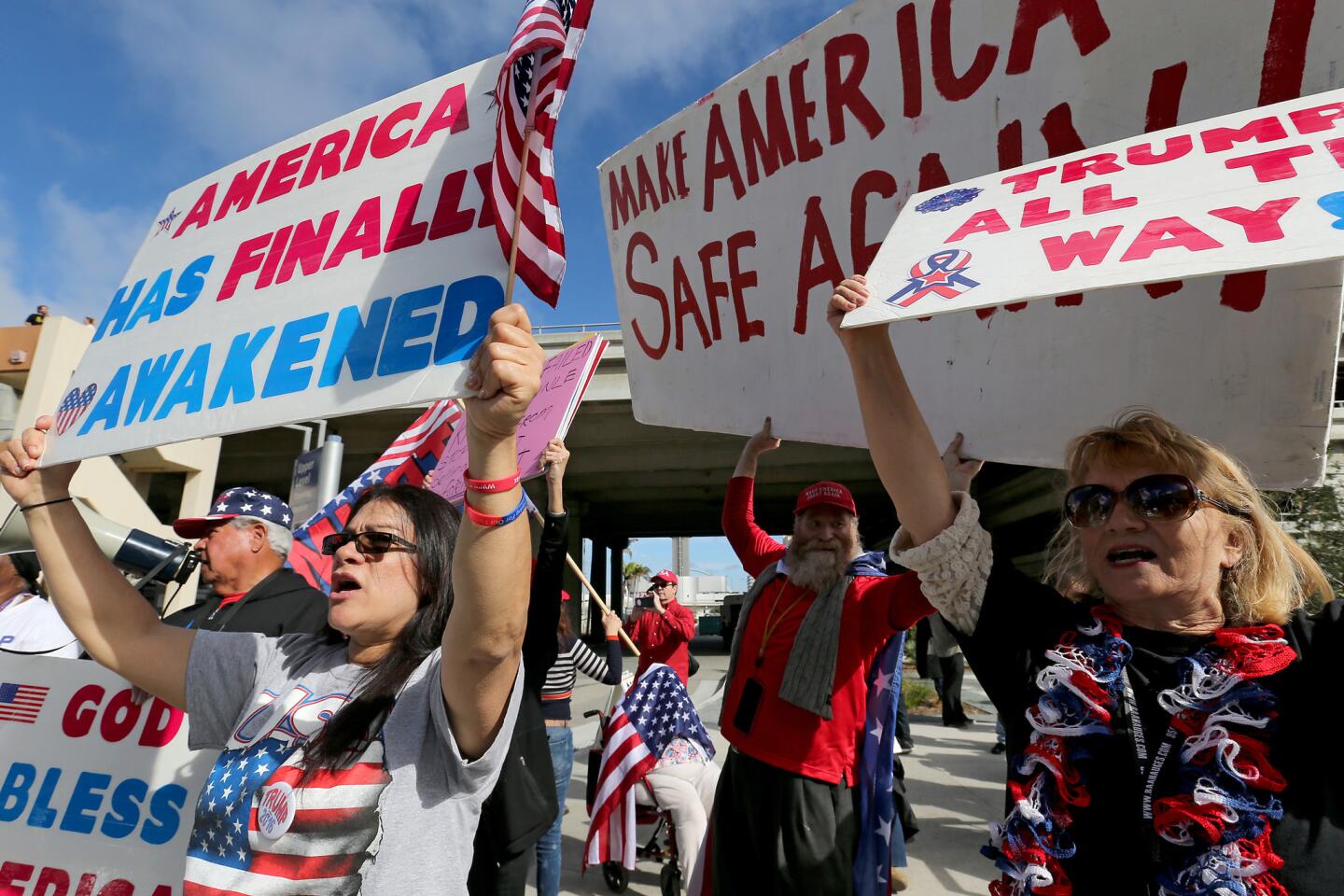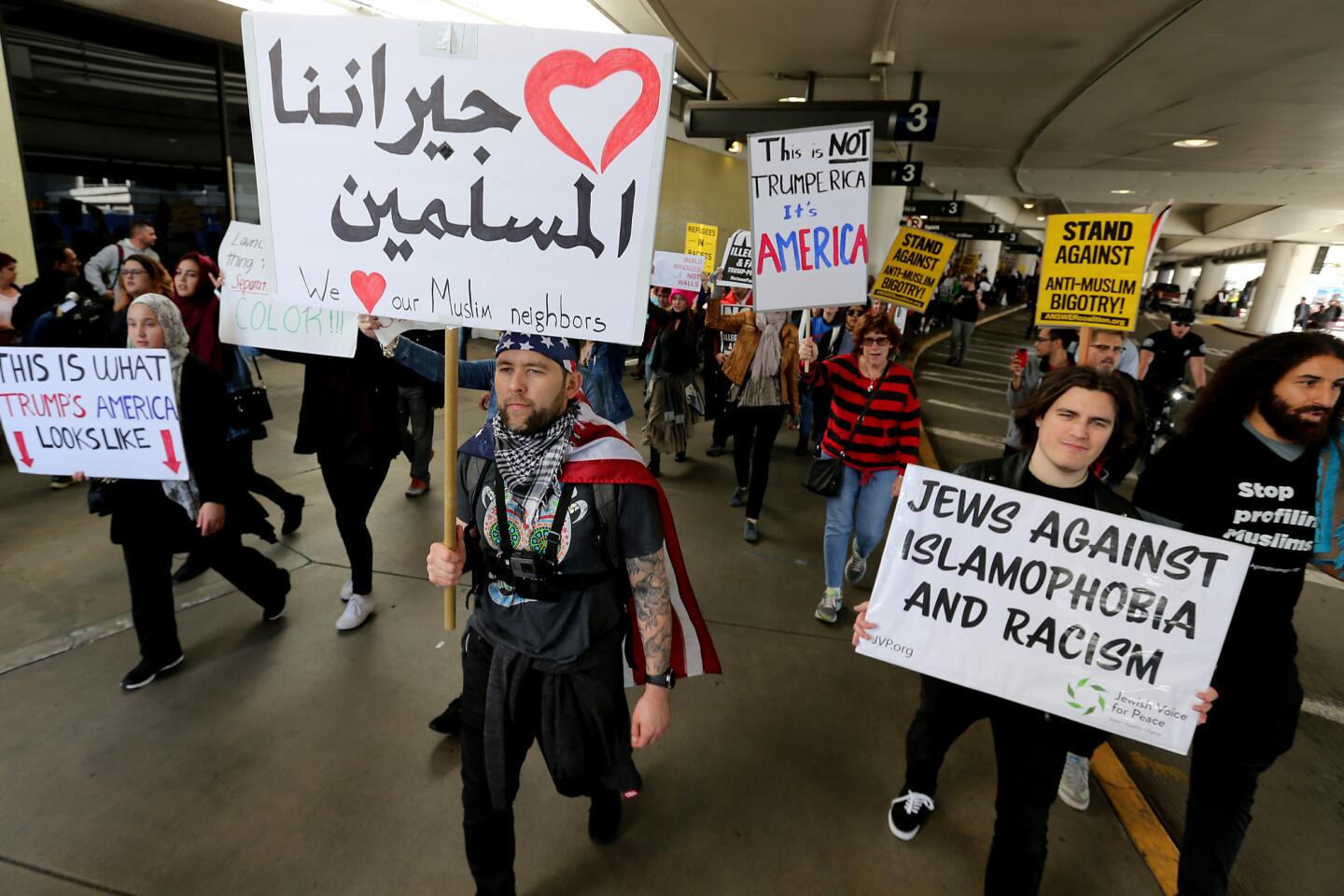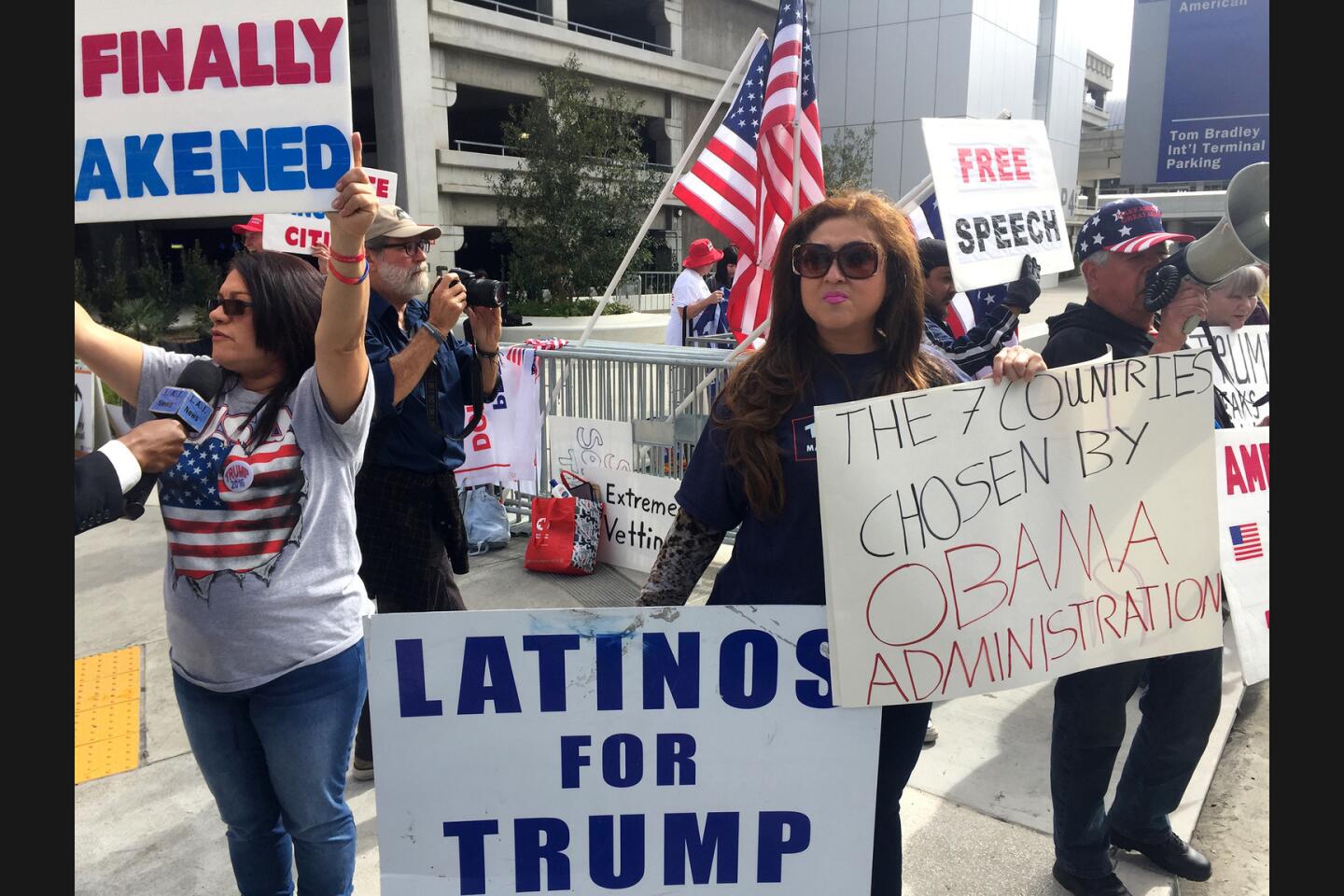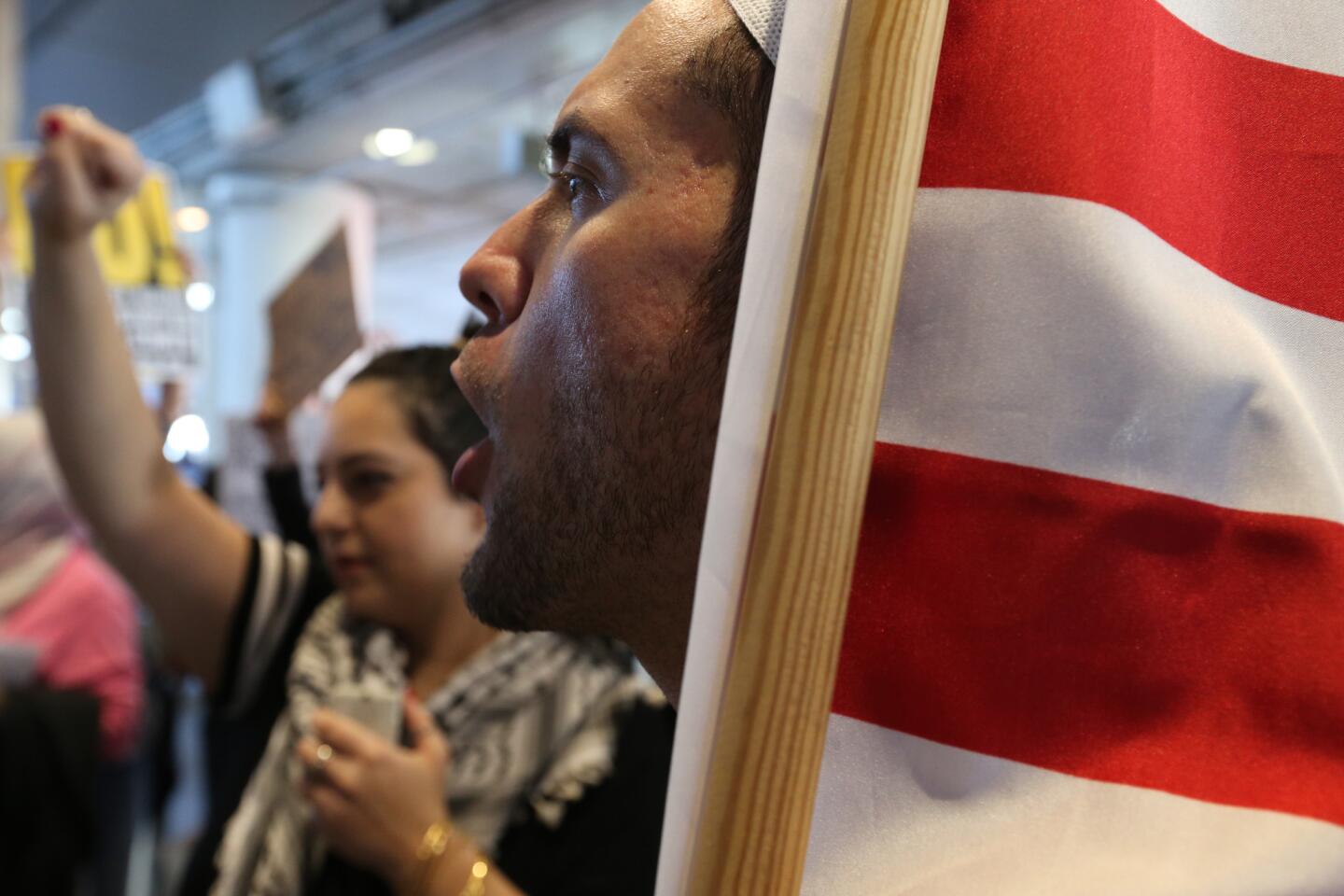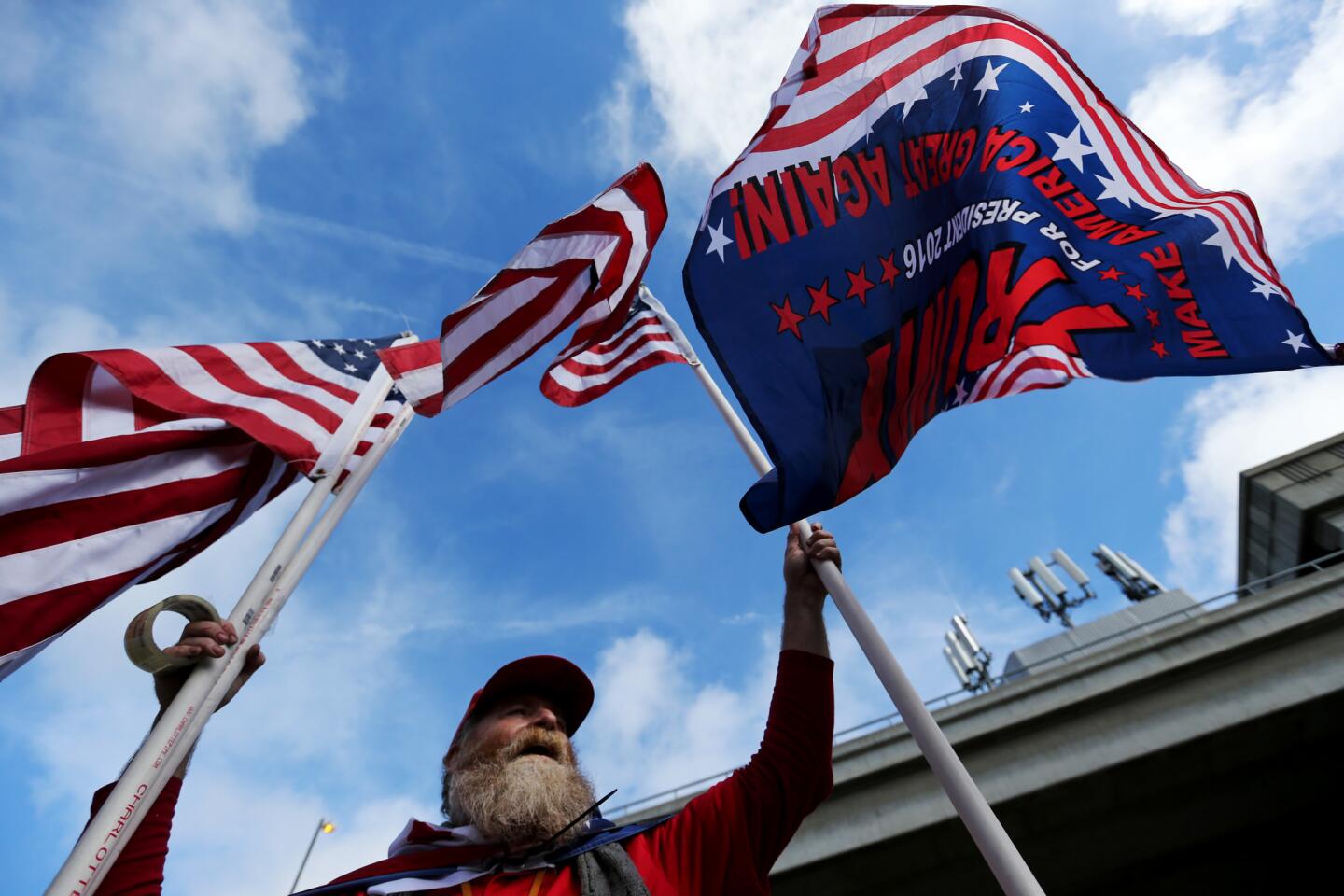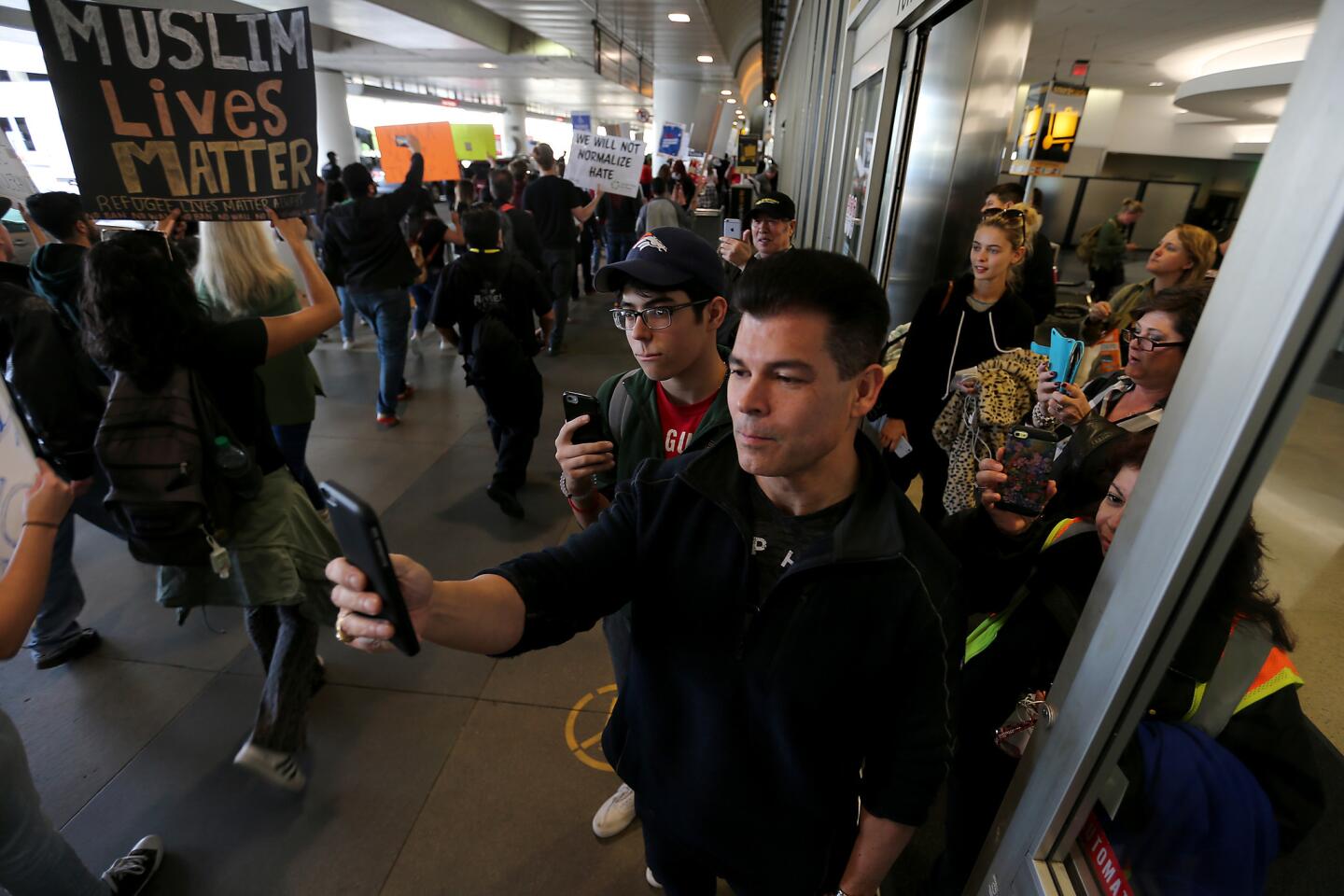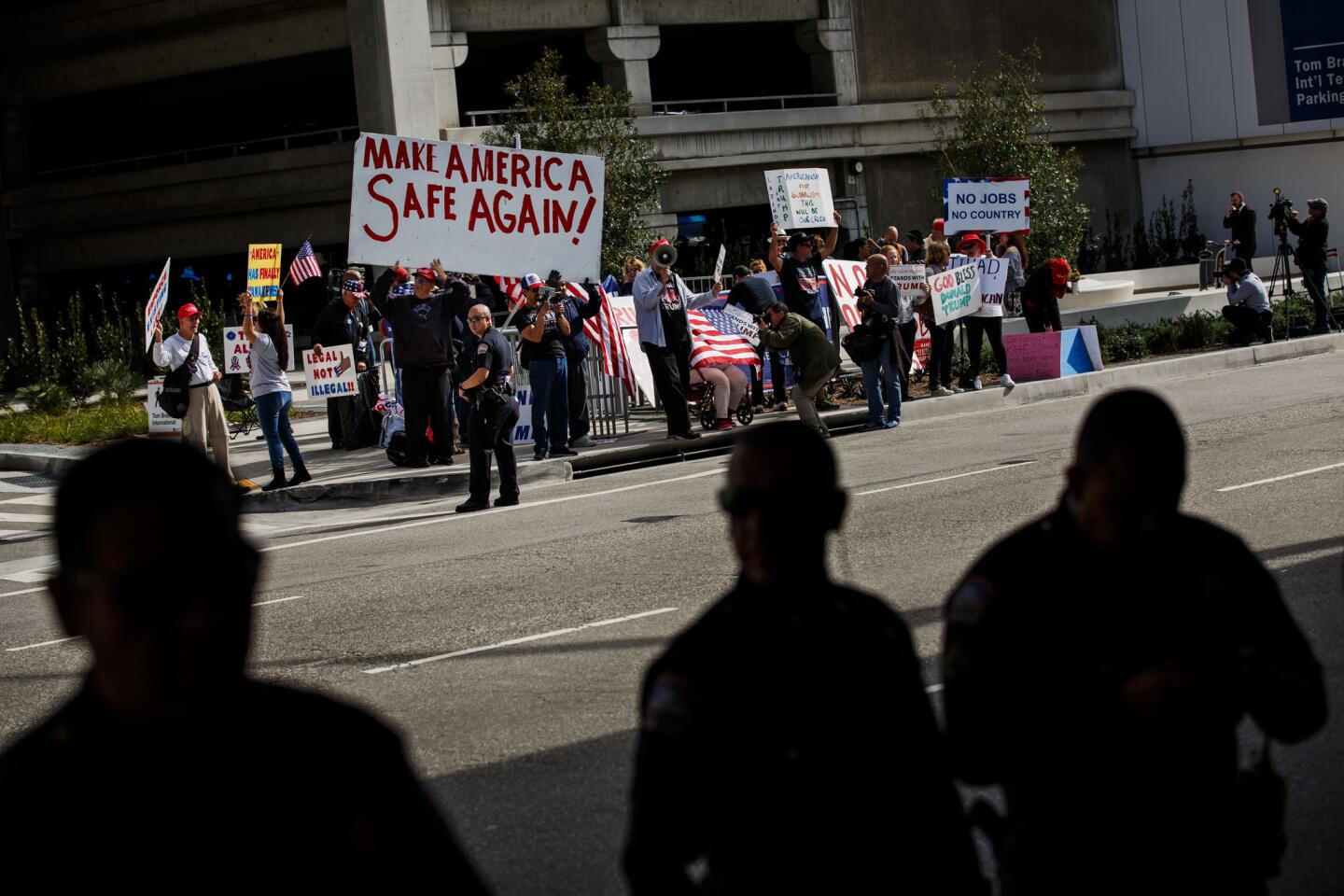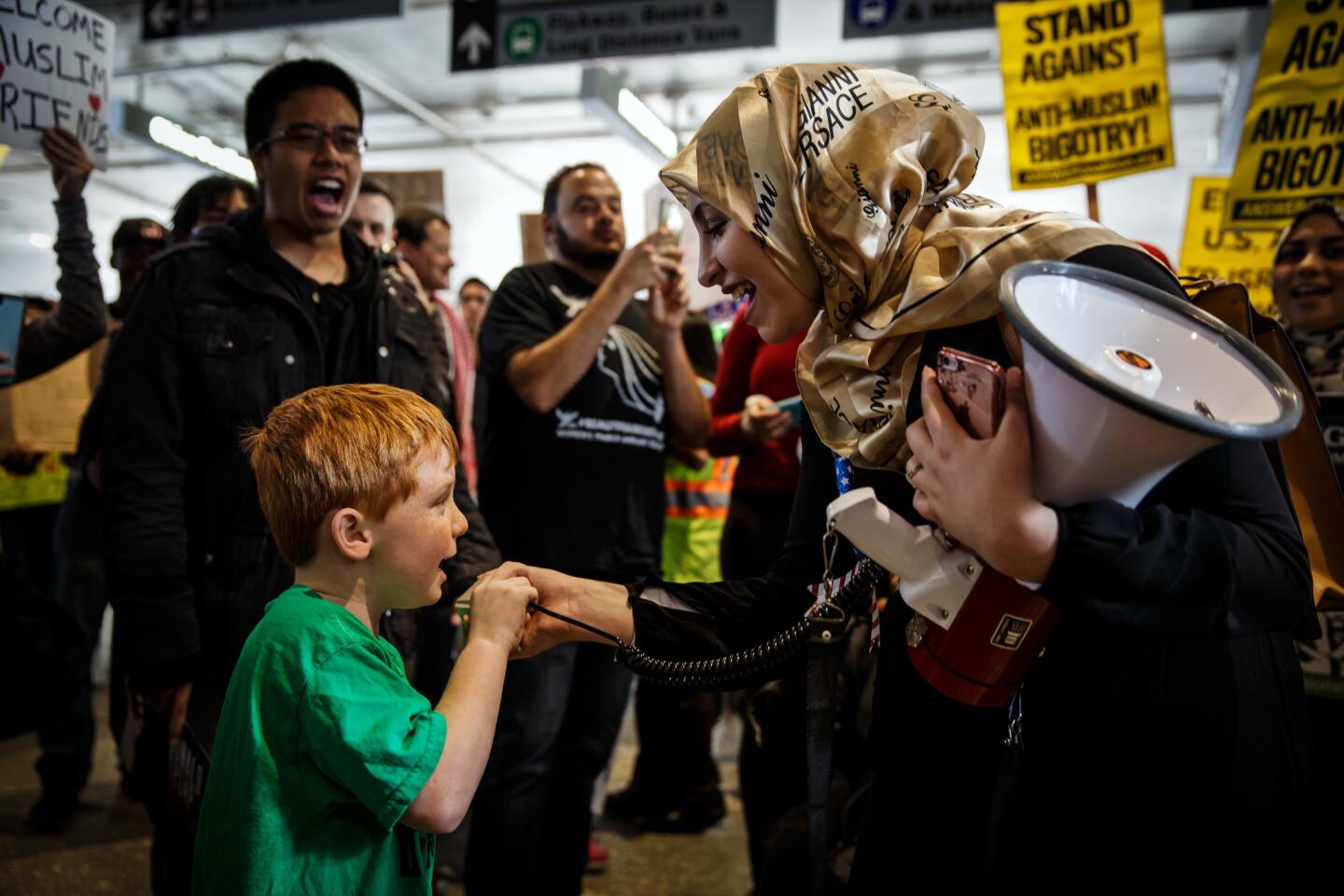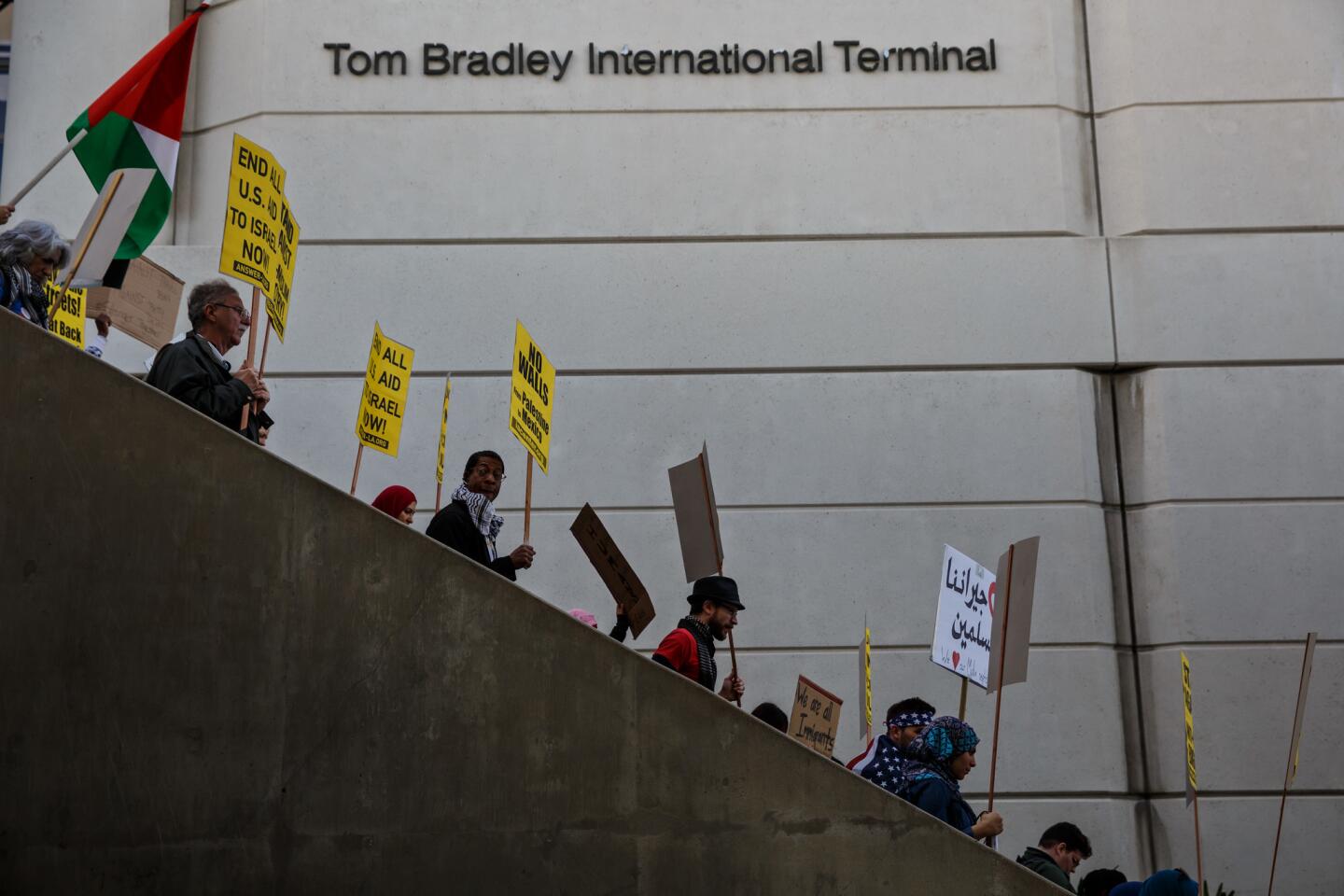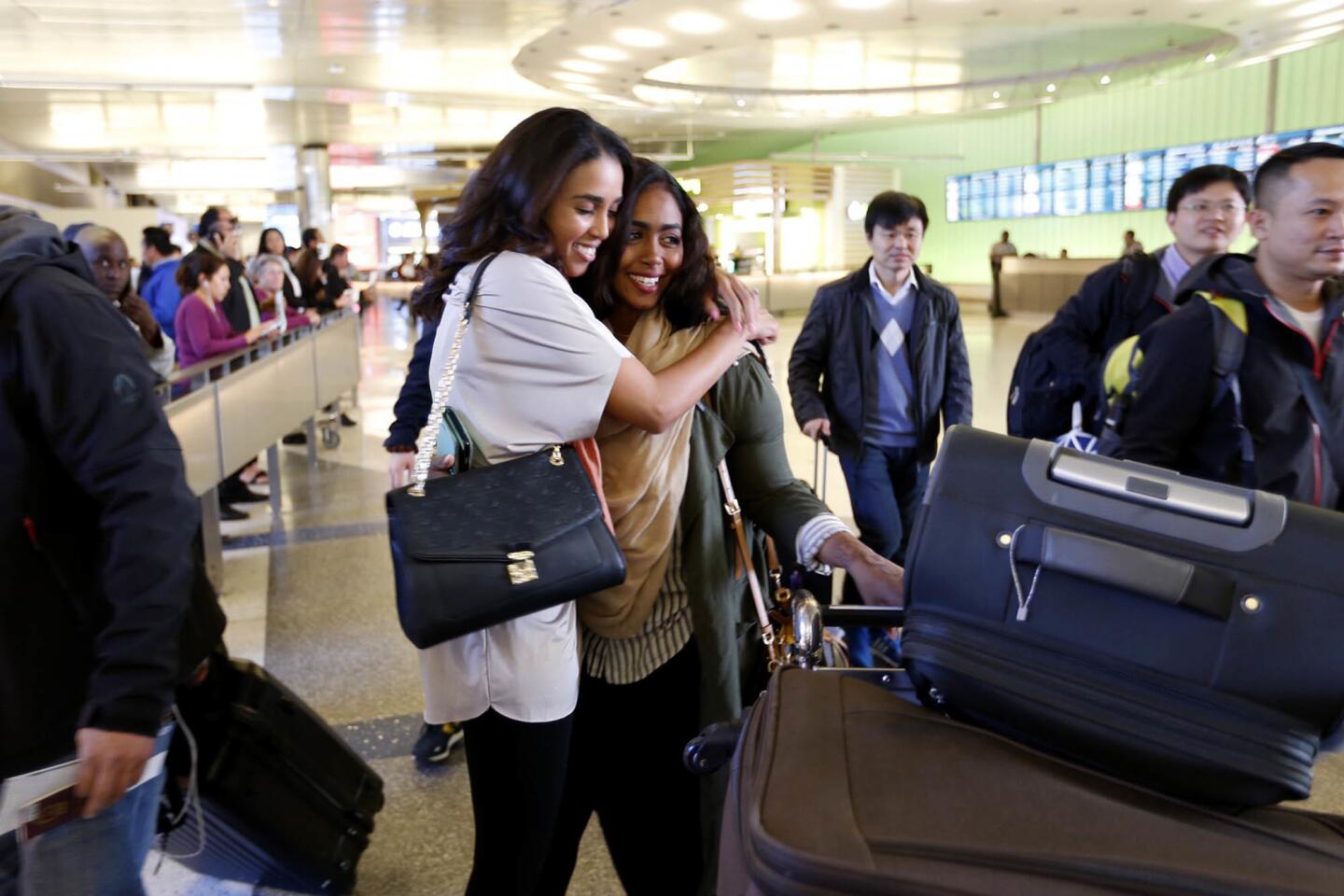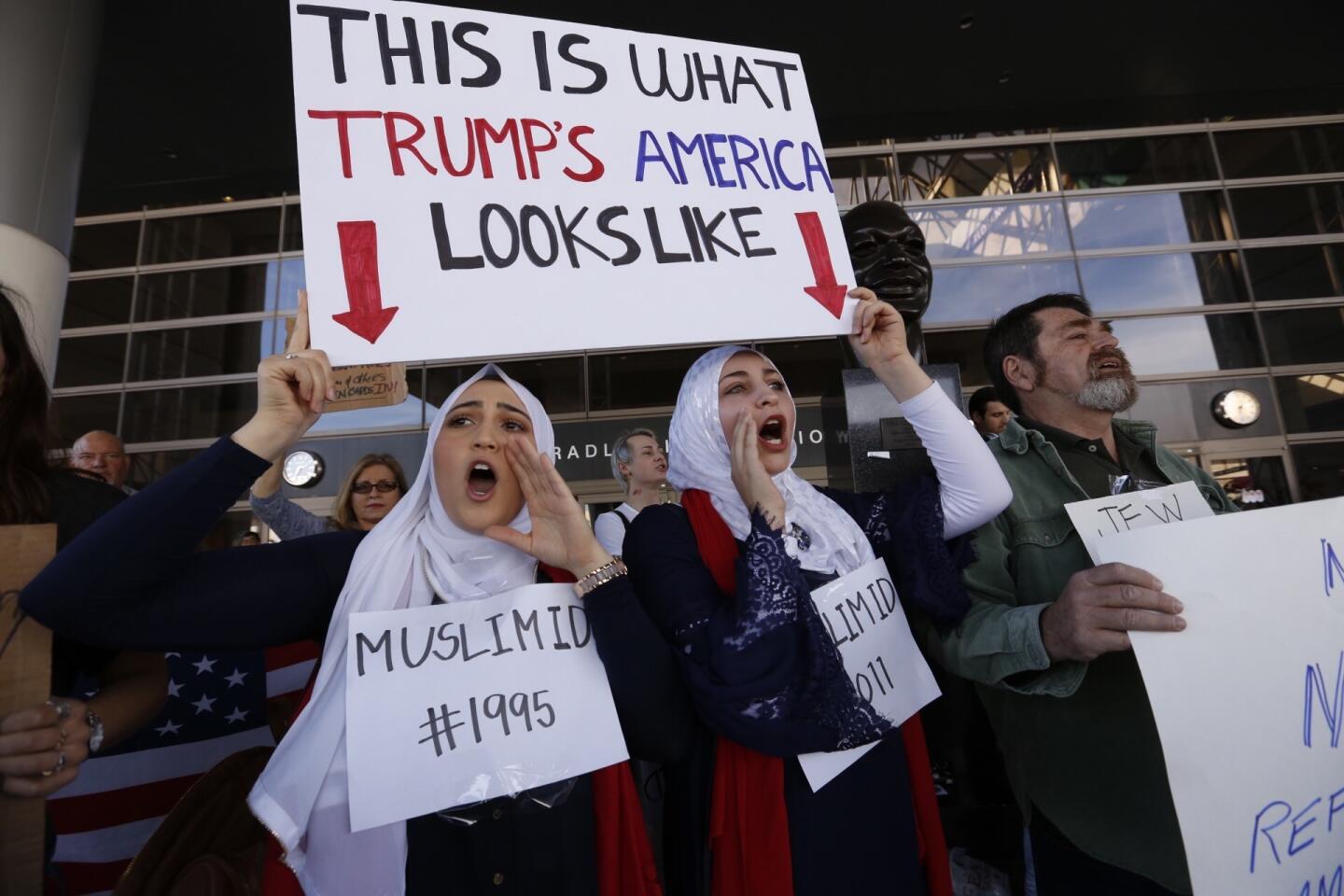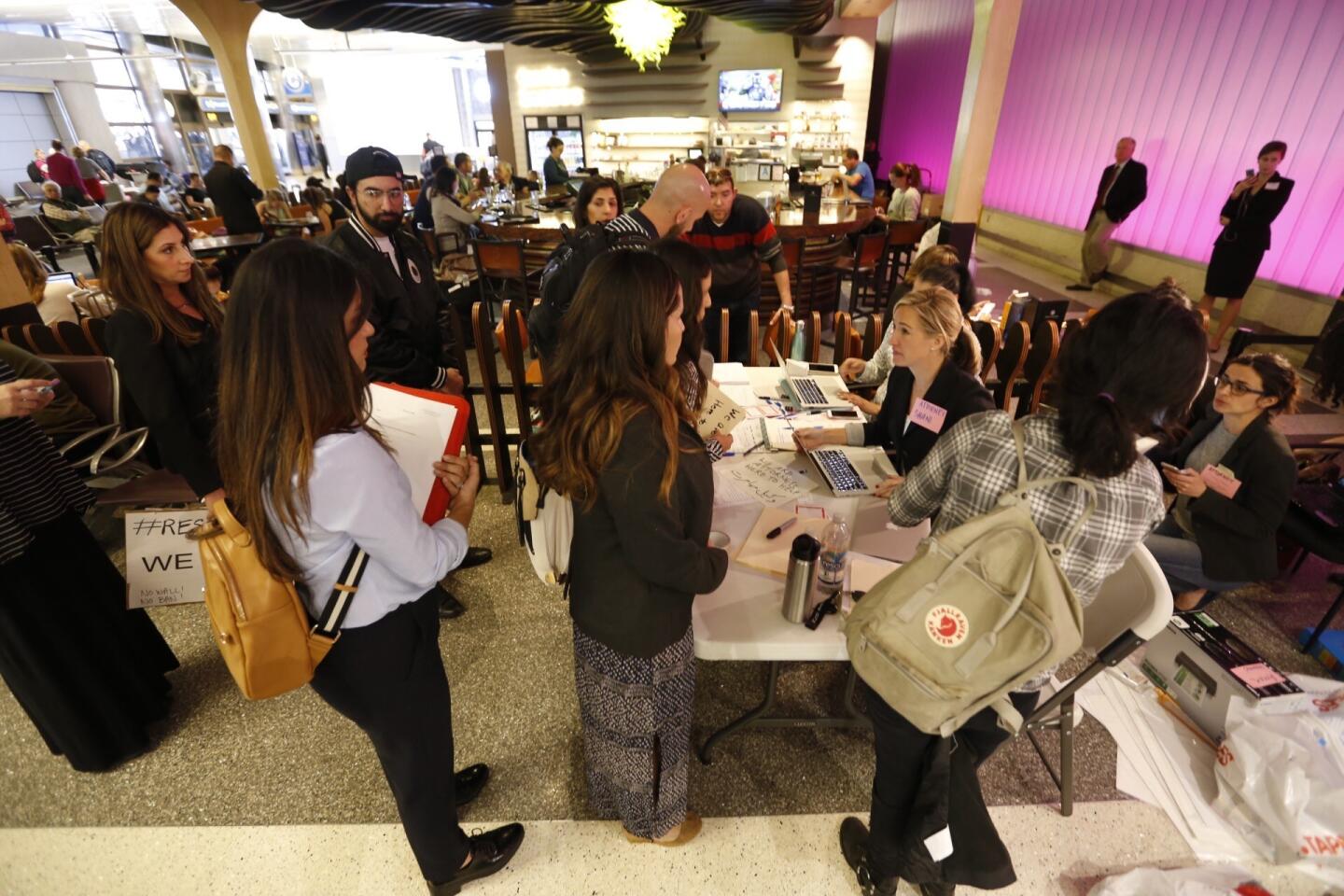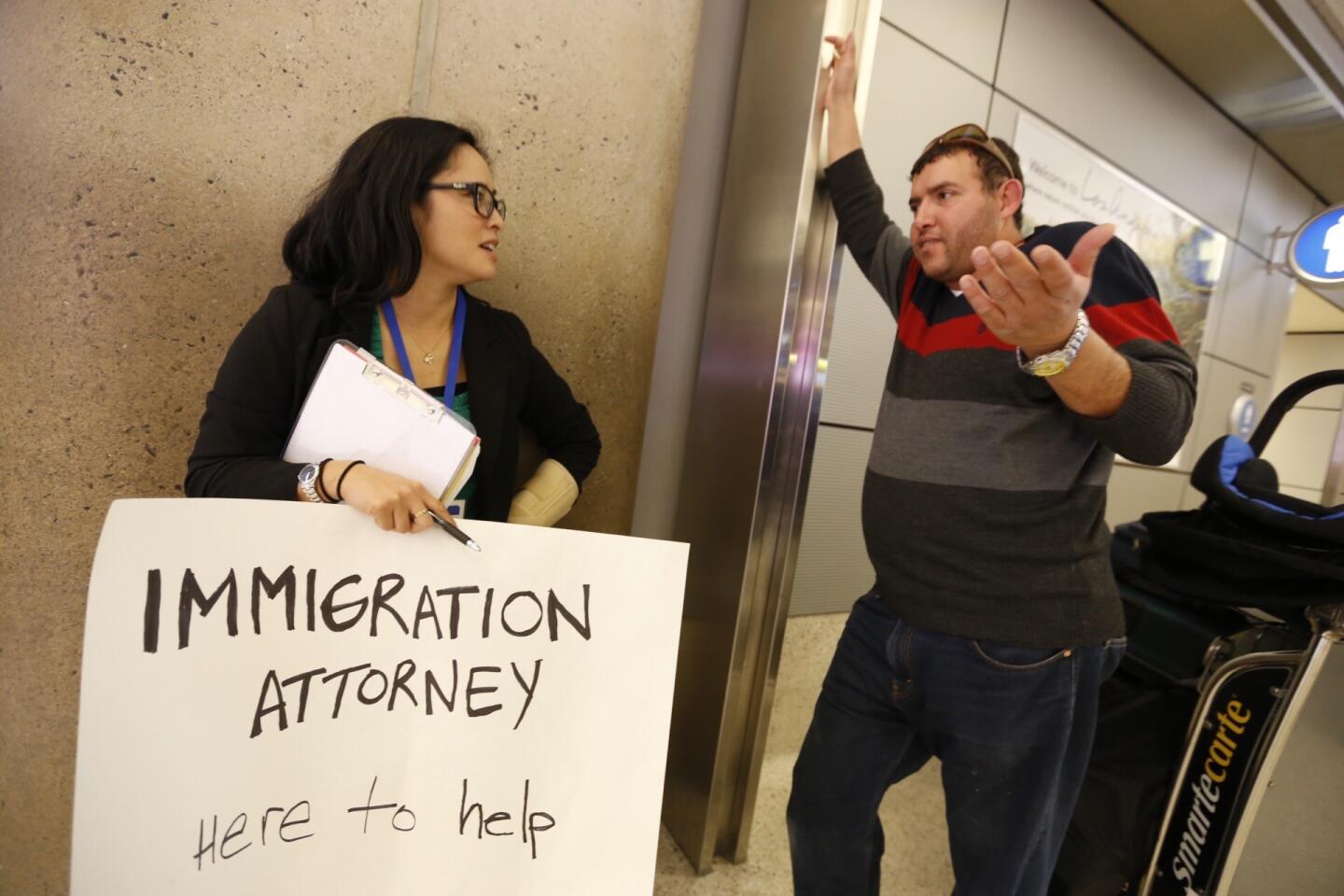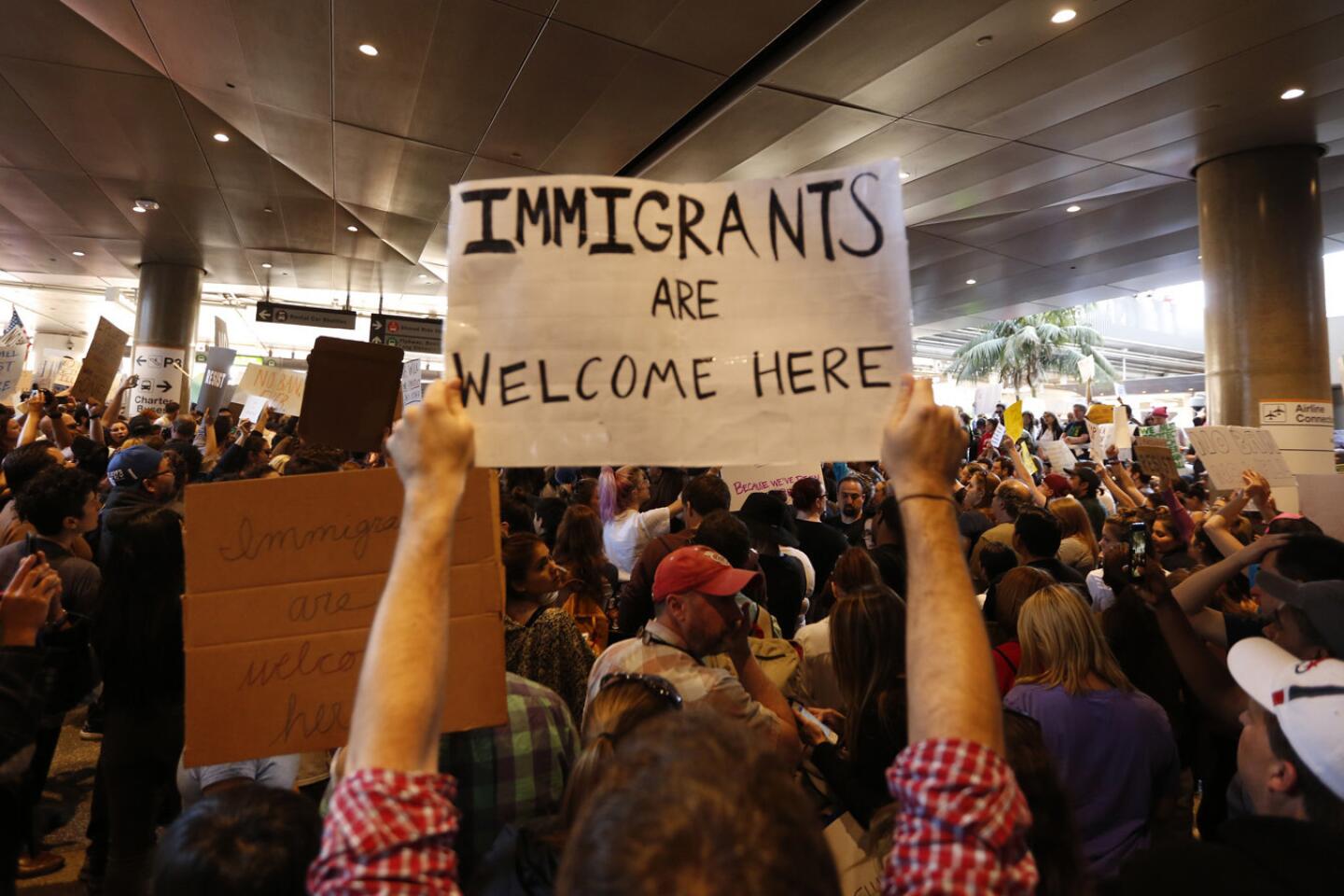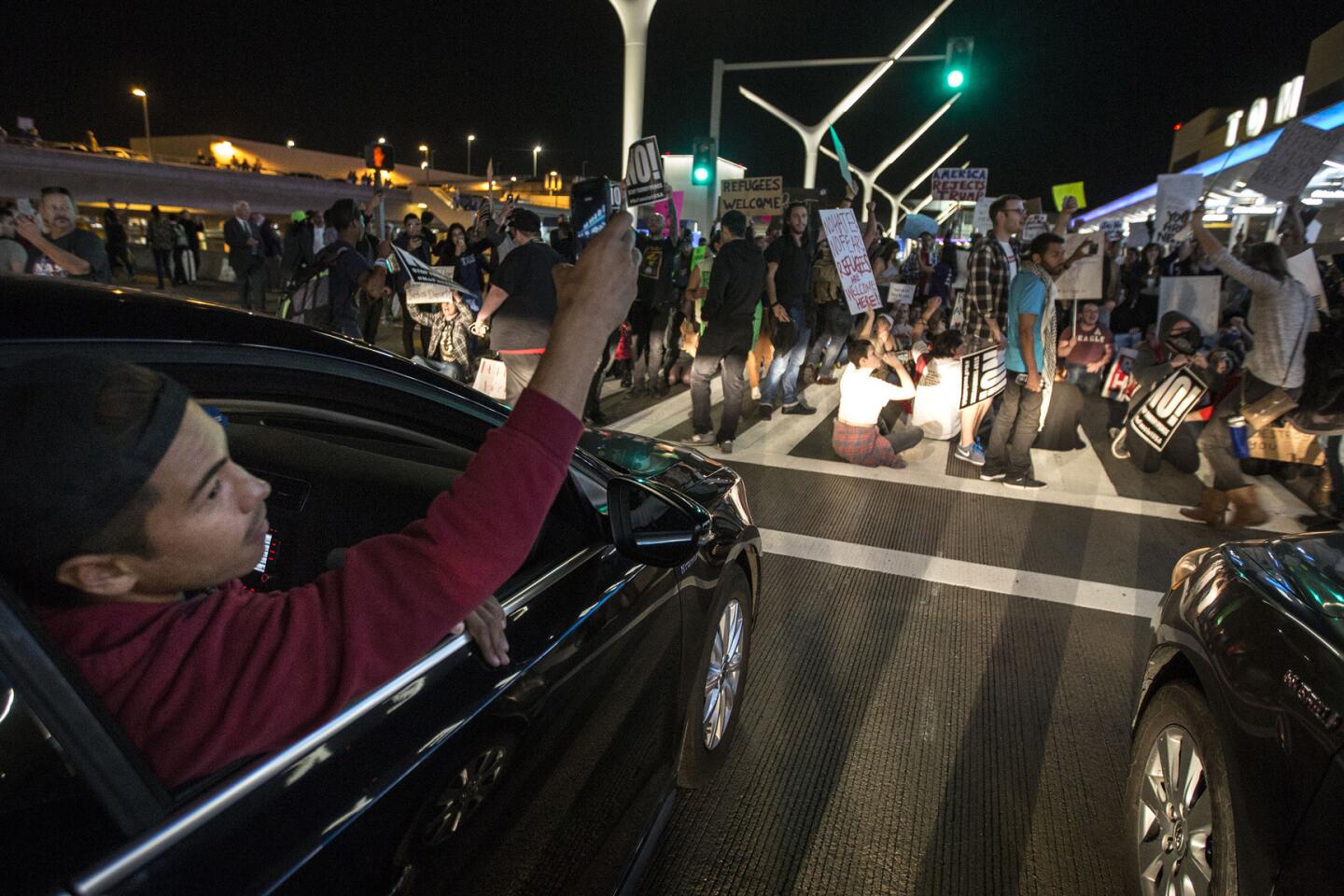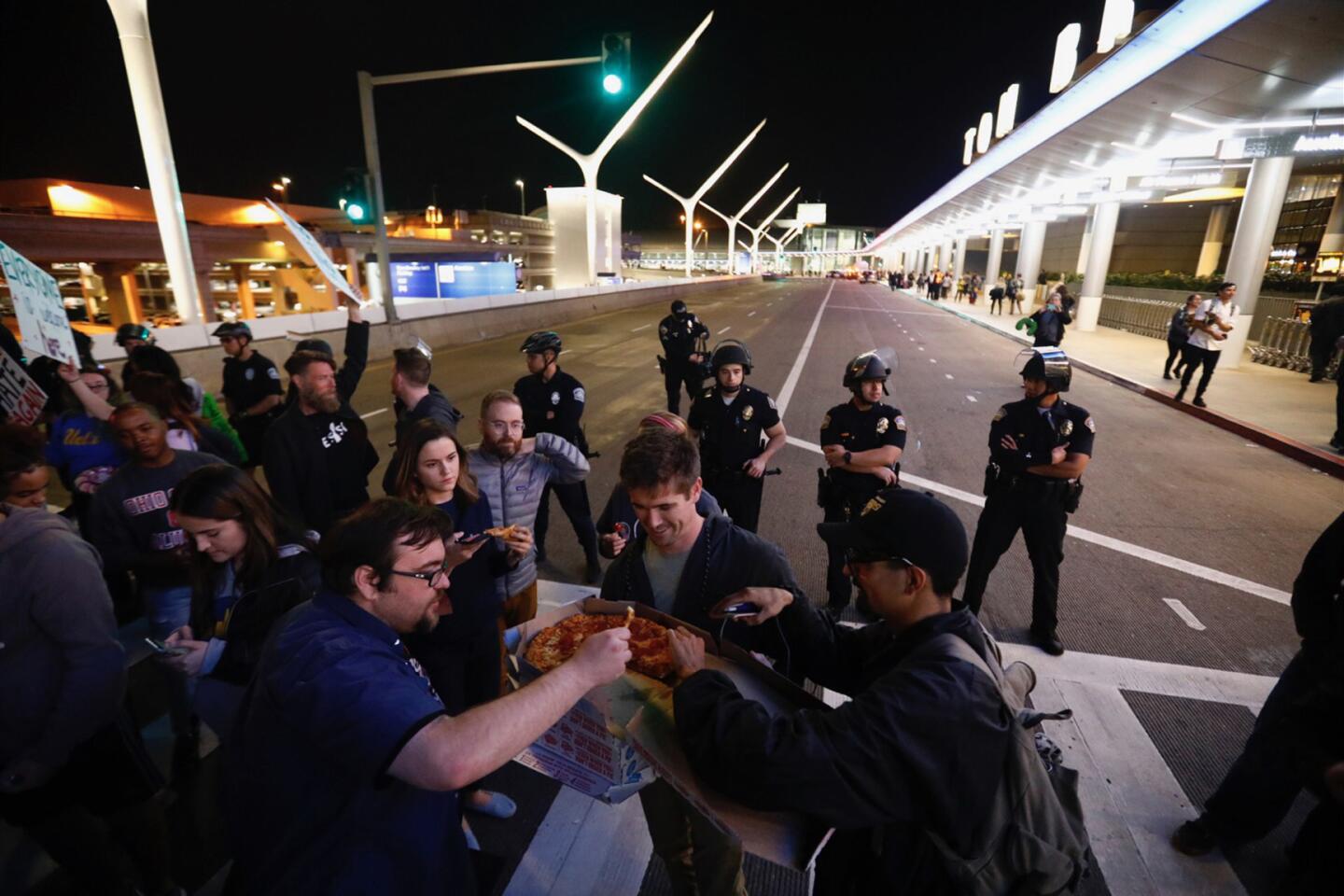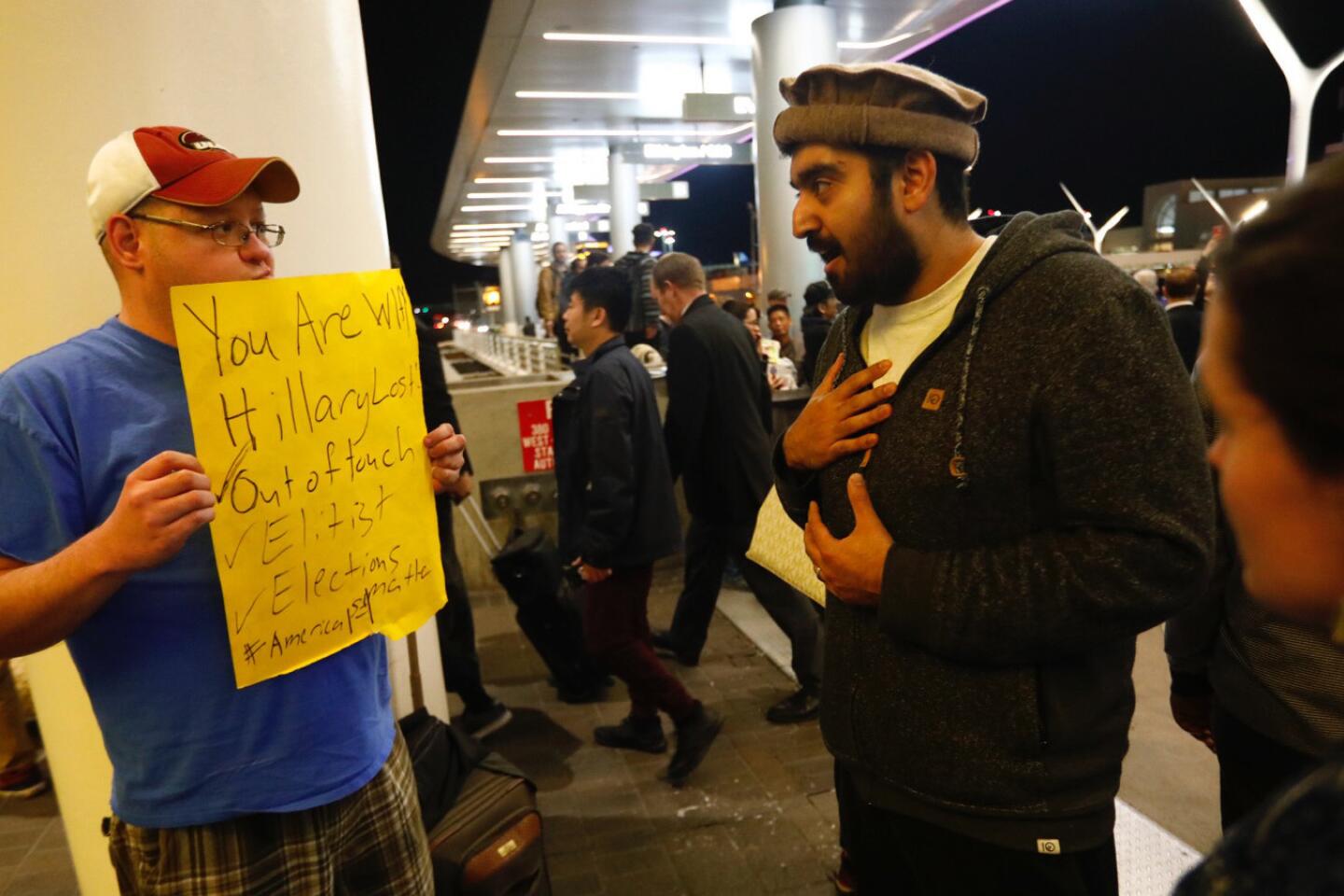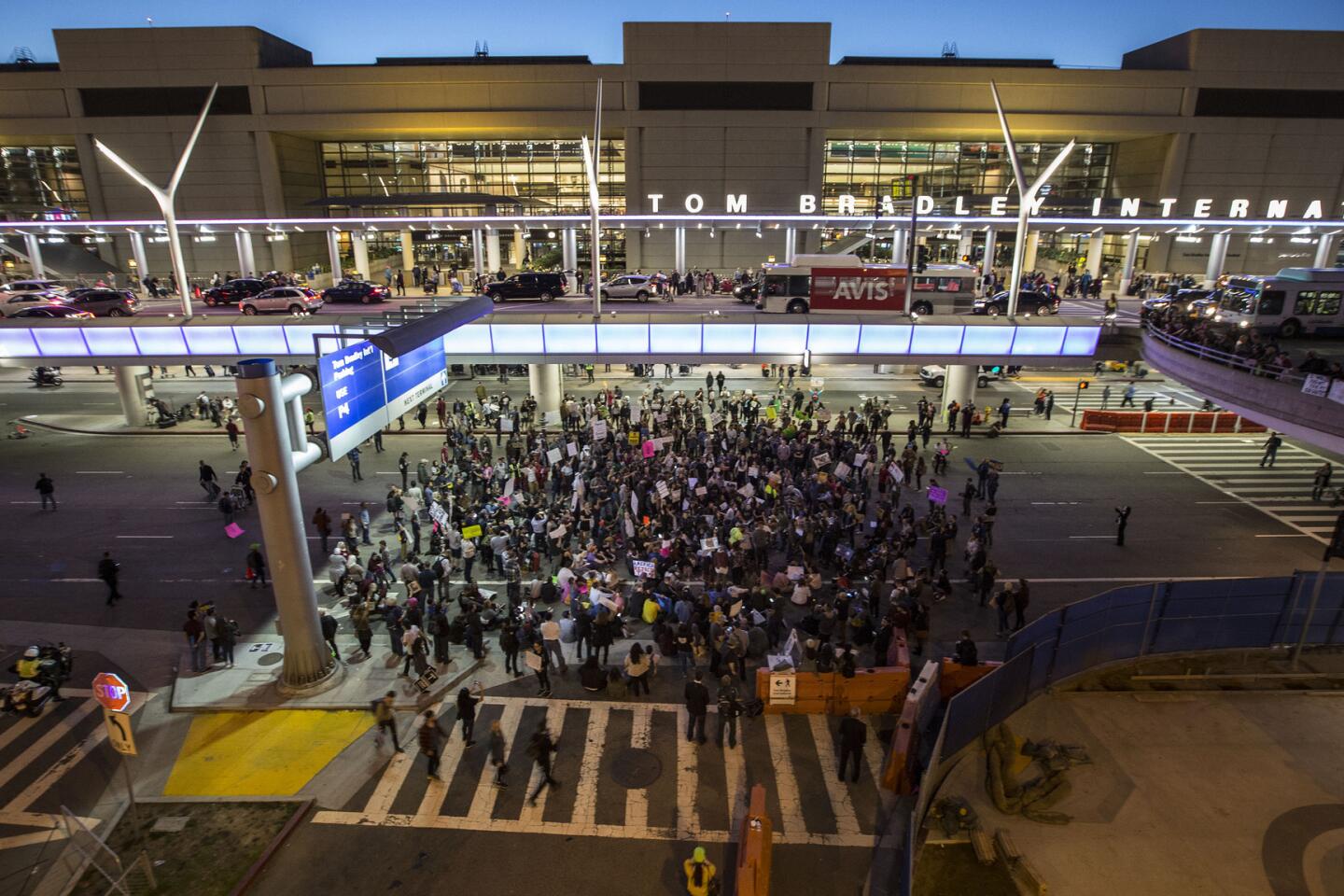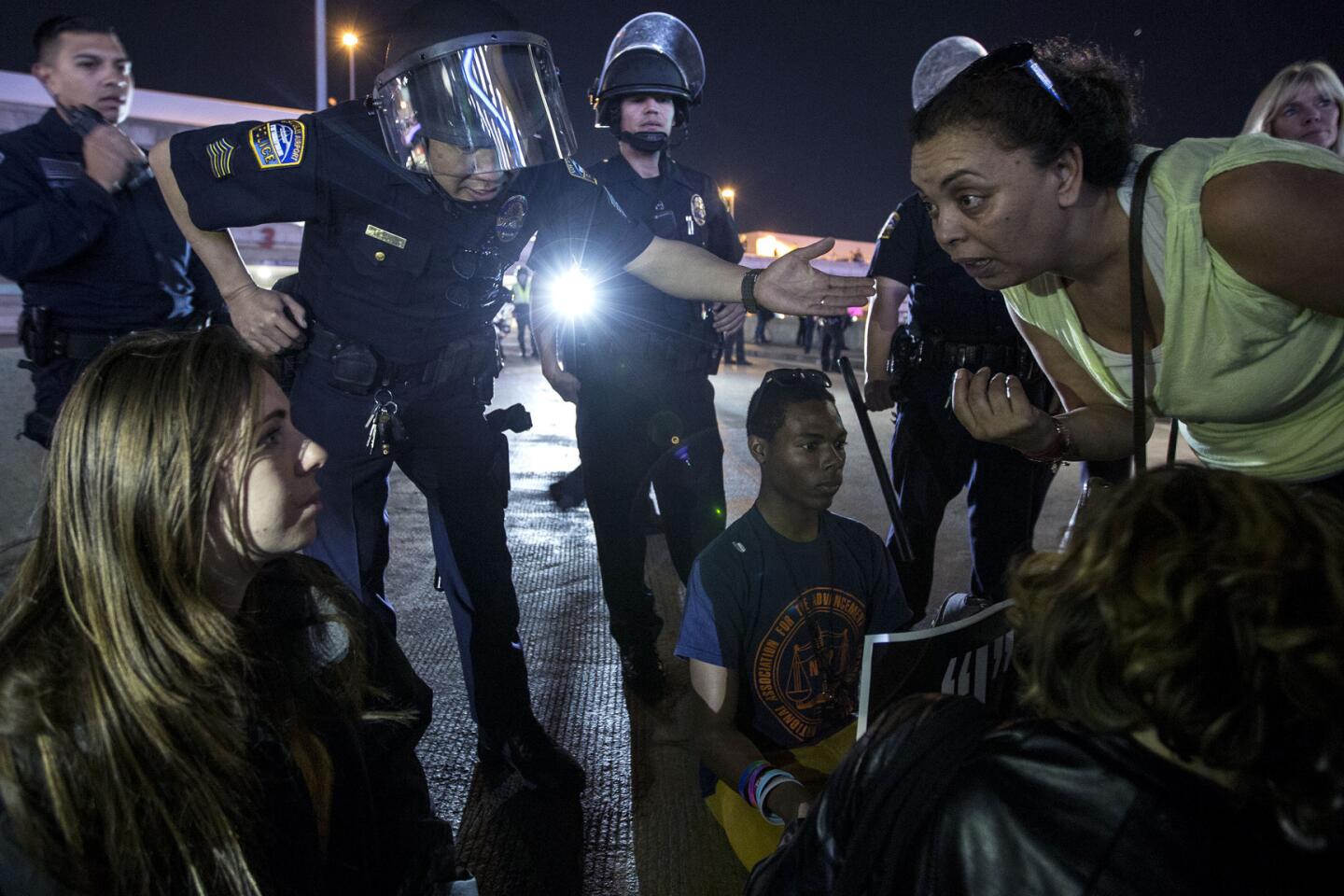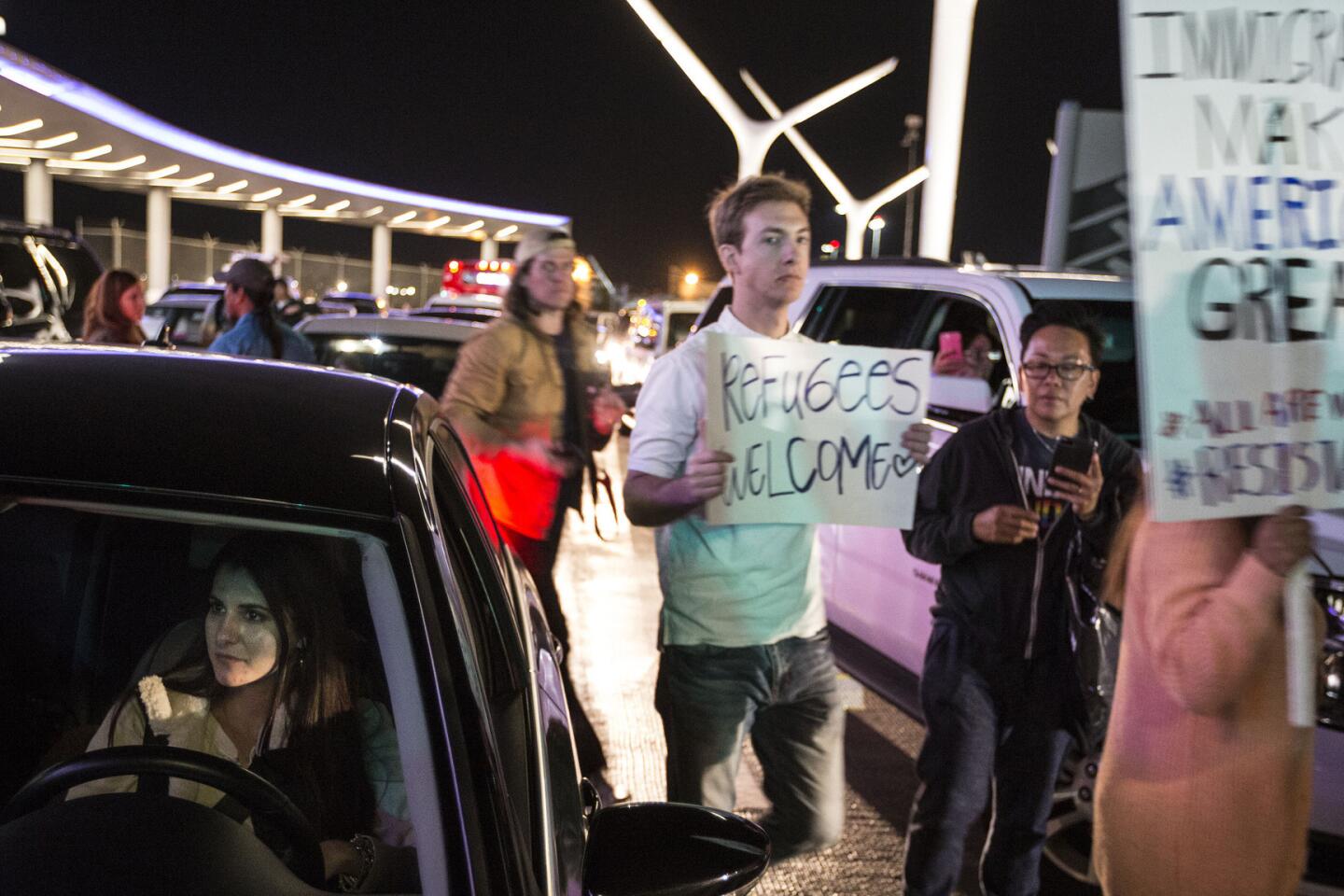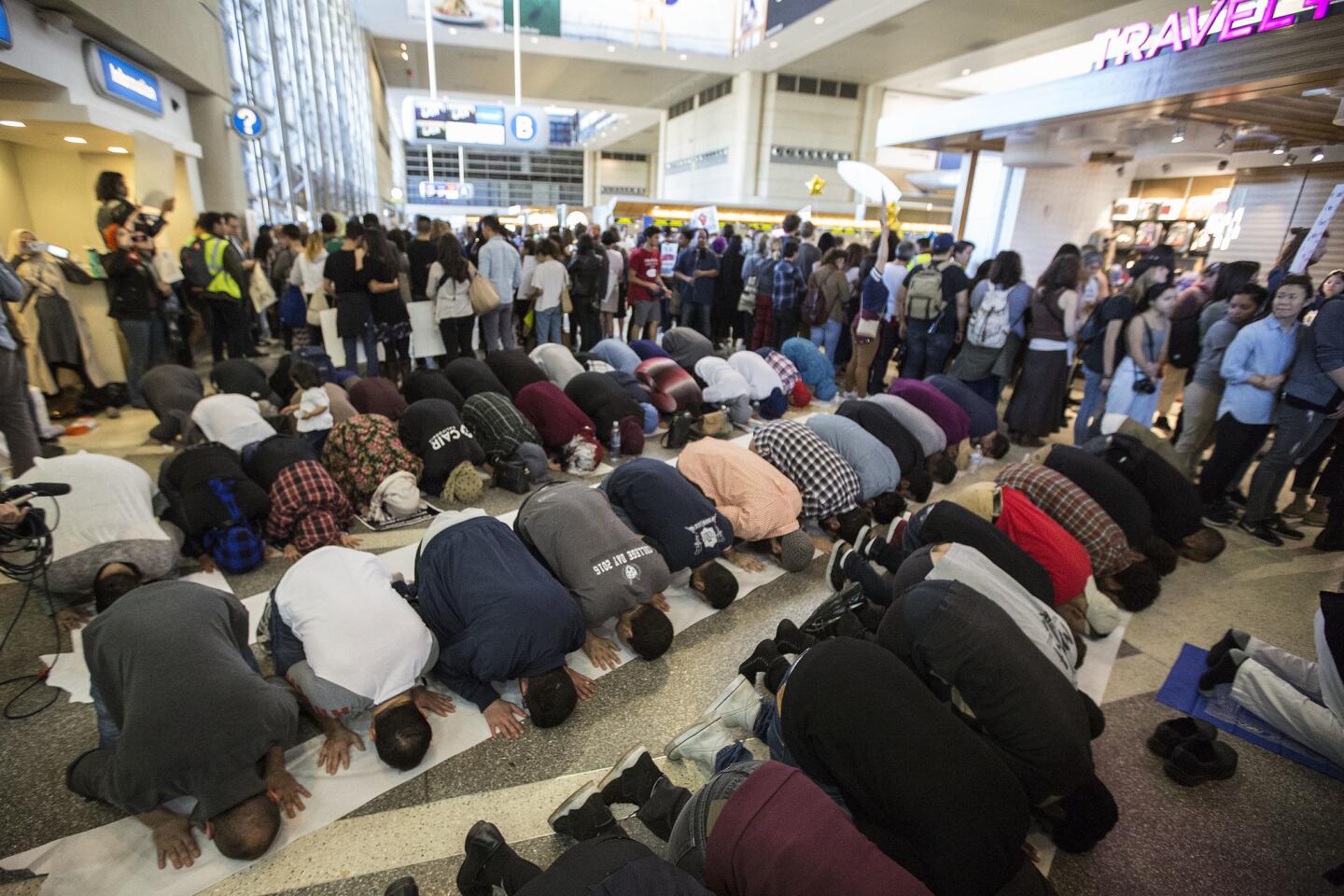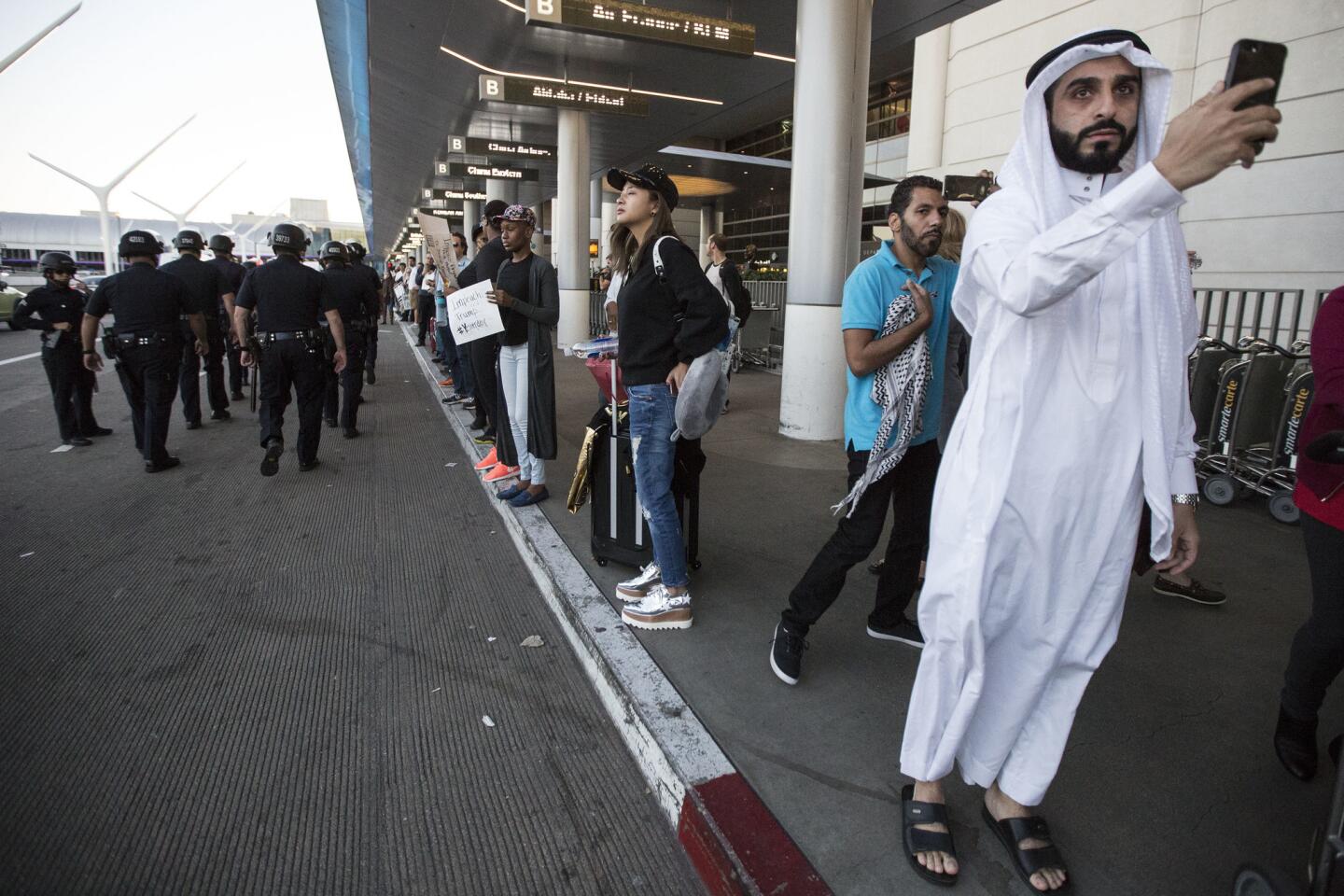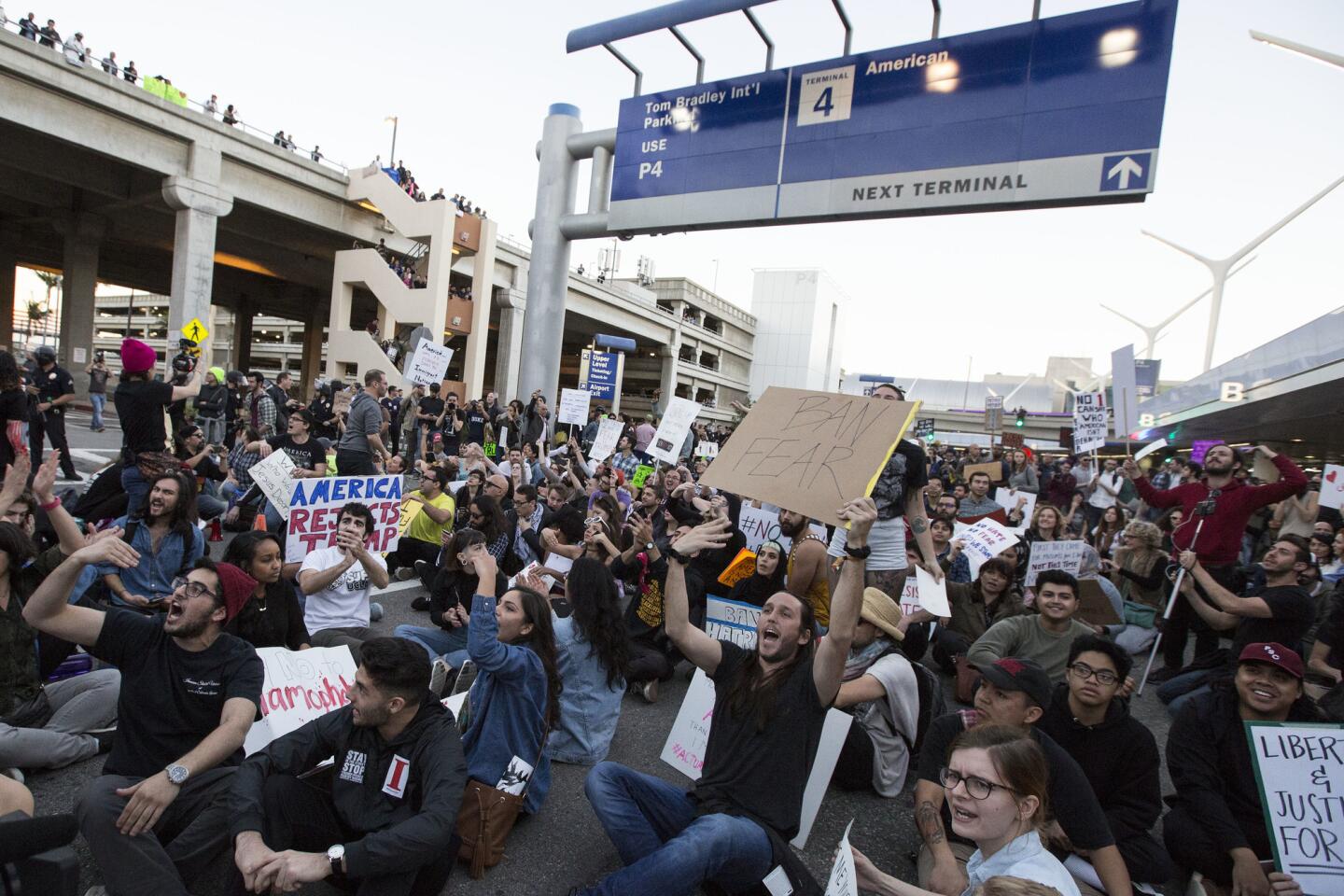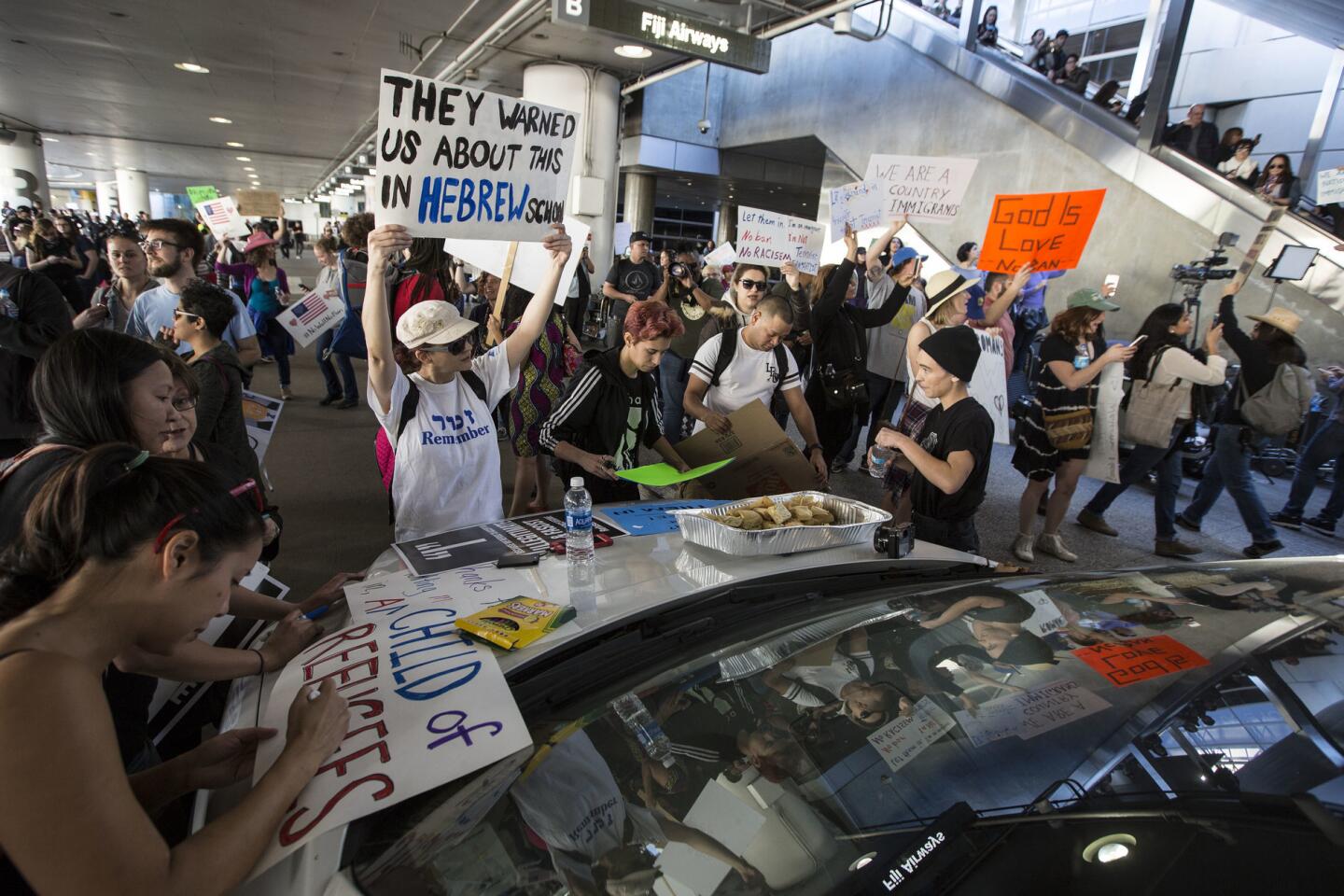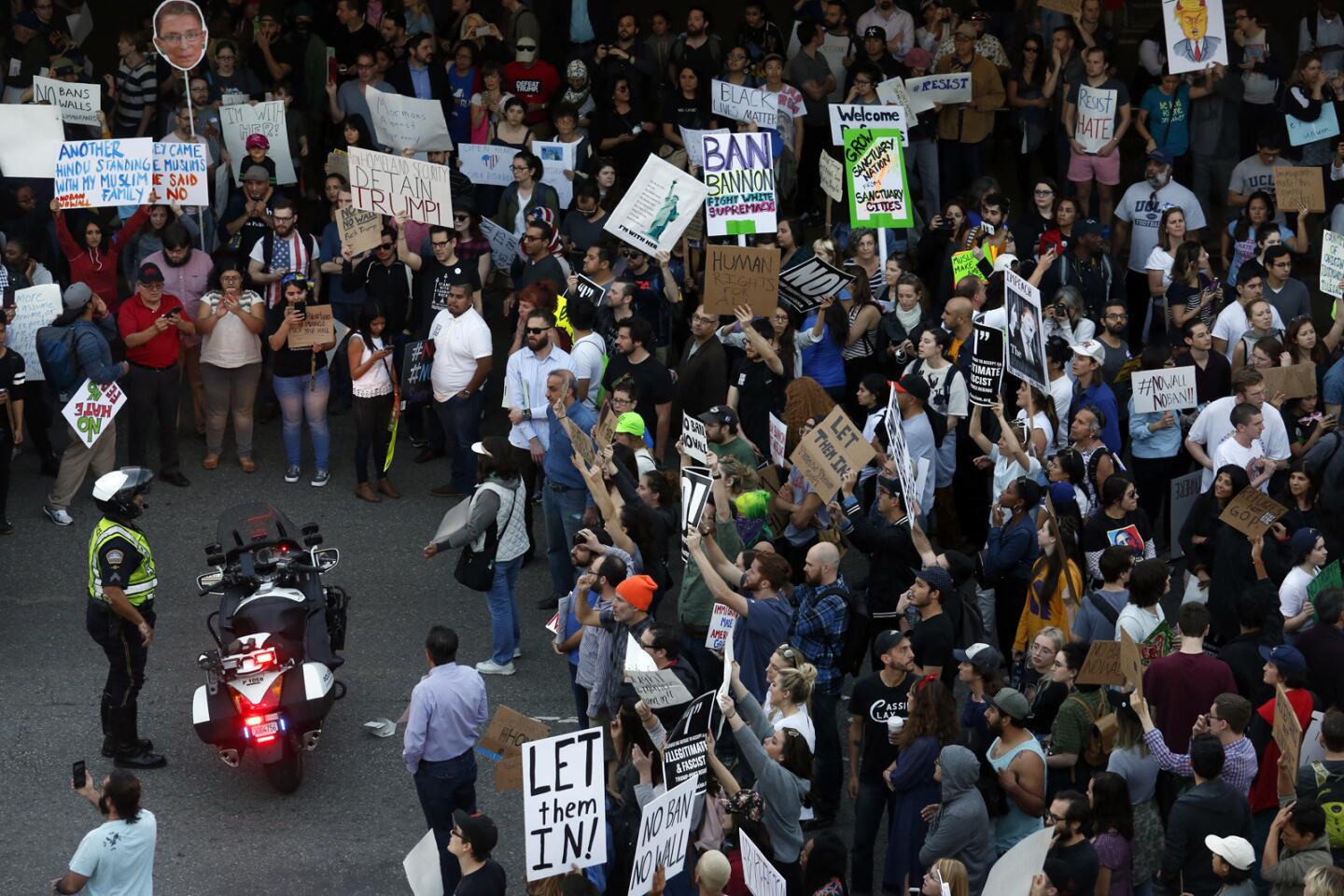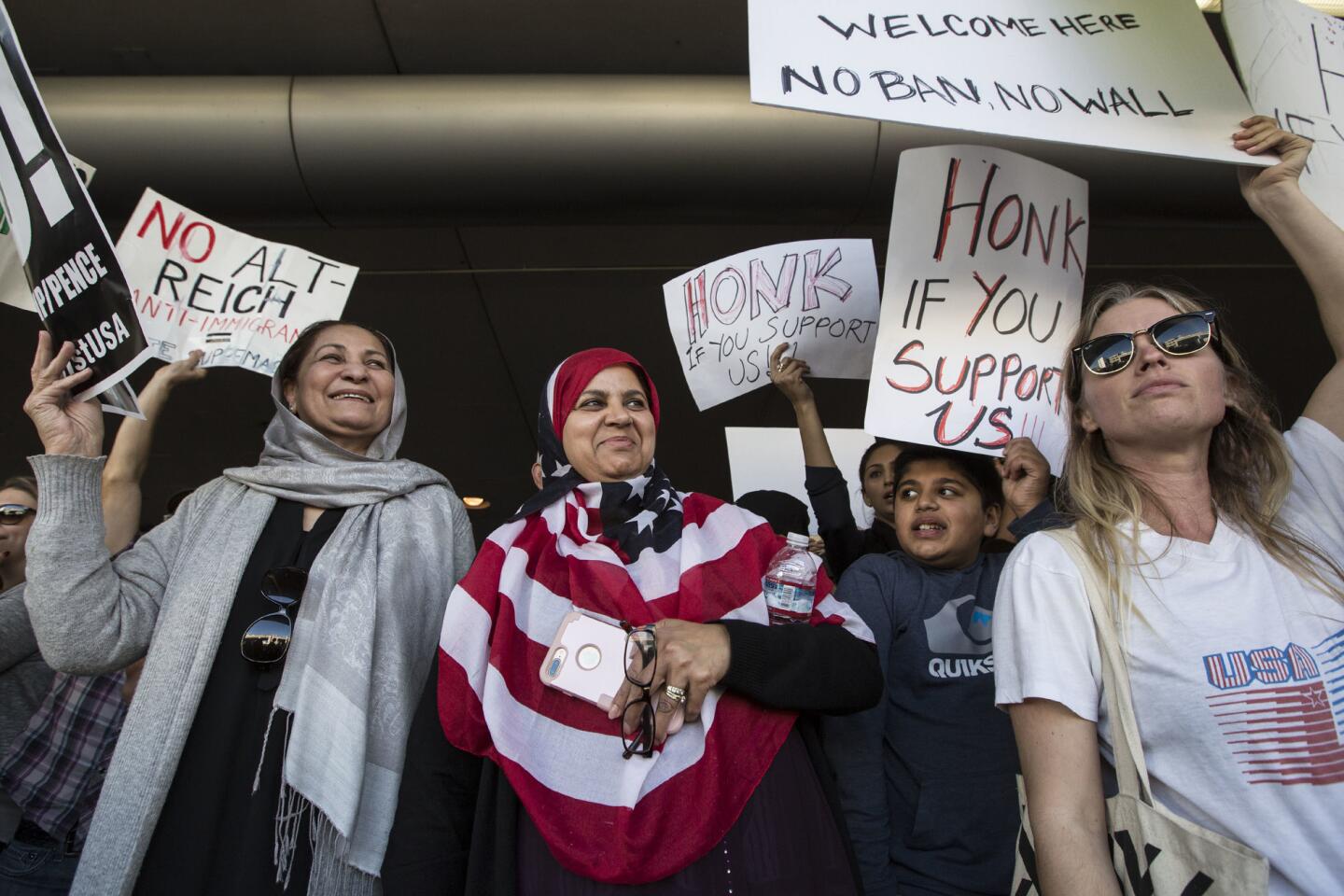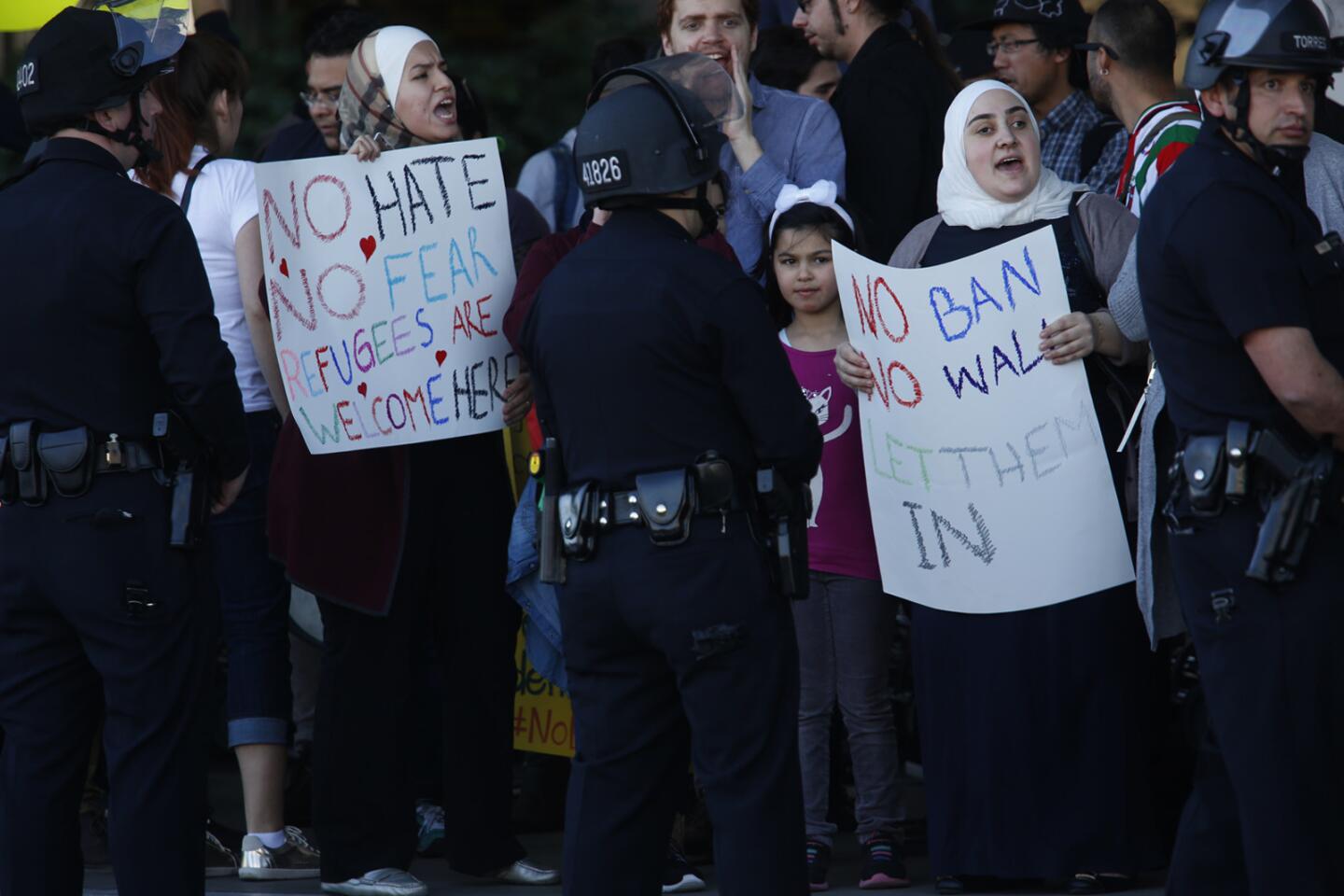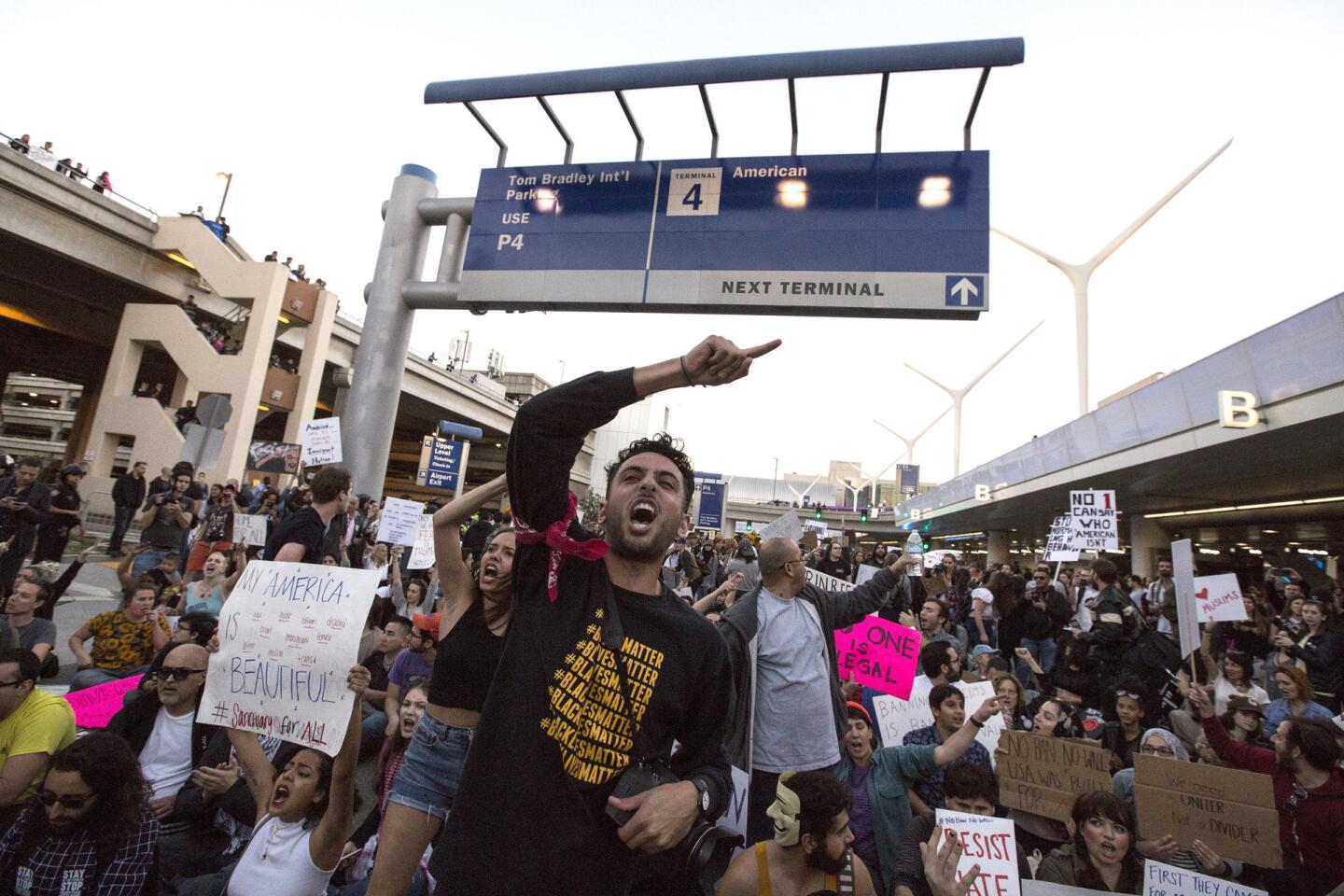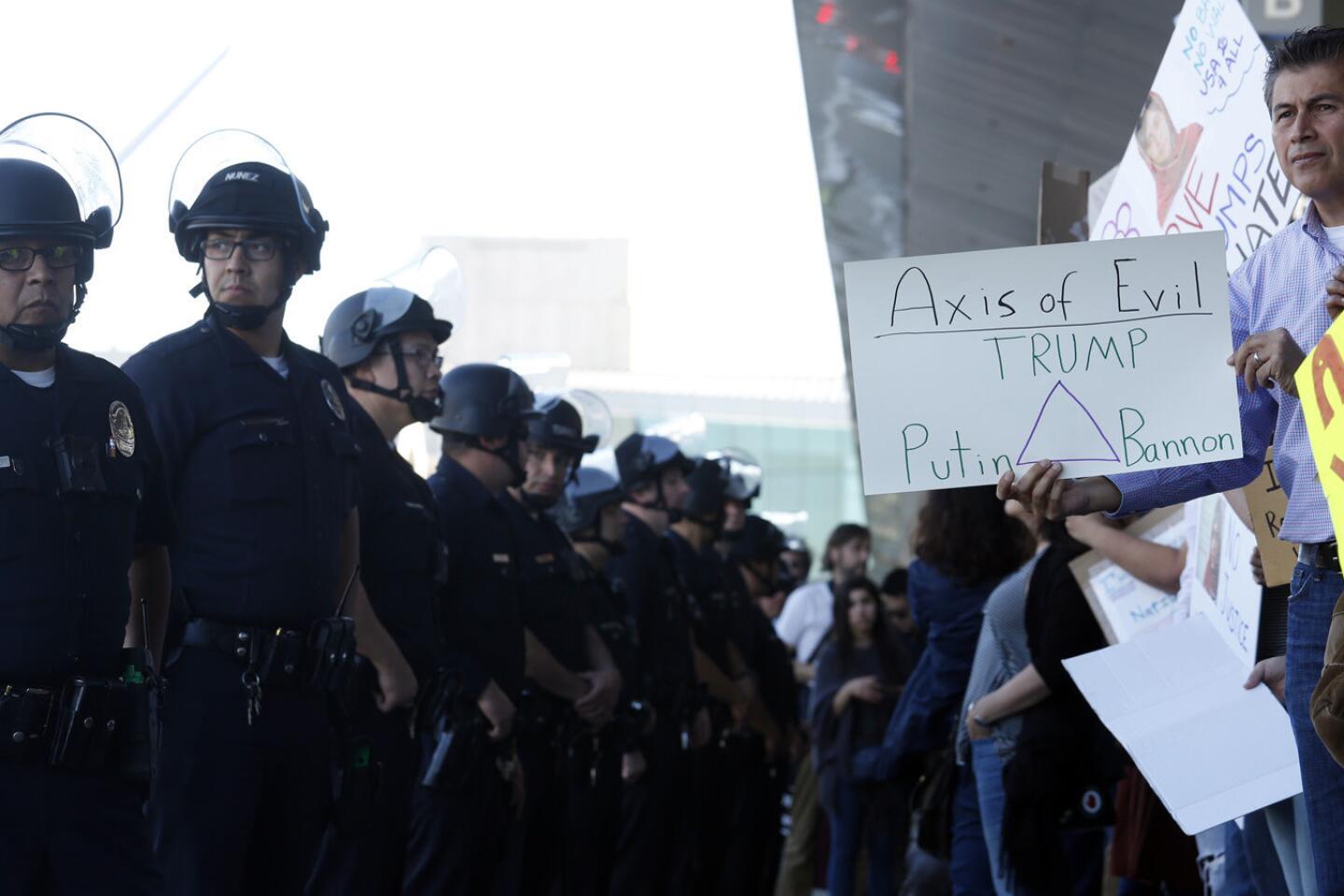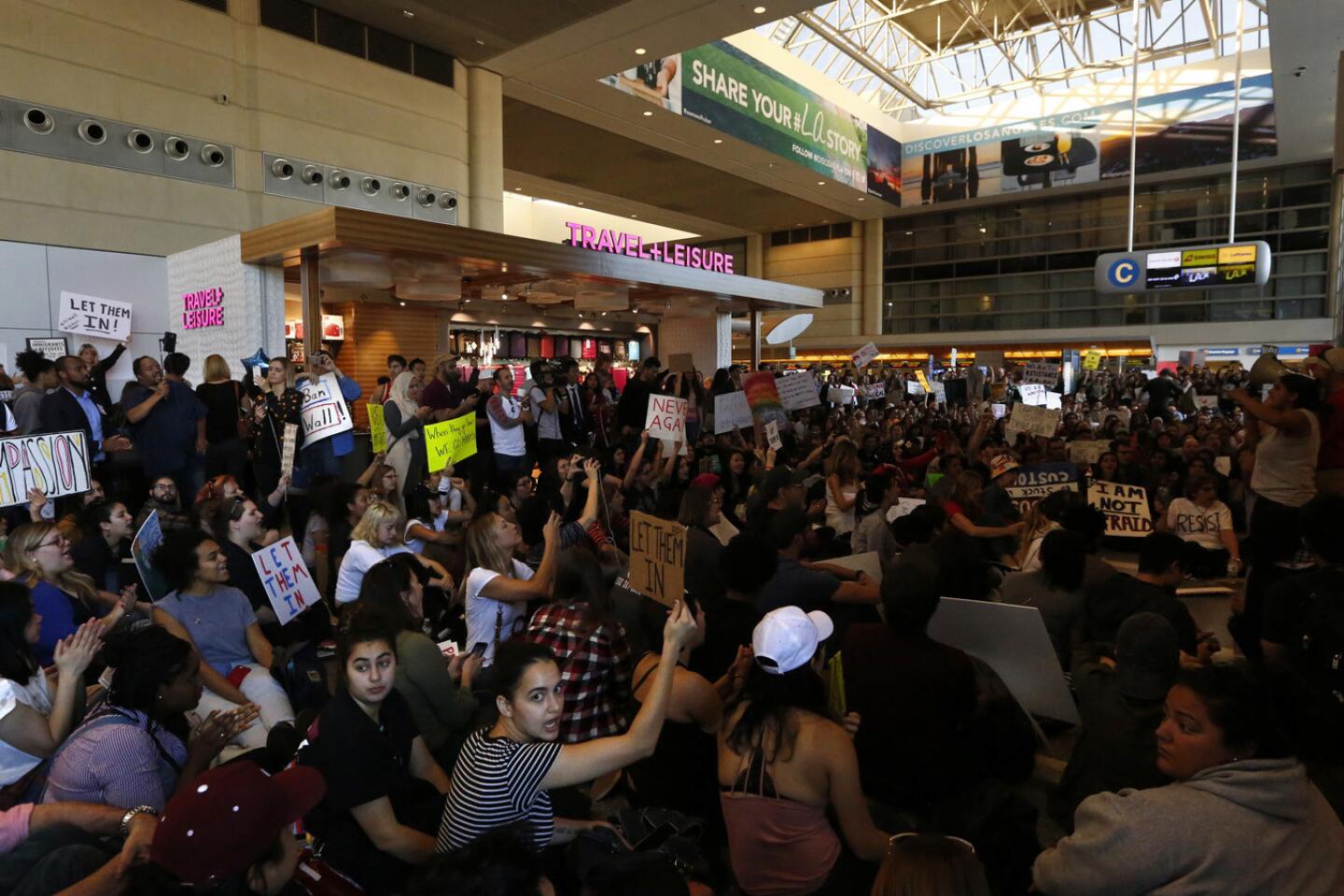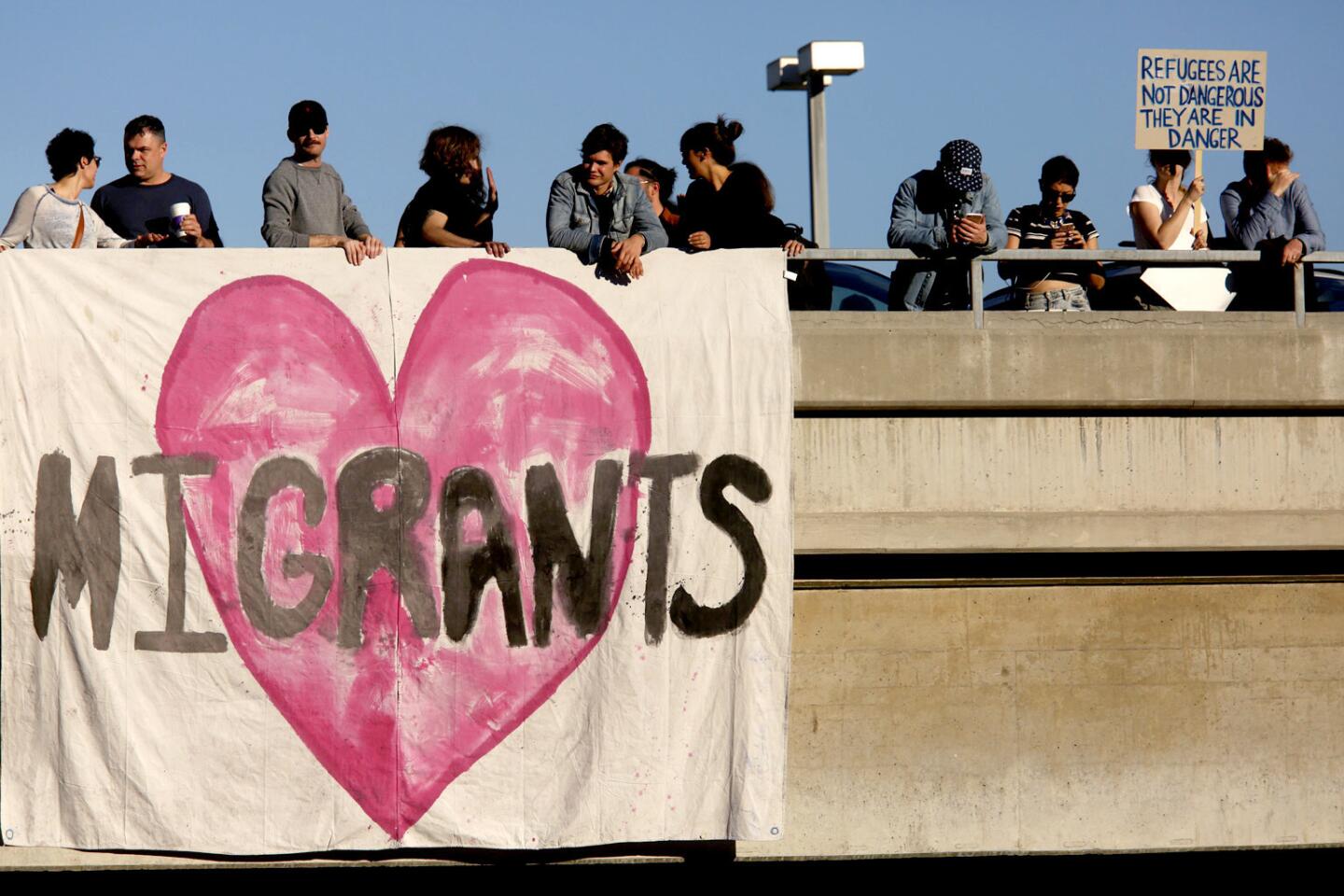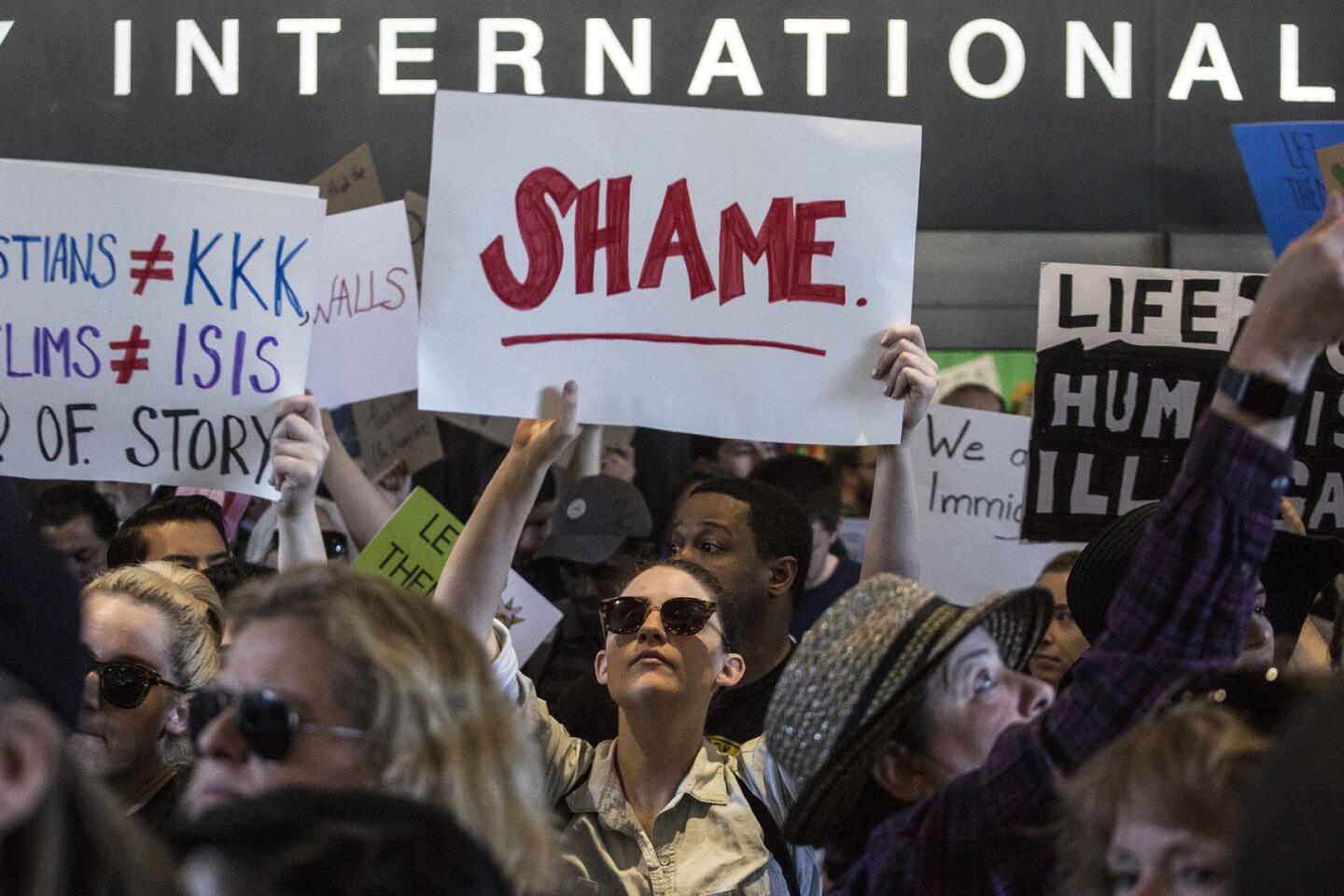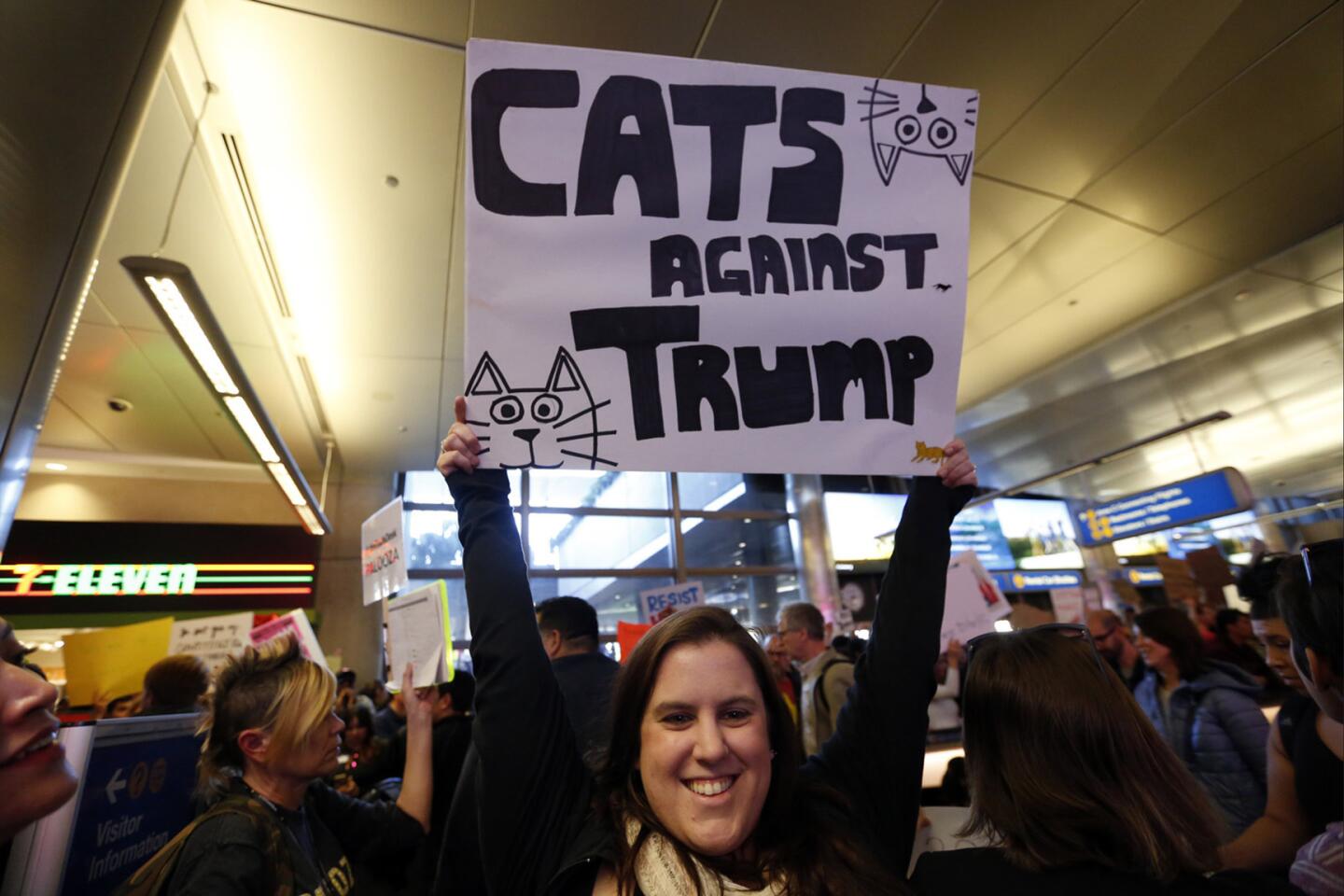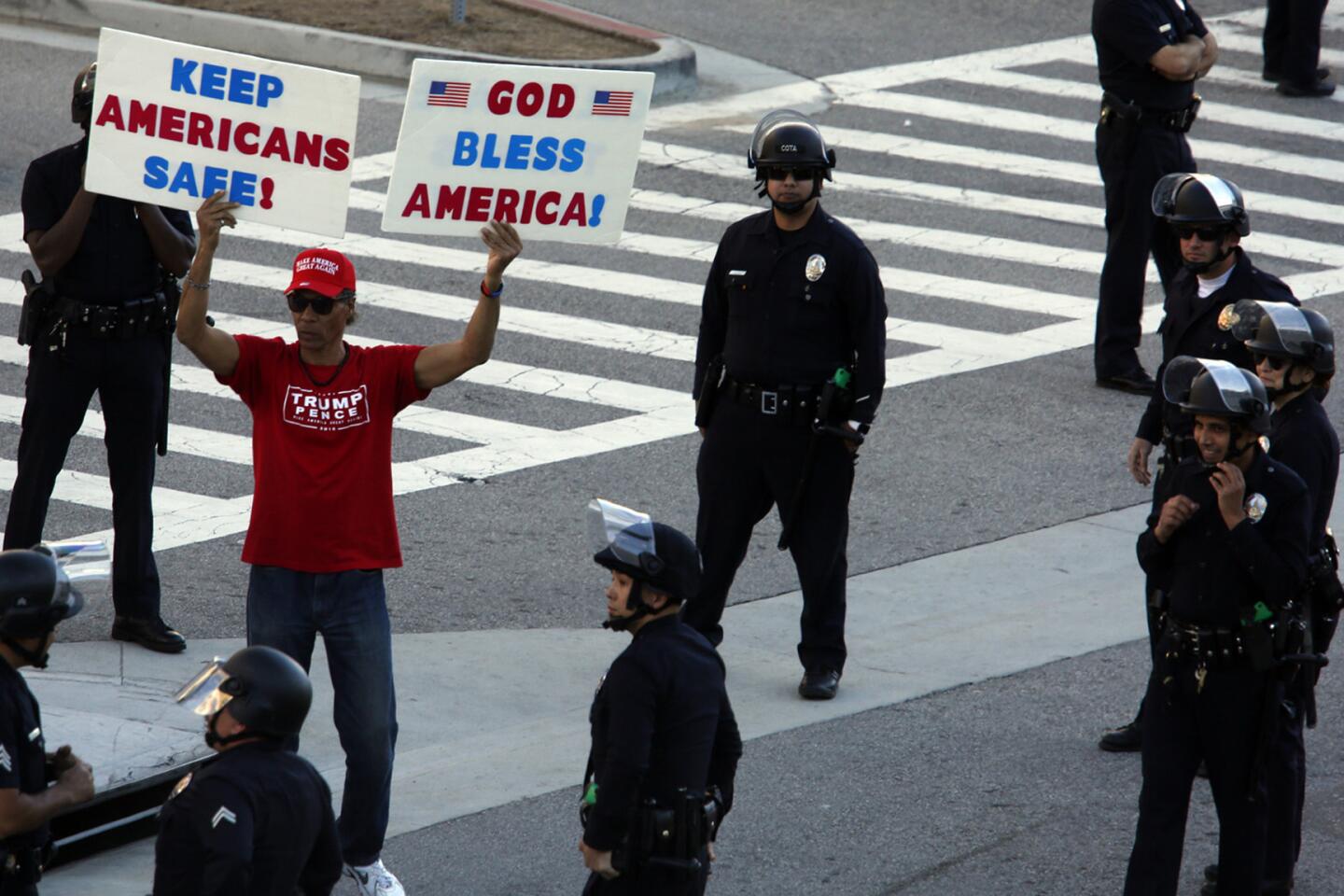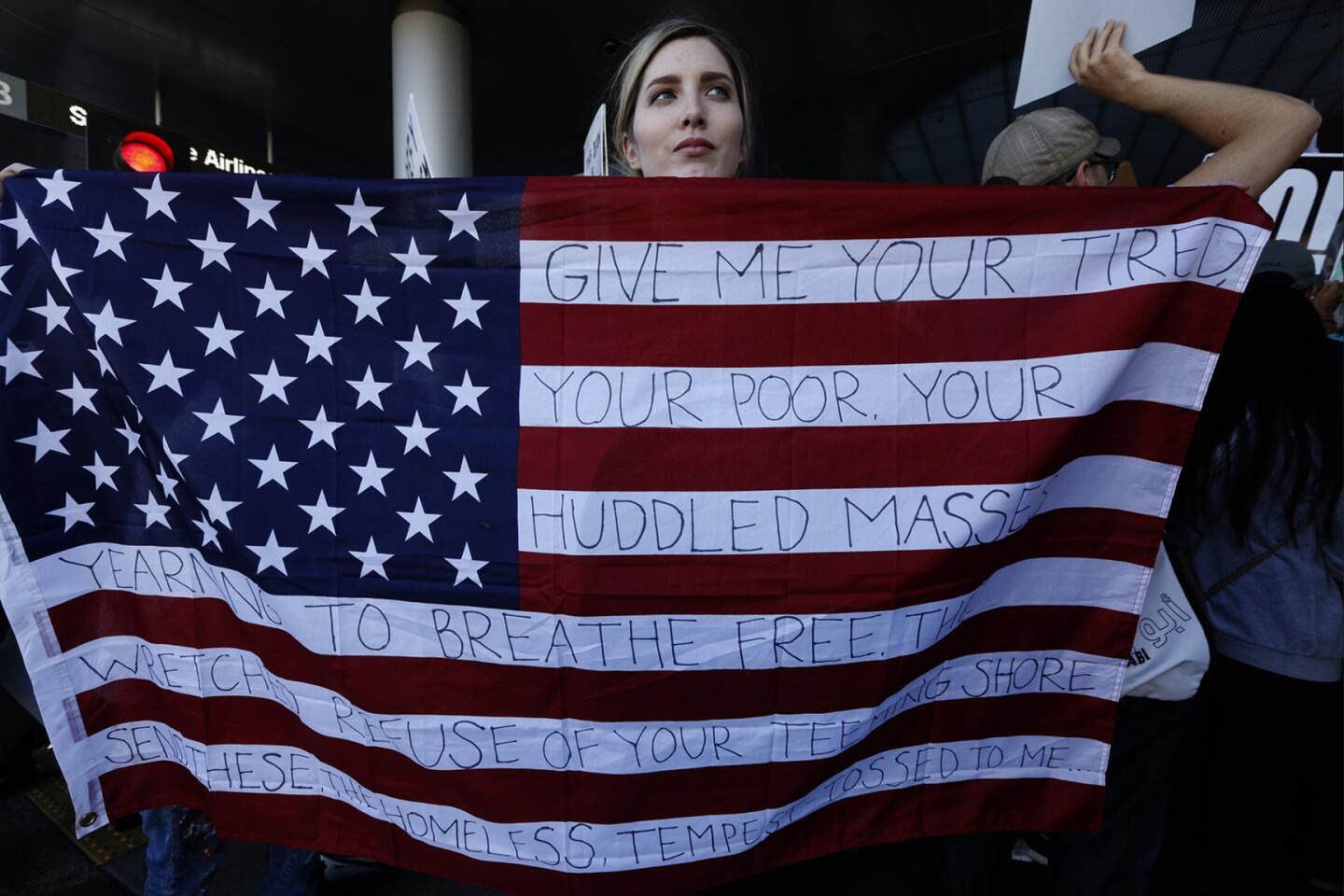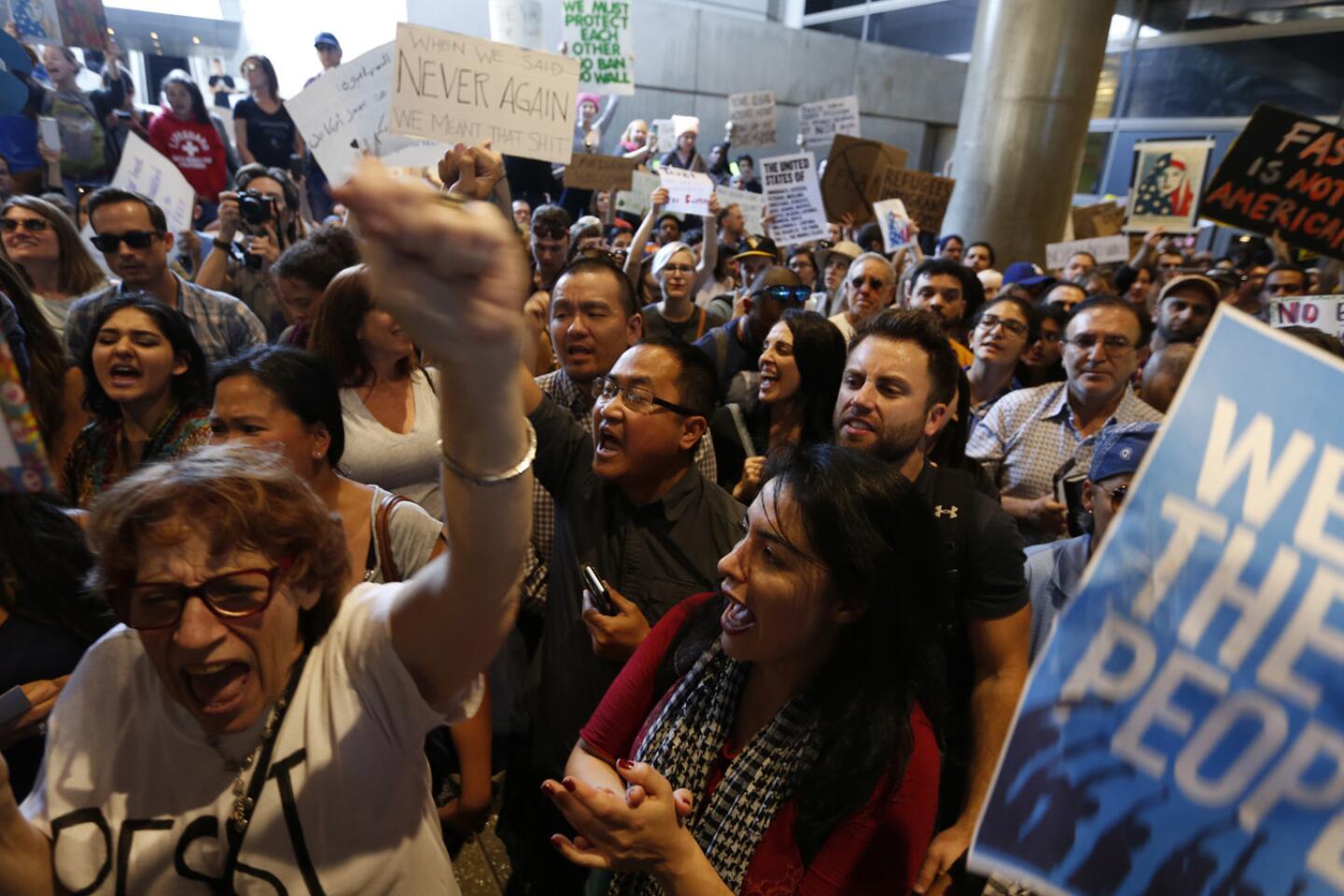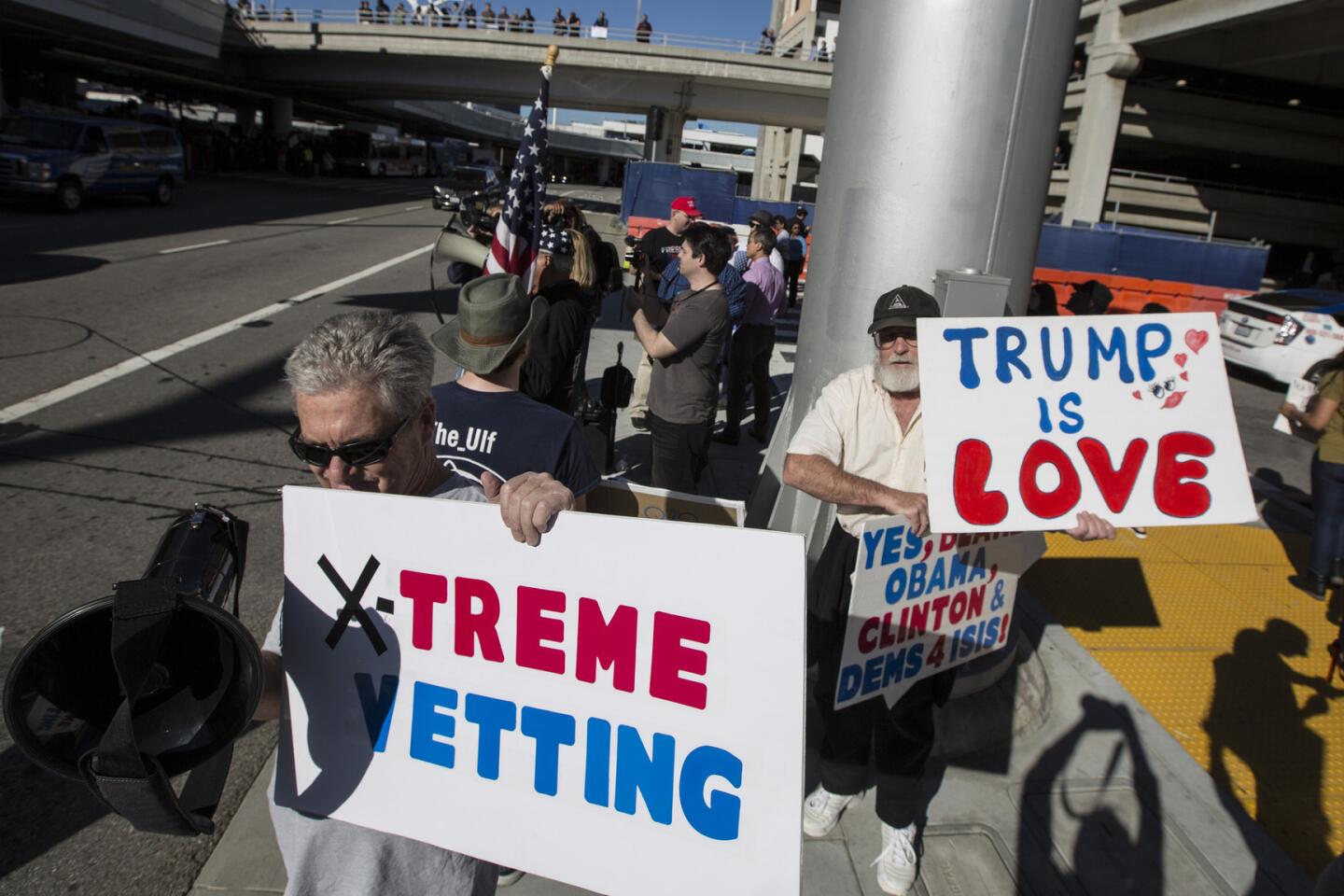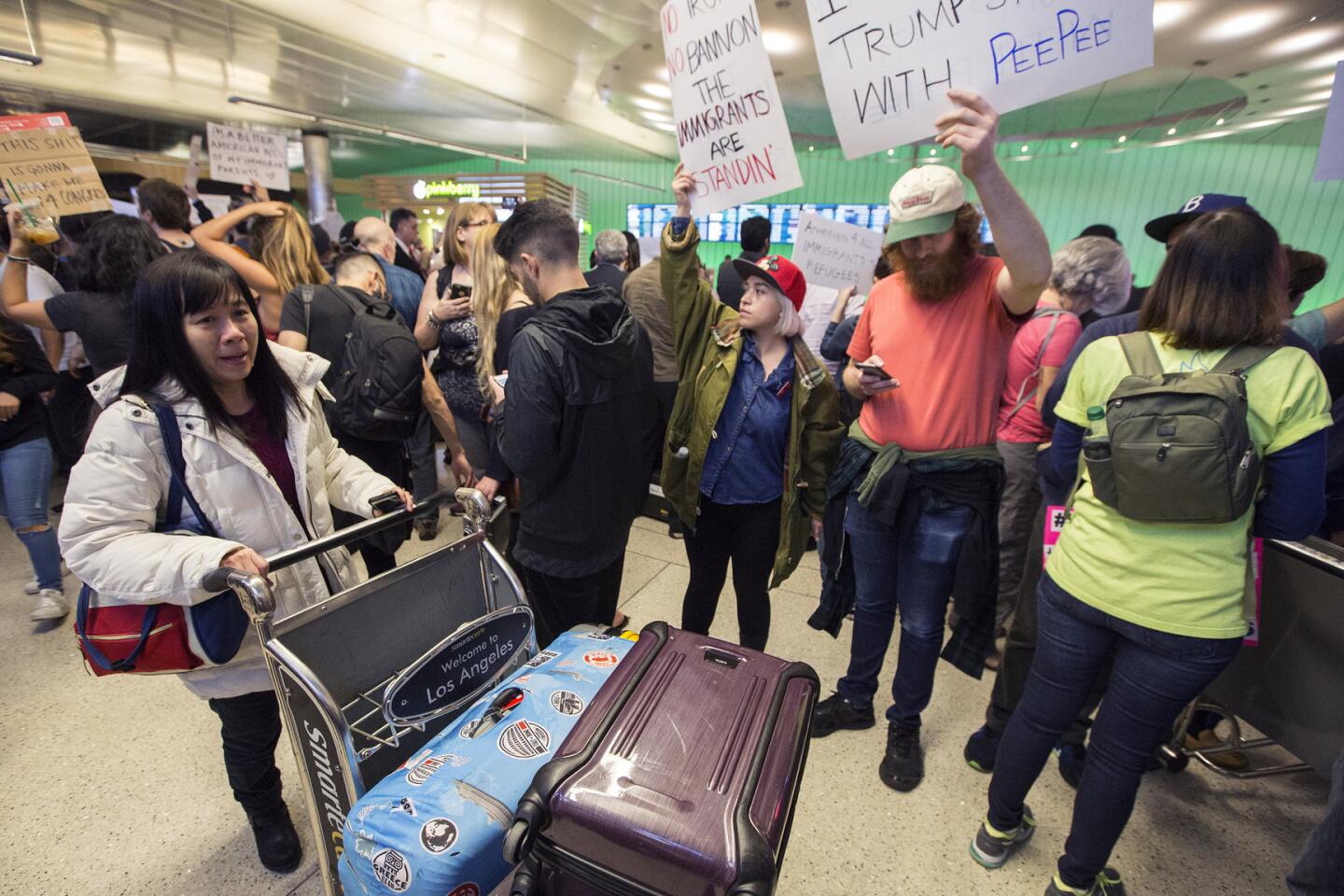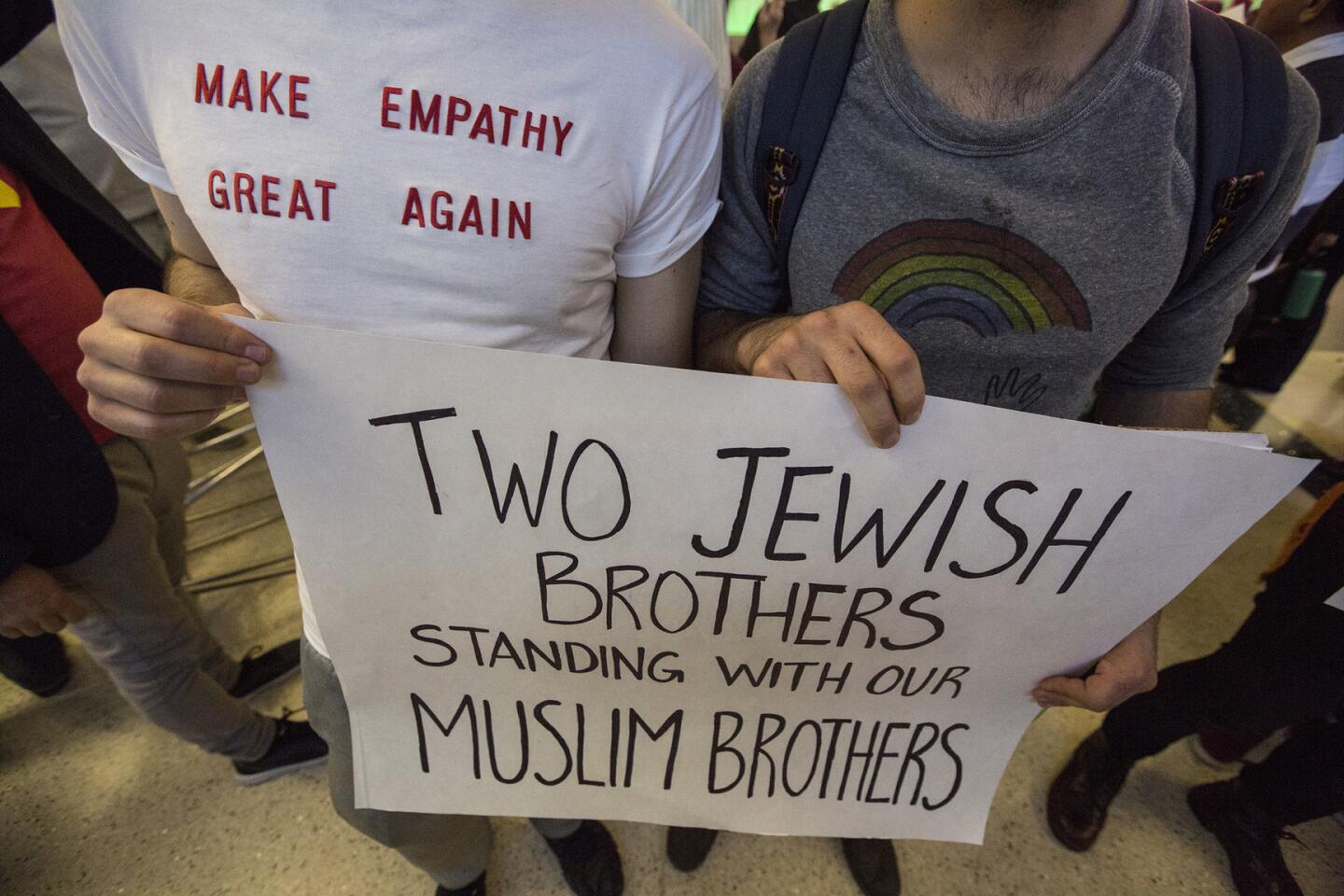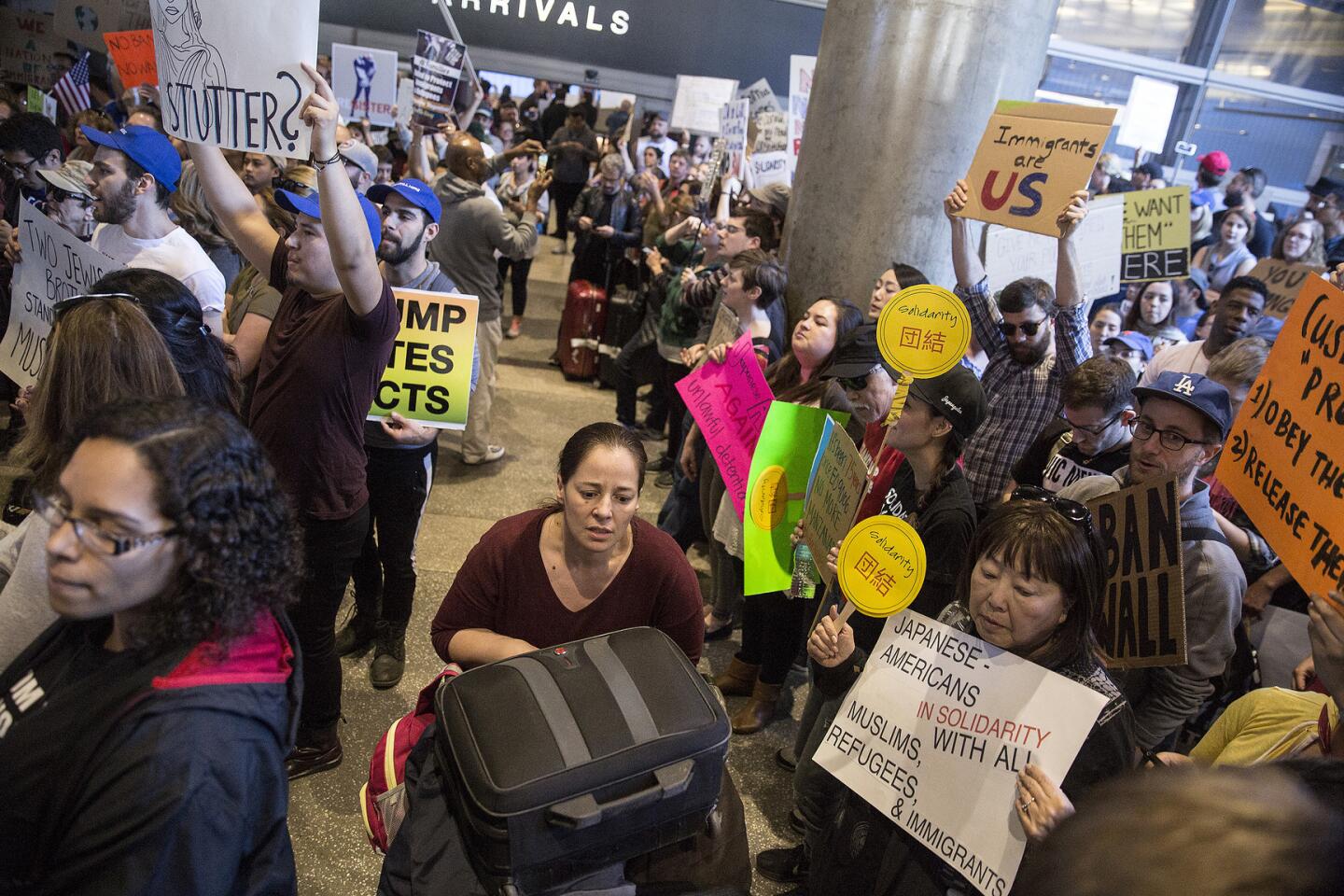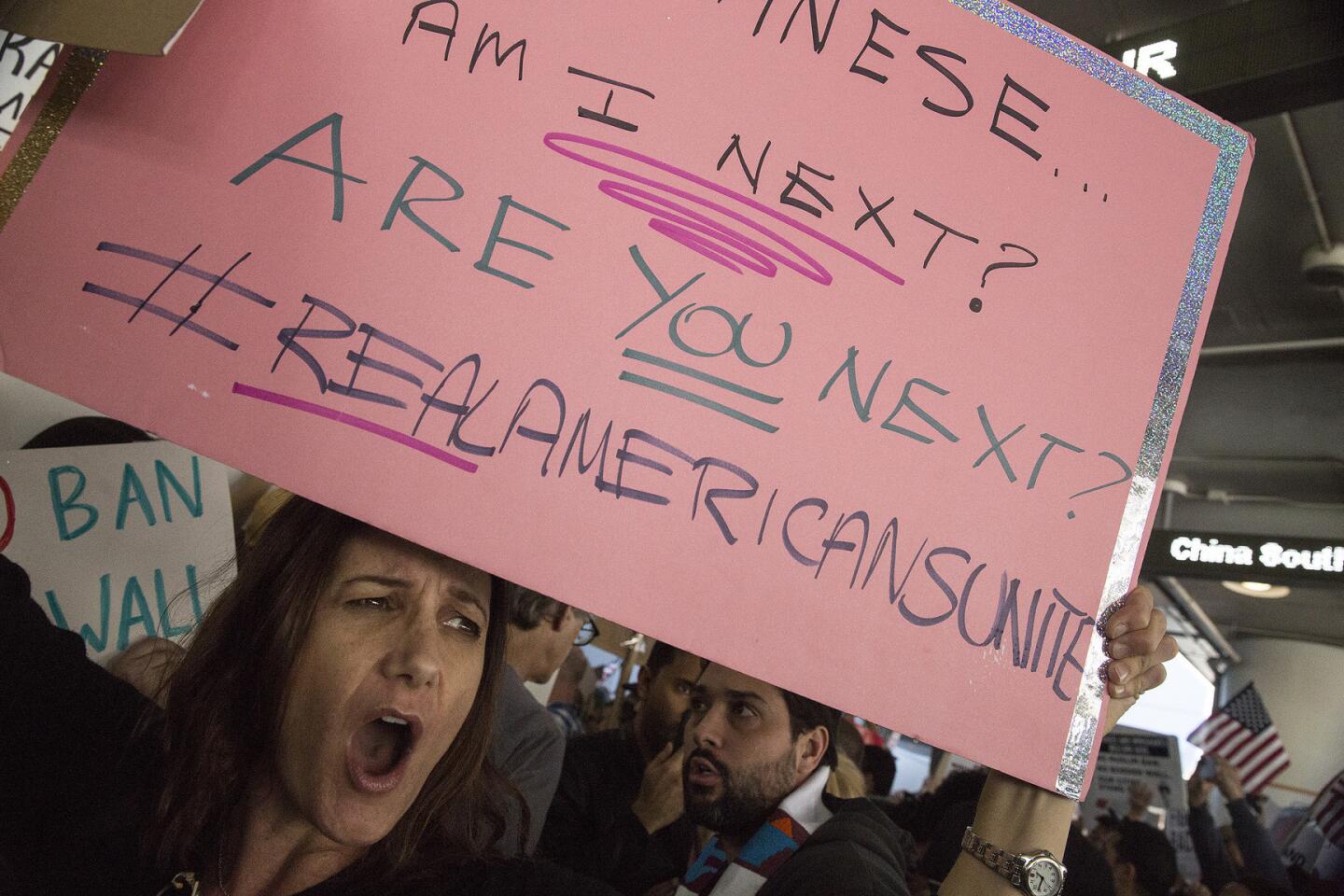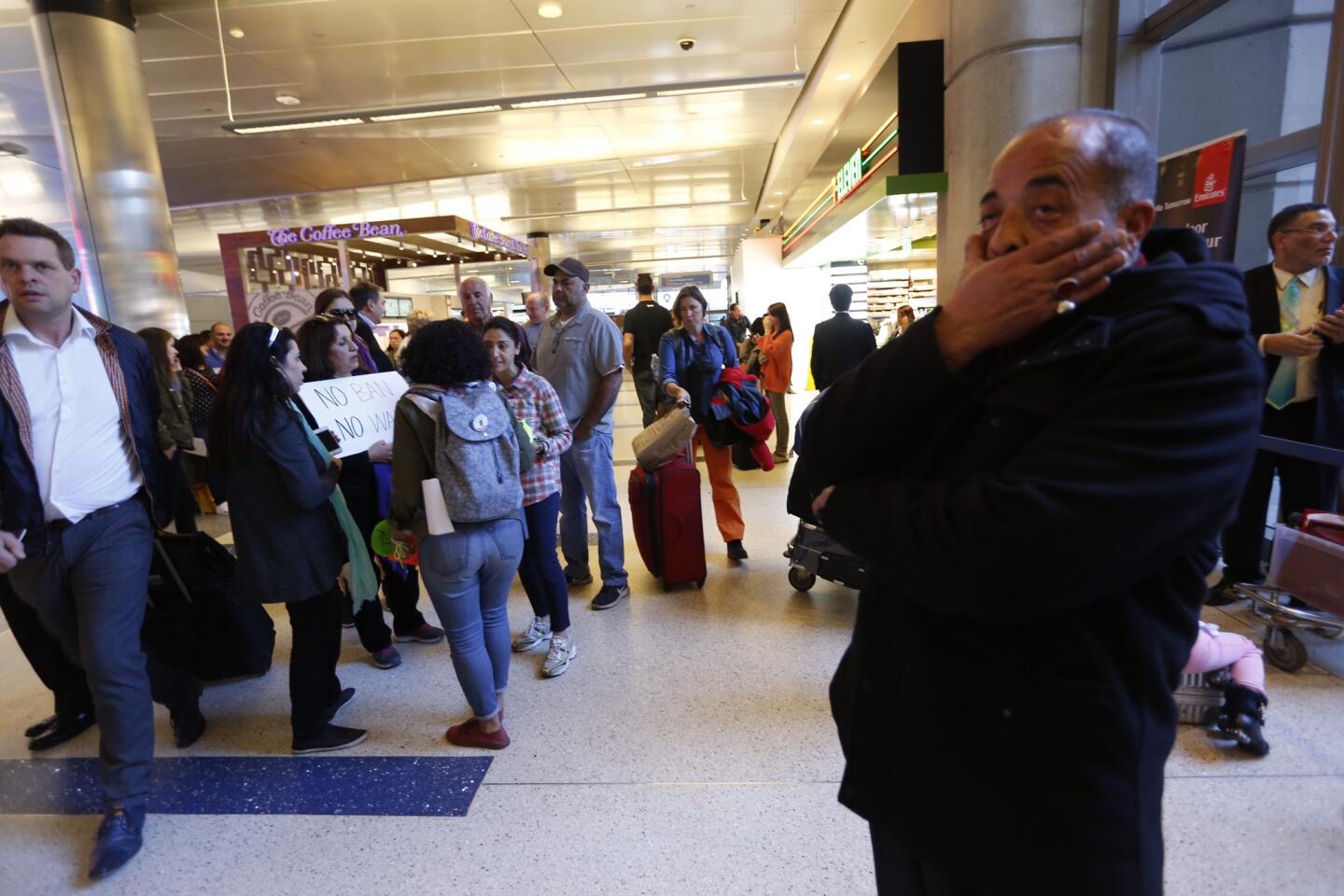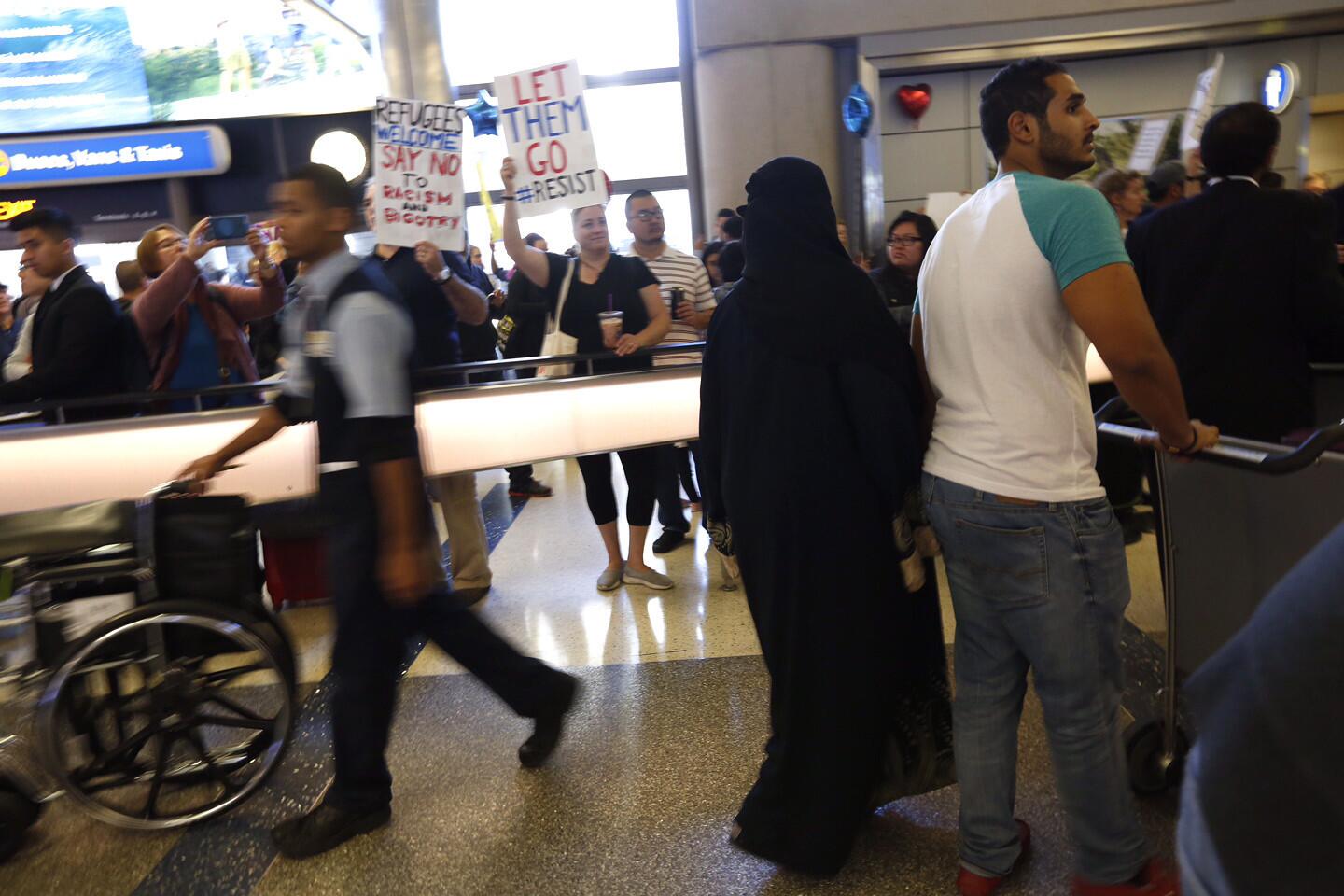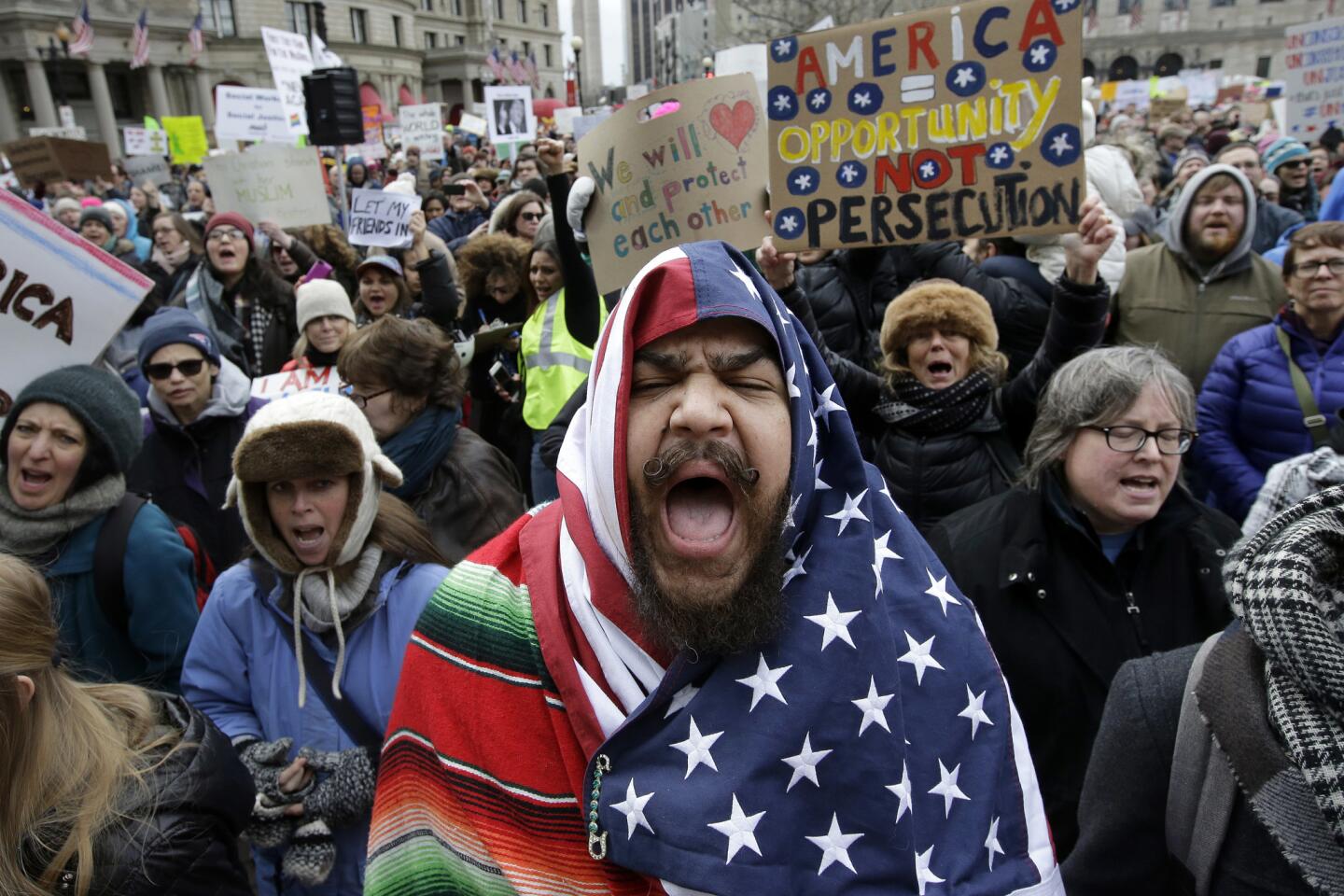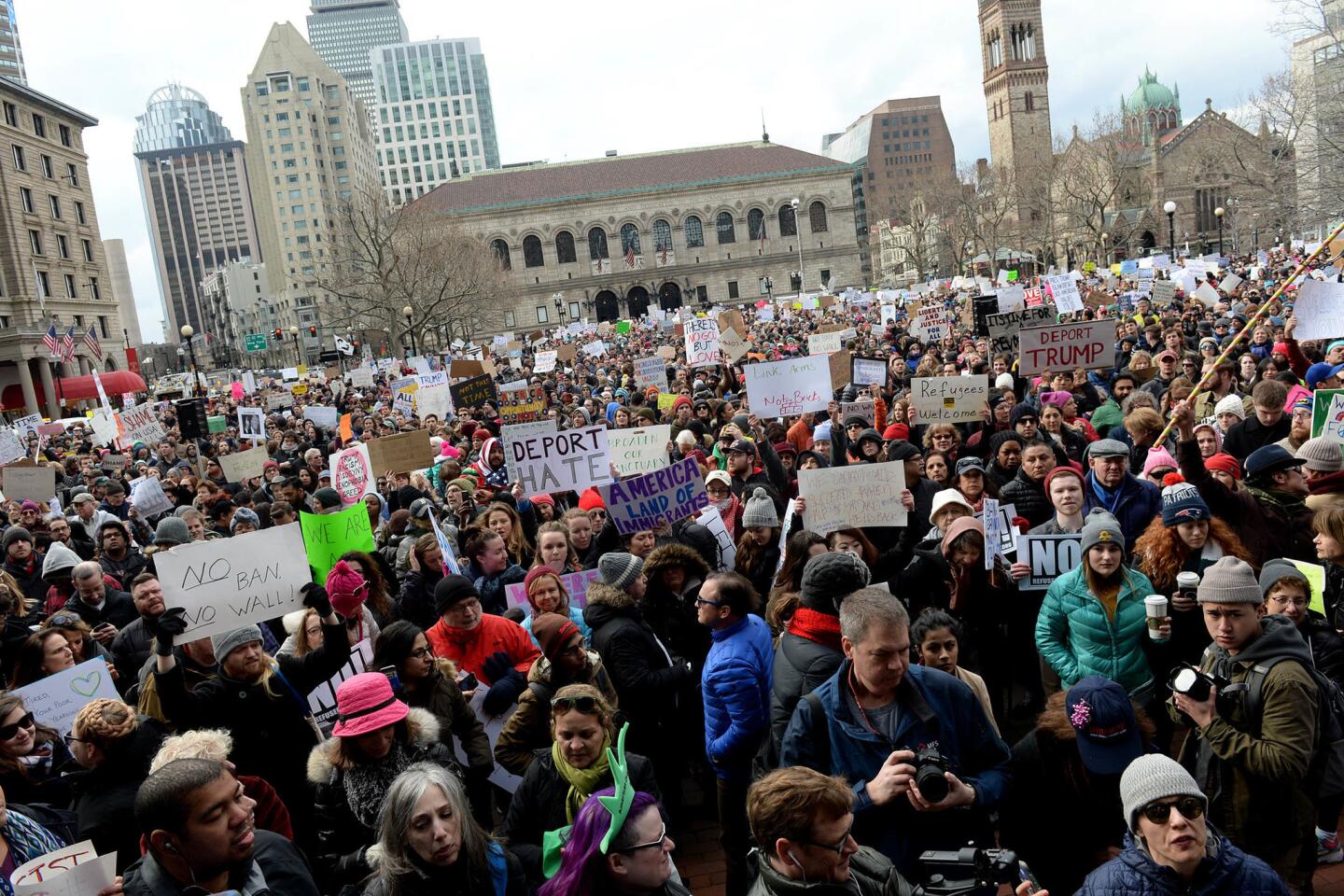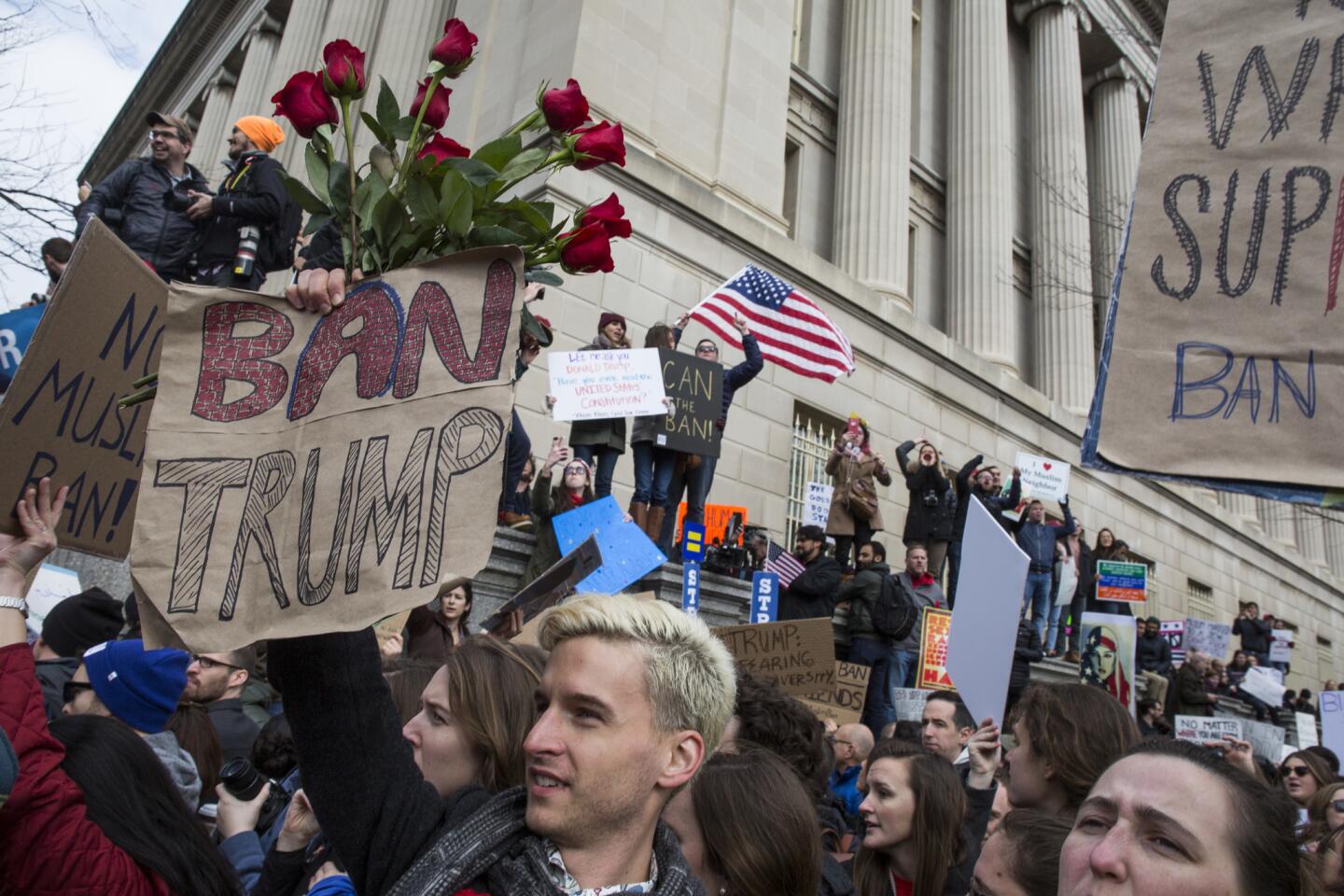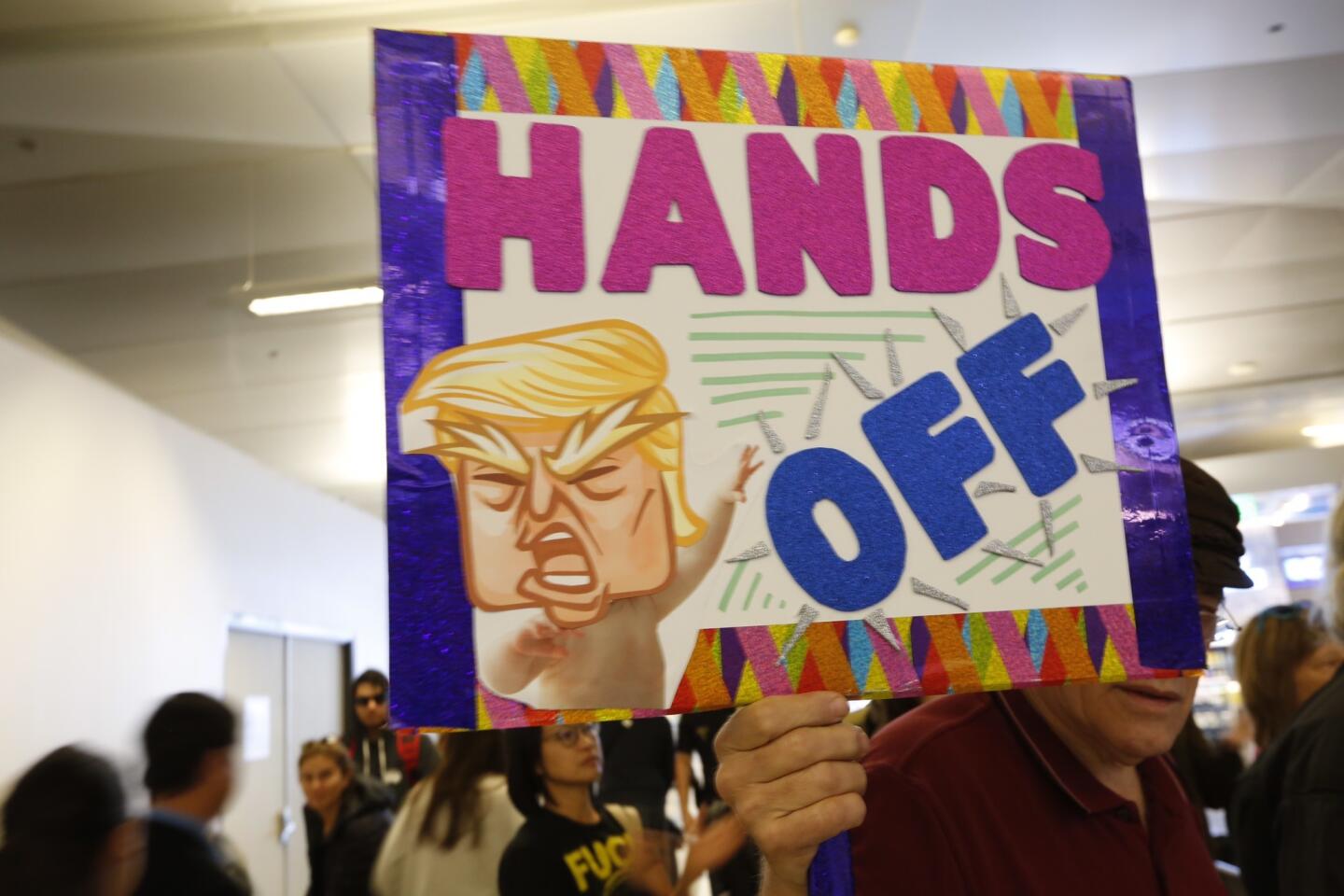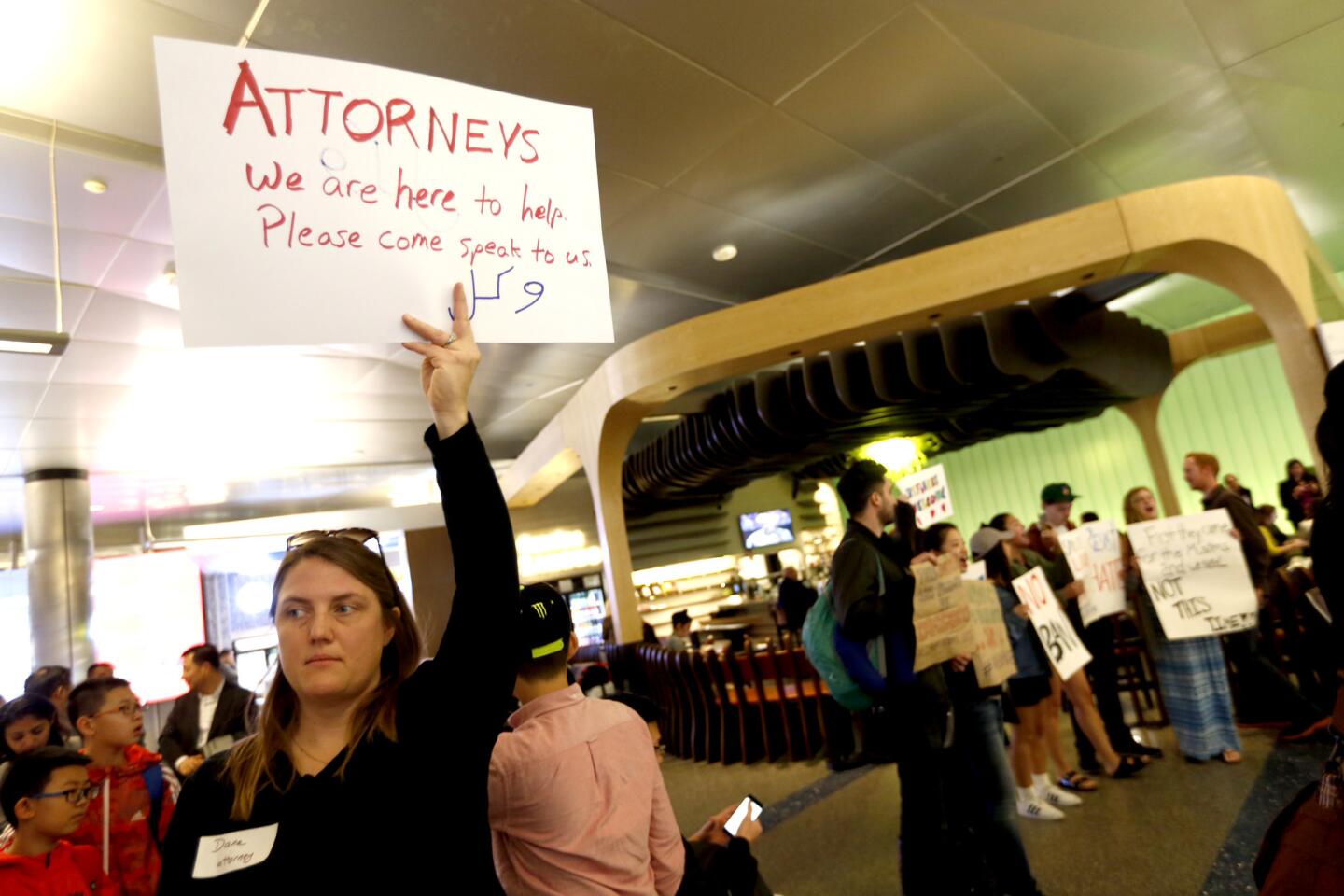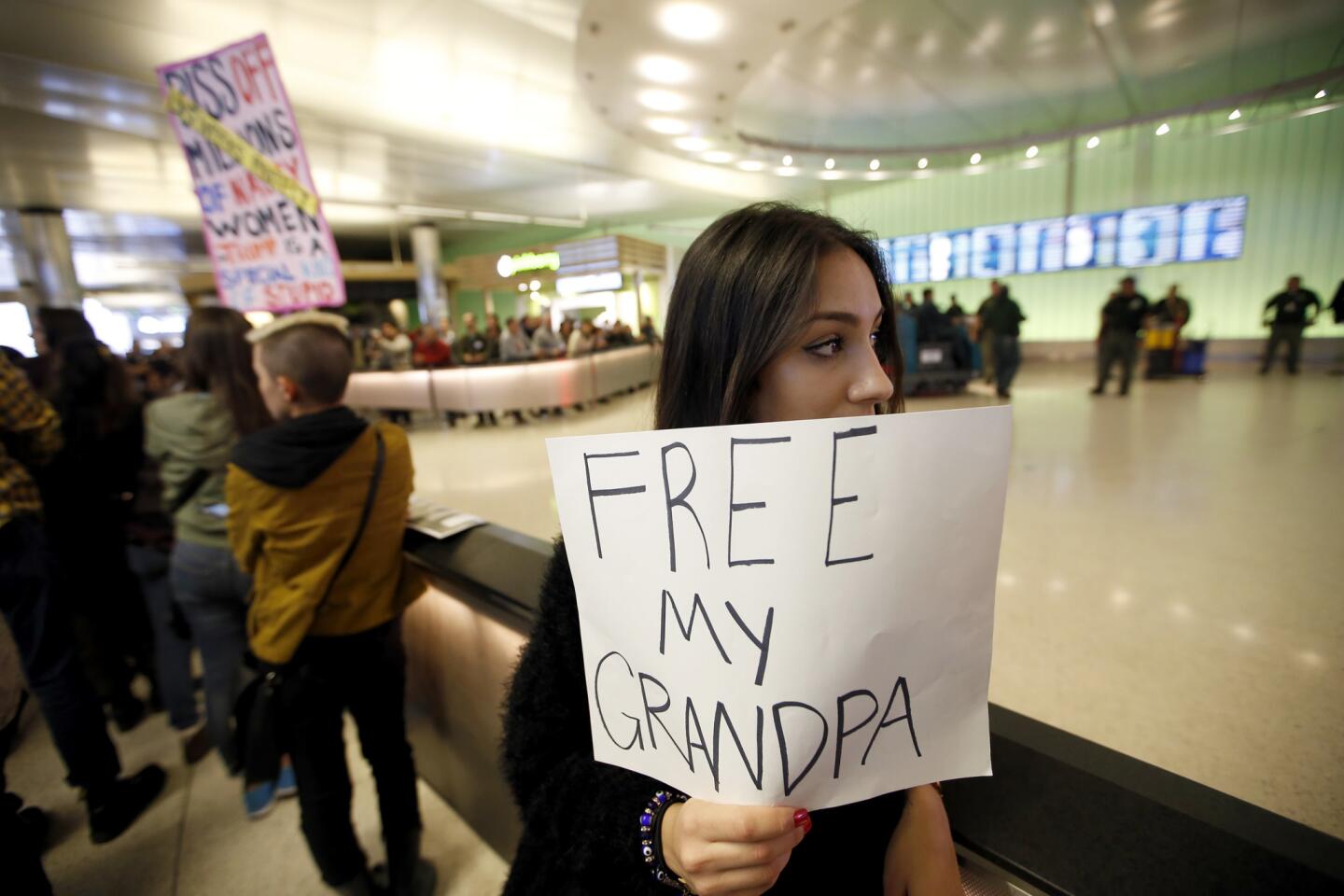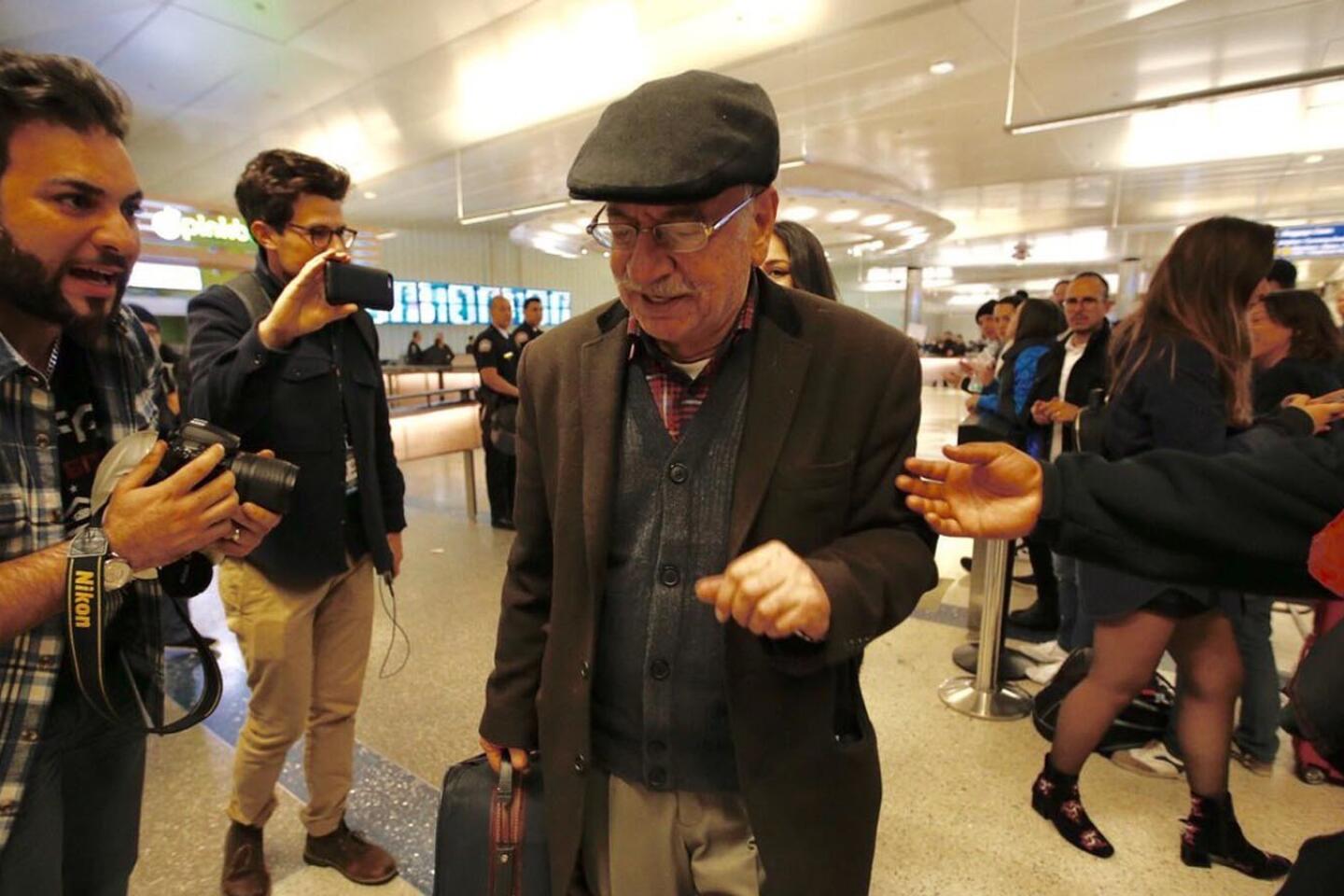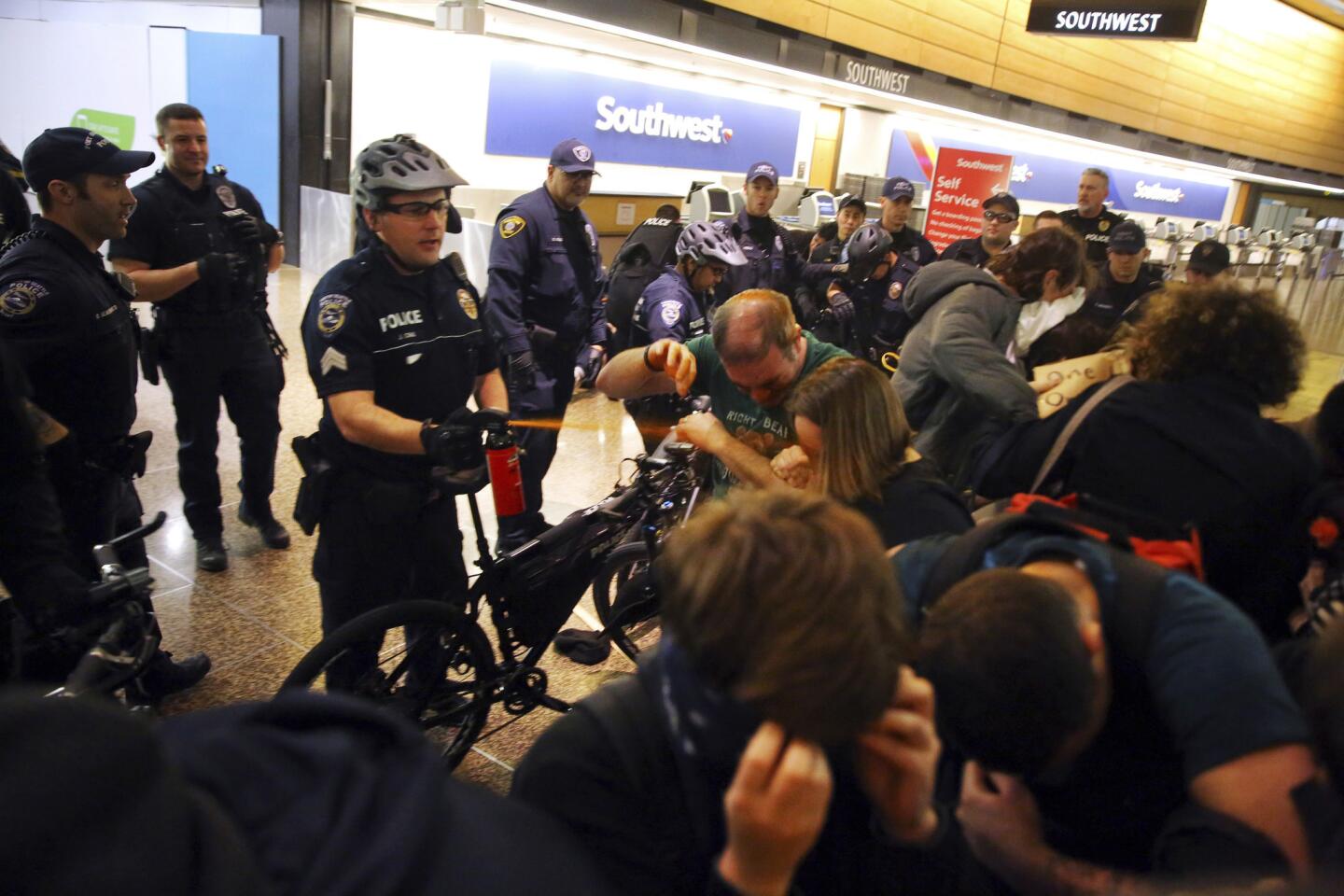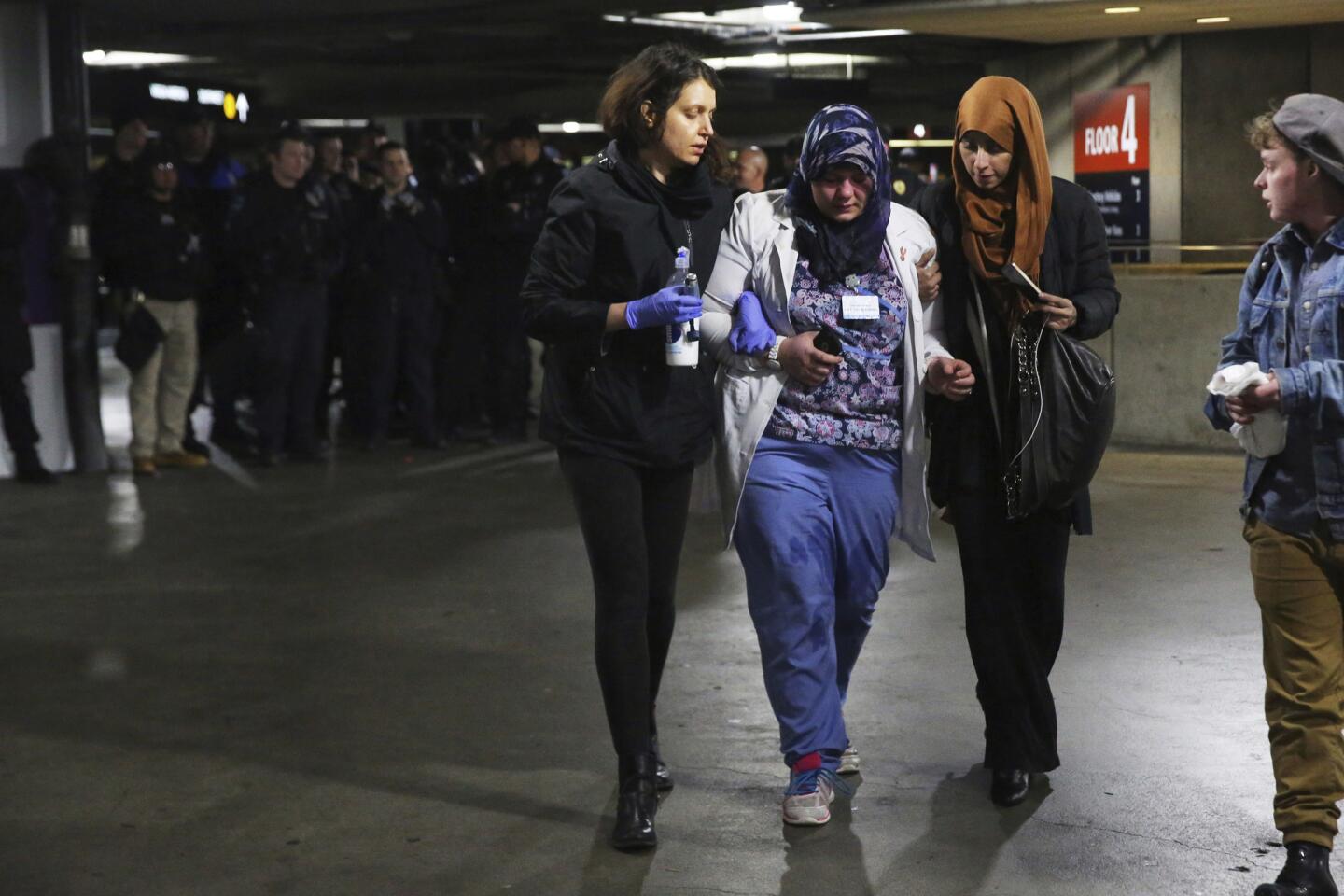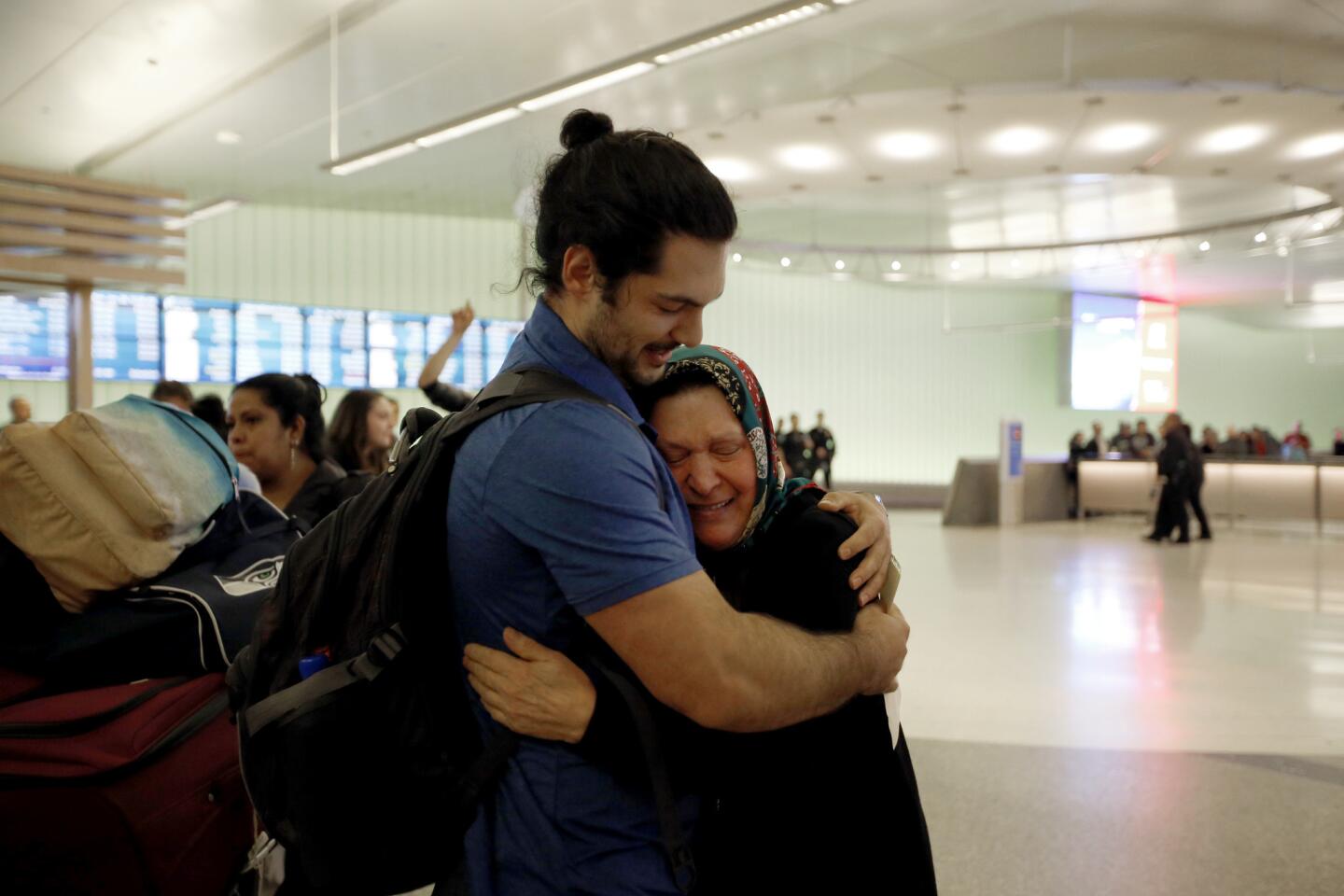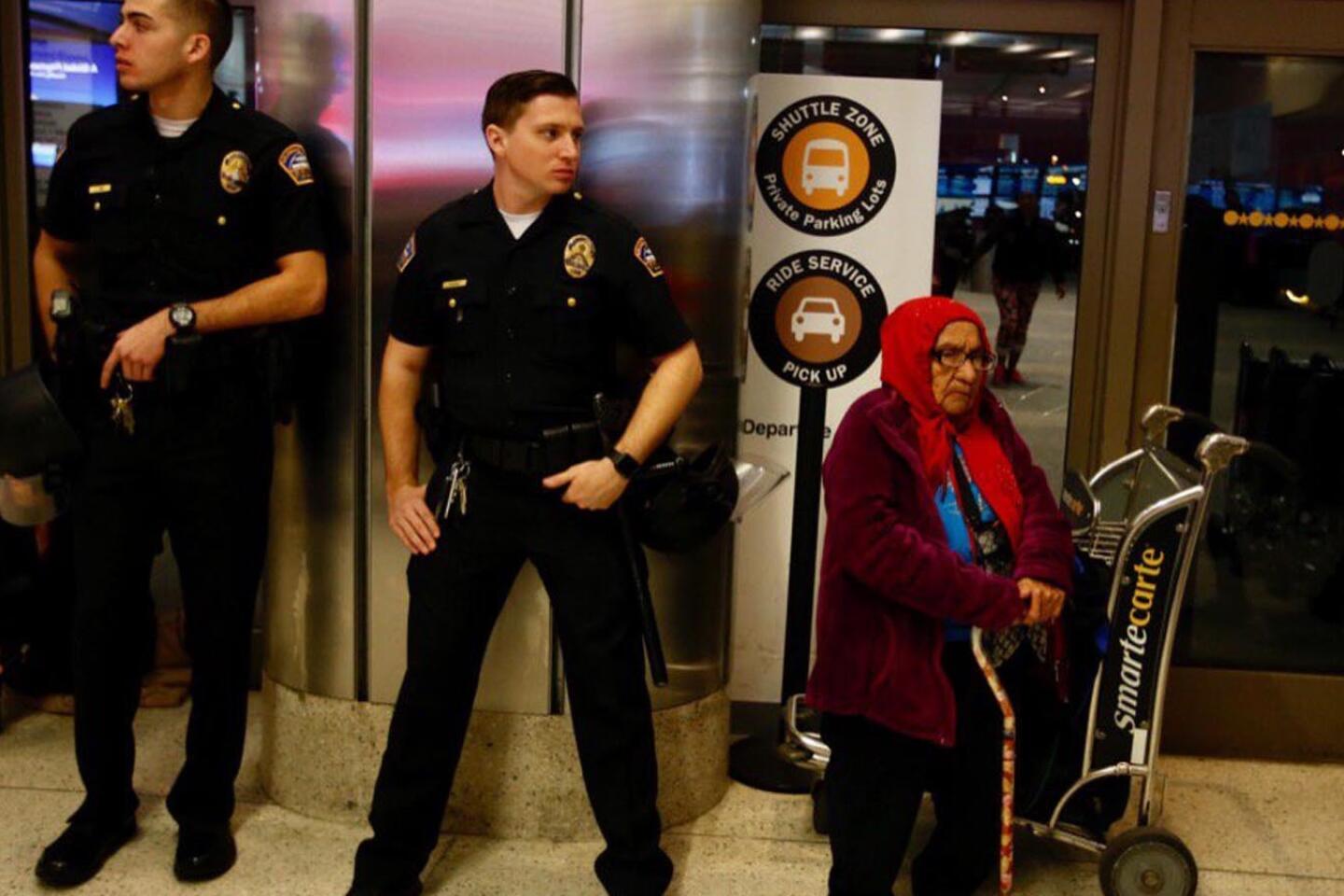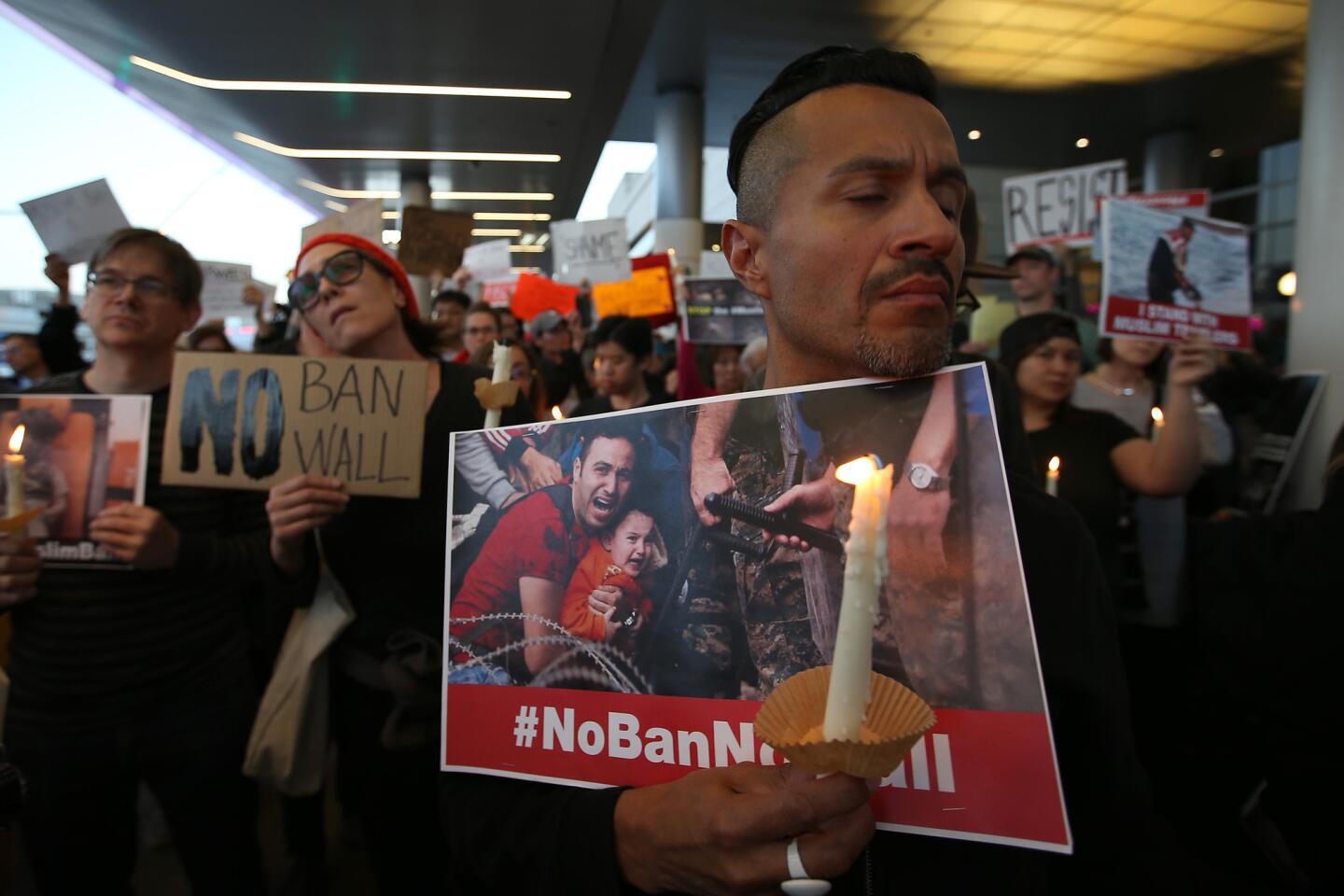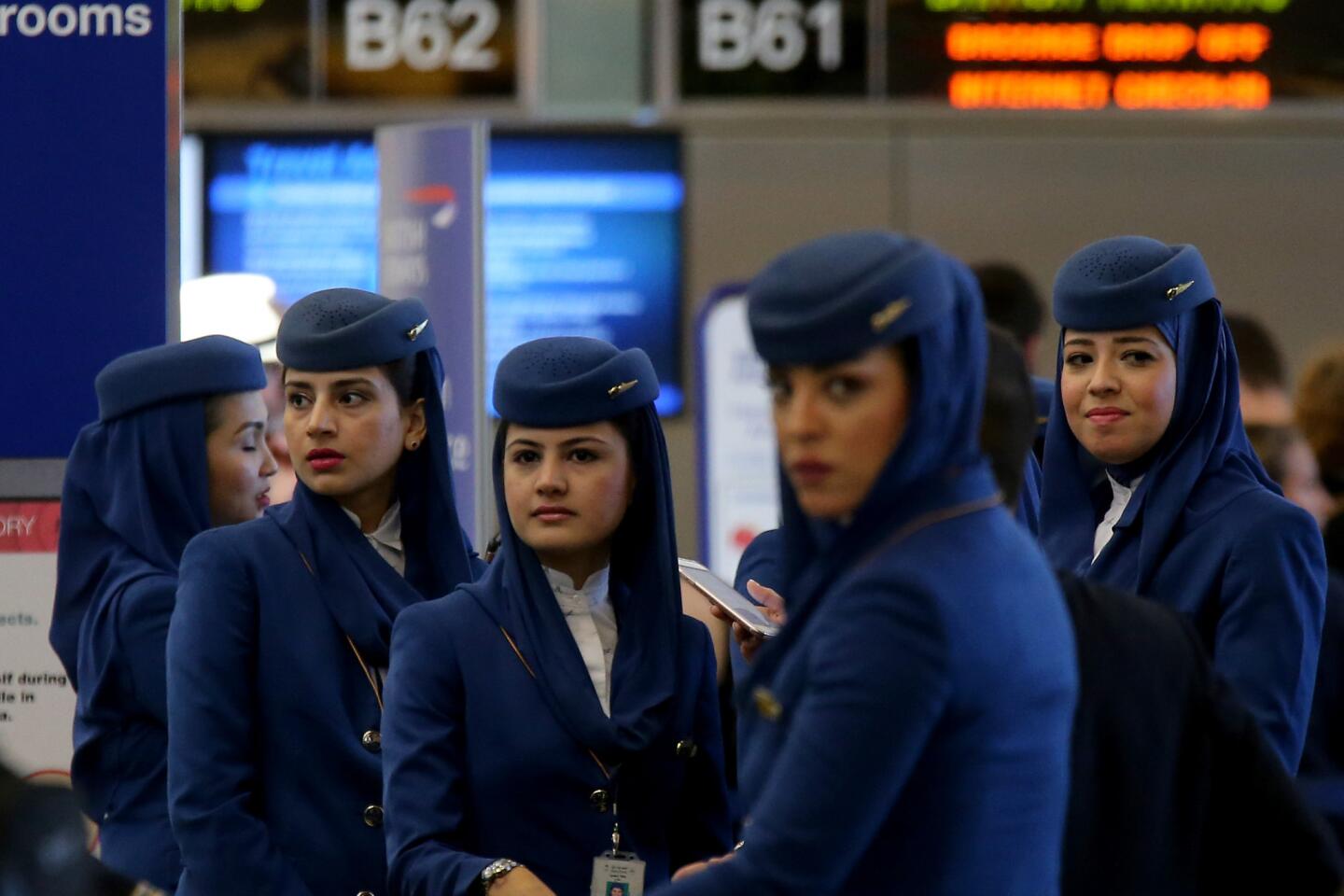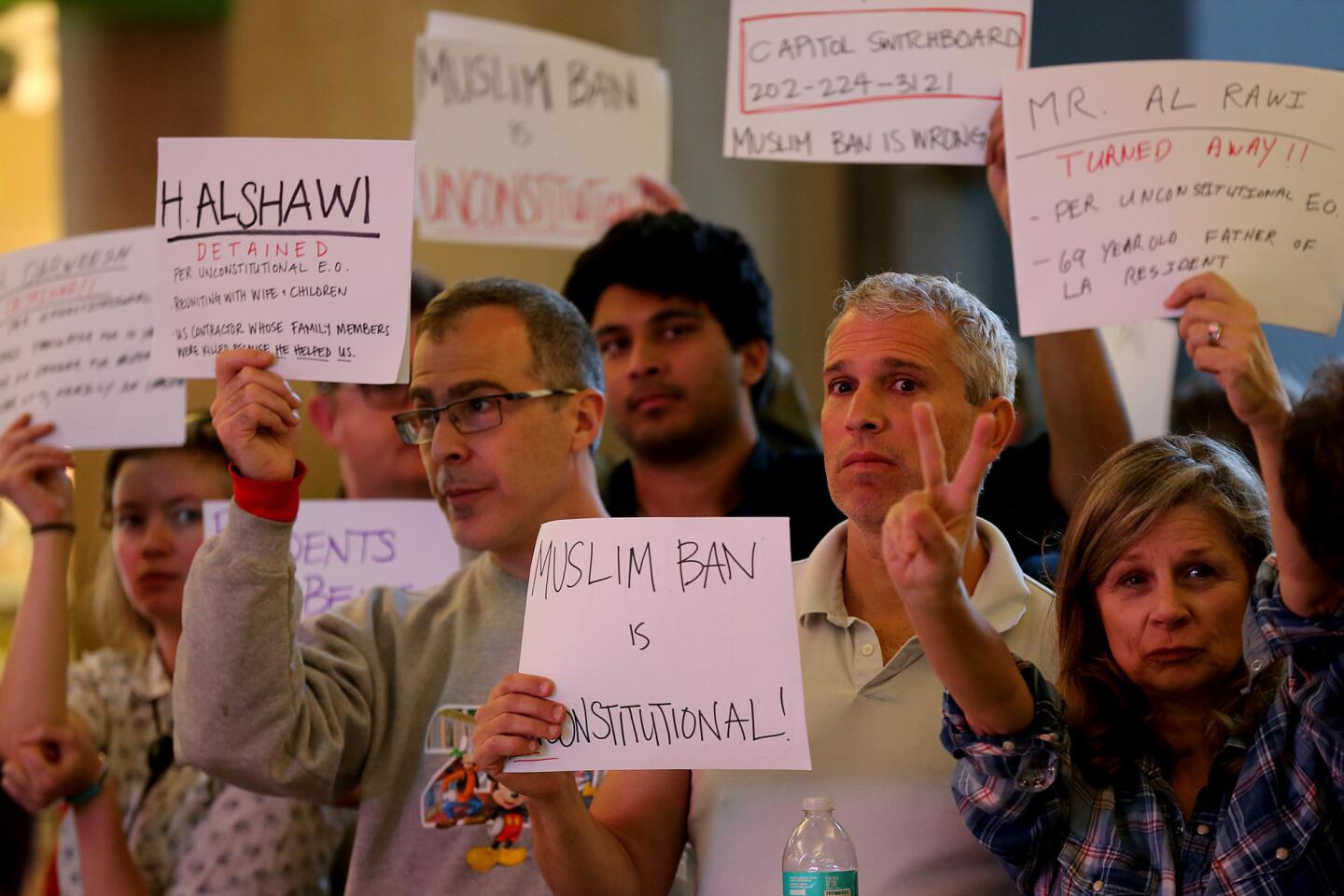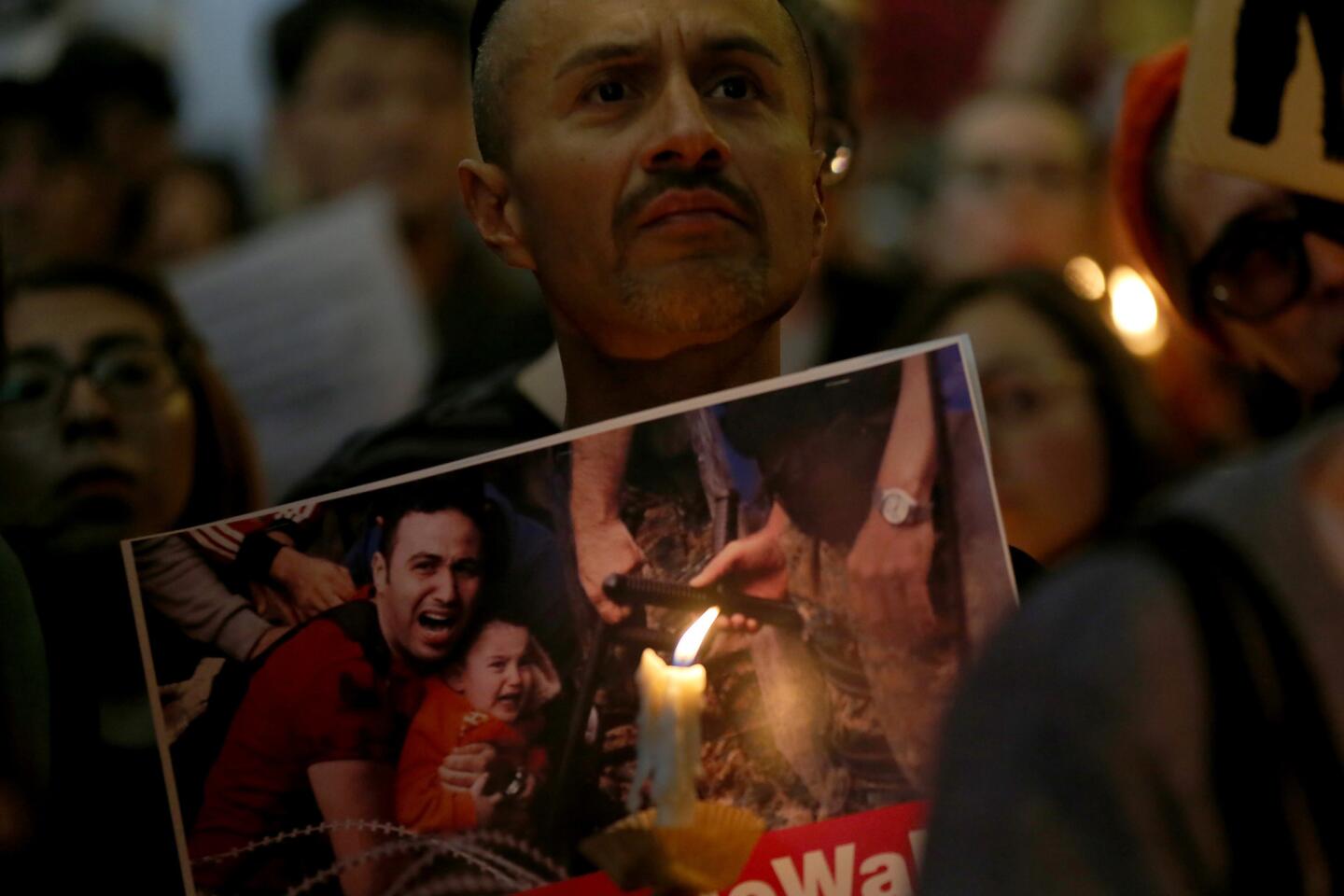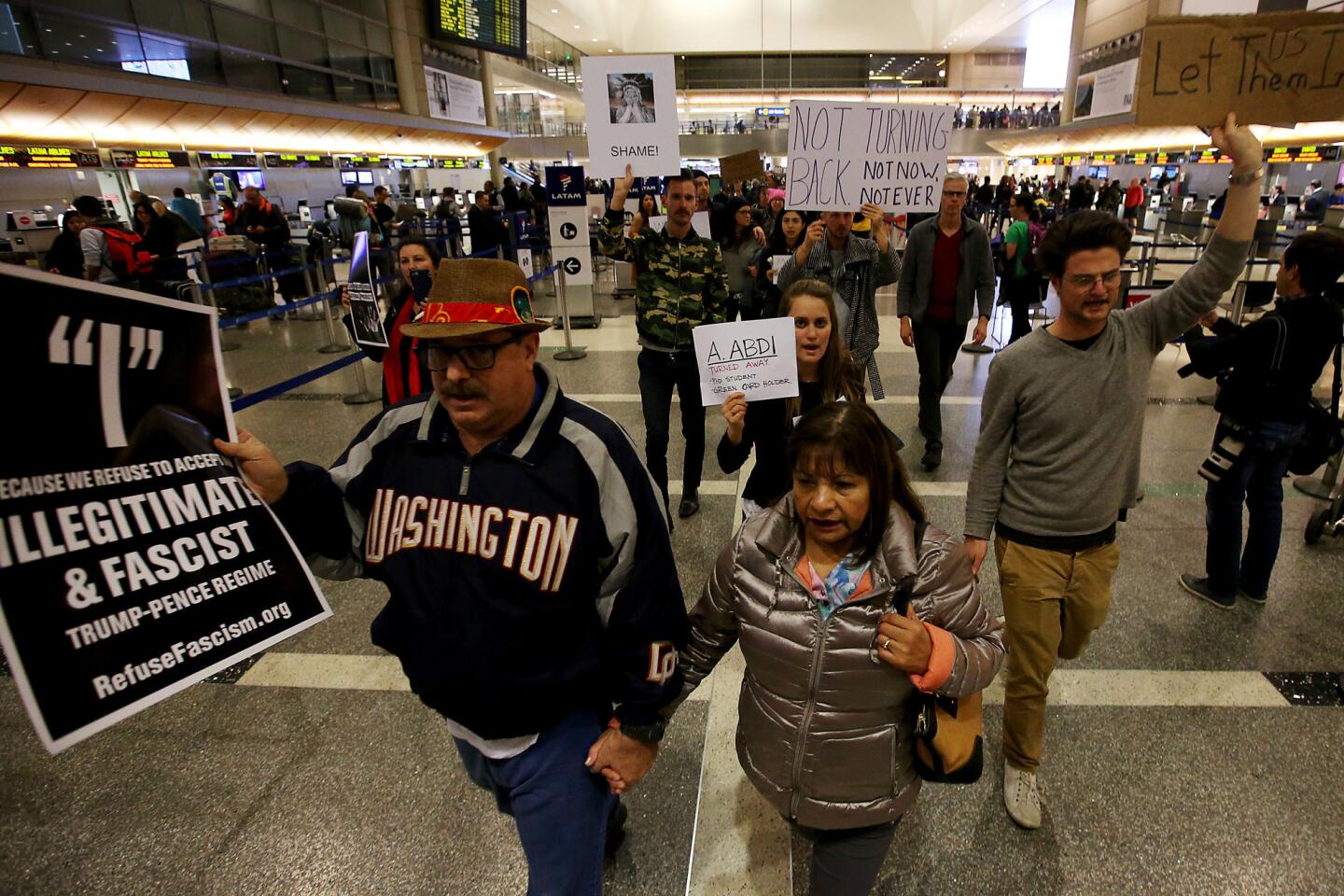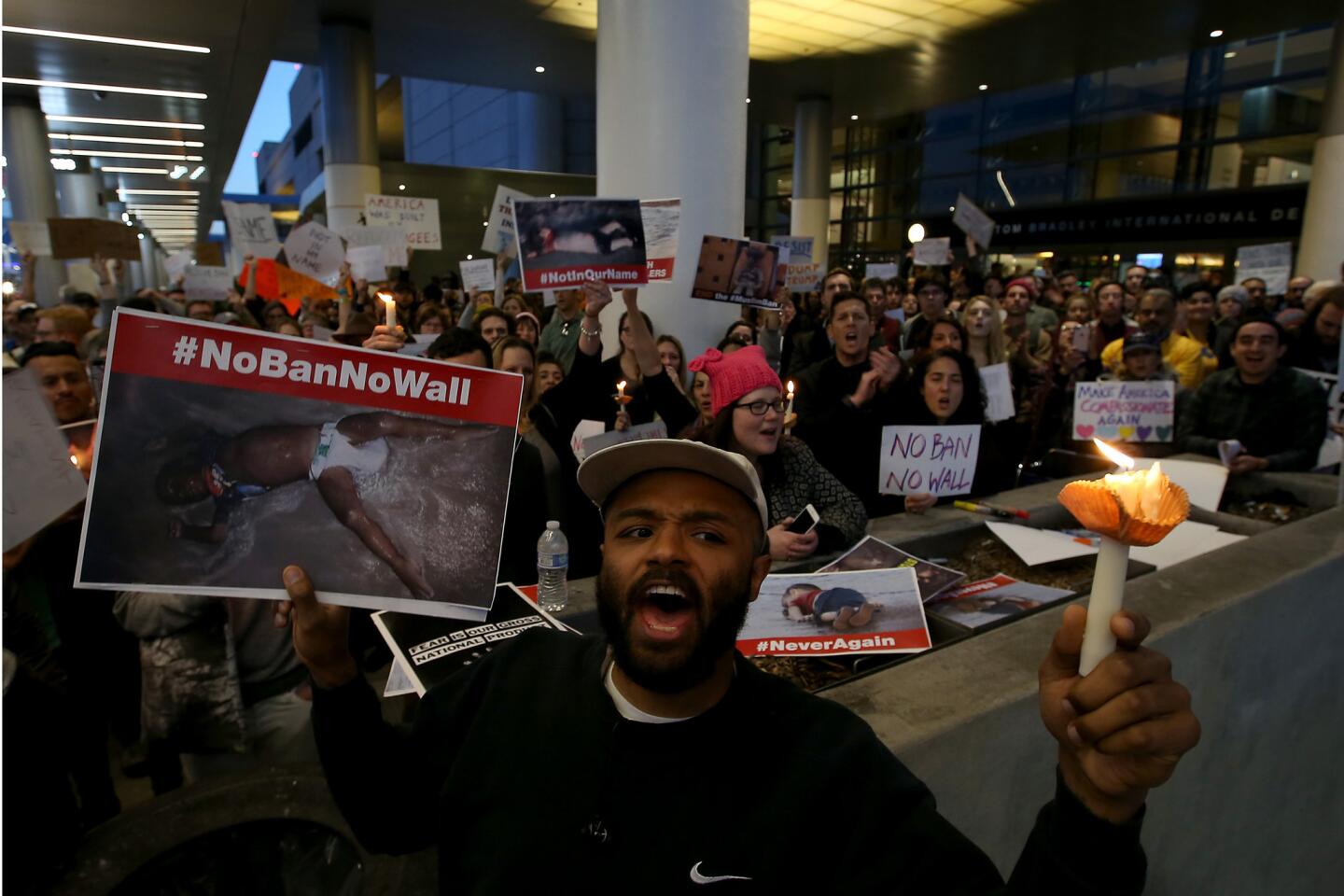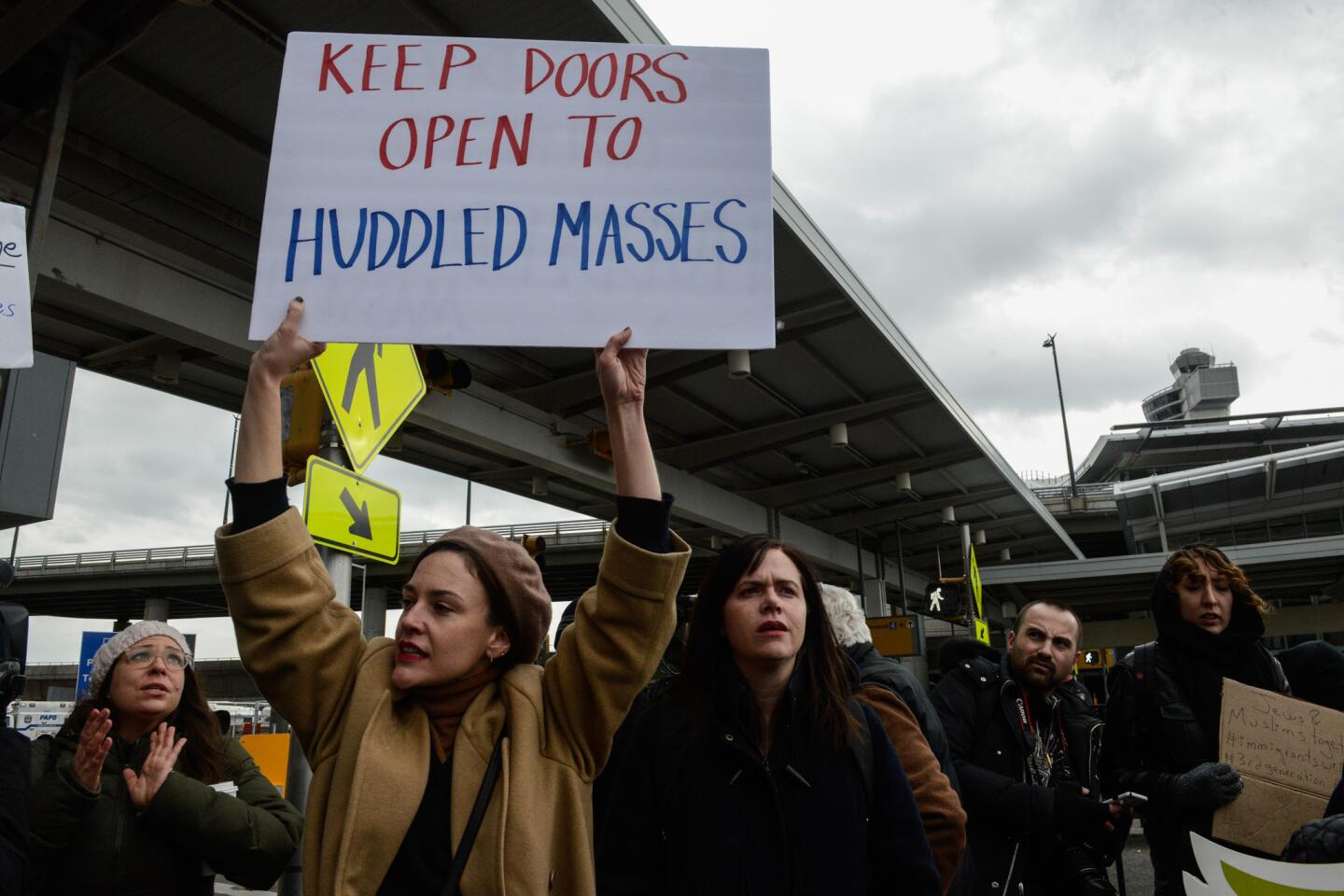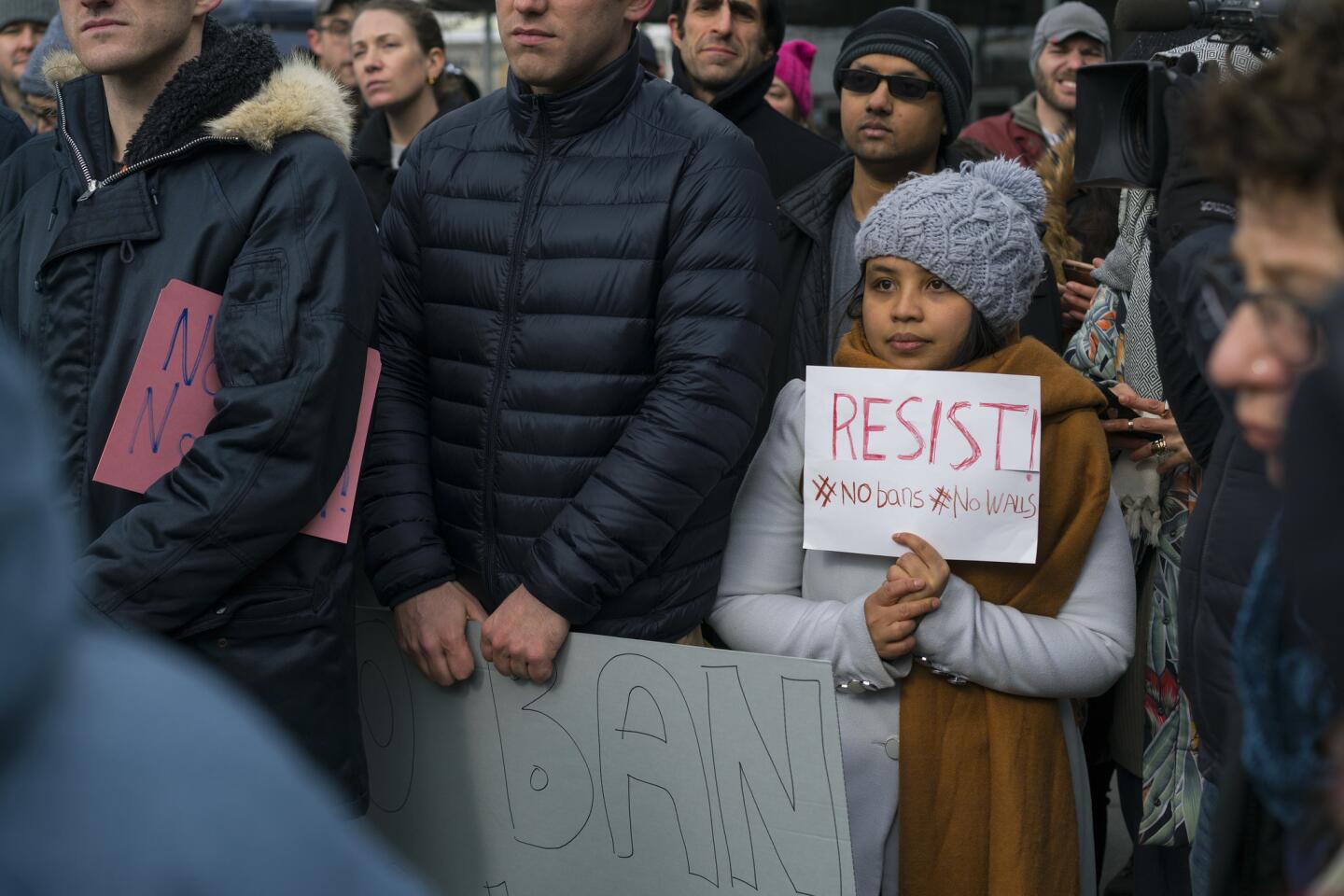Trump’s ban on some U.S. entries sparks confusion and protest worldwide, and legal rebukes at home
President Trump’s executive order suspending refugee arrivals and banning entry to the U.S. from seven Muslim-majority countries spawned chaos and consternation across the globe Saturday, stranding unwitting travelers, prompting passionate debate over American values and igniting a fierce legal pushback that yielded early court victories for the president’s opponents.
The abrupt ban ensnared people from all walks of life who were caught in transit or expecting to soon return to the U.S. — not only refugees but students on a break from studies, business travelers and scientists, tourists and concert musicians, even the bereaved who had gone home for funerals.
Of all the directives issued during a first jolting week of Trump’s presidency, it was this one that reverberated most powerfully in the outside world. Trump and his team insisted the order was not intended to target Islam and its followers, but the hashtag #muslimban trended, and many Muslims both in America and abroad said they viewed the measure as a broadly conceived and stinging exclusion.
Capping a day of high-stakes drama, a federal judge in New York, Ann M. Donnelly, ordered a halt to deportations of travelers who arrived at airports with valid visas to enter the U.S., saying that sending them back to the affected countries could cause them “irreparable harm.” But she did not rule on the legality of the executive order, nor did she say that others who have not yet arrived in the U.S. can be allowed to proceed.
Opponents of the president’s directive vowed to seek a wider court win. Lawyers from groups including the American Civil Liberties Union said they intended to press ahead with efforts to overturn the president’s overall order on constitutional grounds. And they rejoiced at their early victory.
“Clearly the judge understood the possibility for irreparable harm to hundreds of immigrants and lawful visitors to this country,” said ACLU Executive Director Anthony Romero. “On week one, Donald Trump suffered his first loss in court.”
In a separate and more limited ruling, a federal judge in Virginia ordered a weeklong stay against removing people with permanent U.S. residency who had been detained under the presidential order at Washington Dulles International Airport.
As the directive’s effects spread, thousands staged spontaneous protests against refugee detention at airports across the country, including in Los Angeles and San Francisco. At New York’s John F. Kennedy International Airport, demonstrators waved signs and read from the famous Emma Lazarus poem inscribed in the Statue of Liberty.
At more than a dozen airports, including Los Angeles, Newark, Boston, Dallas, Chicago and Atlanta, immigration attorneys stepped up in droves to offer free services to those detained. “A lot of tears and emotion here,” said Hassan Ahmad, a lawyer from northern Virginia who hustled to Dulles airport.
The New York order appeared to affect the 100 to 200 people who were detained in transit to the United States. While the order will prevent them from being sent home, it was less clear whether they will have to remain in detention while their asylum cases are being decided.
One of the two detained Iraqis named in the case, Hameed Khalid Darweesh, was an interpreter who had worked on behalf of the U.S. government. Freed after 19 hours in custody, he wept as he spoke to reporters, thanking supporters and calling America “the land of freedom, the land of rights.”
The groups bringing the legal challenge, who also included the International Refugee Assistance Project and the National Immigration Law Center, said a separate motion sets the stage for a larger action involving other would-be refugees, visitors and immigrants stopped at other ports of entry.
Arab American advocacy groups also were reacting to the new order, warning that it was disrupting travel all over the world.
“We see complete chaos in the way this has been implemented,” Abed A. Ayoub, legal and policy director for the American-Arab Anti-Discrimination Committee, said in a conference call with reporters.
The directive, he said, had caught up not only desperate refugees who had thought themselves within a hairsbreadth of safety, but many more with already established lives, homes and families in the United States. “This order needs to be rescinded,” he said.
In another legal challenge, the Council on American-Islamic Relations said it would file a federal lawsuit on behalf of more than 20 individuals challenging the order. The suit, to be filed Monday in U.S. District Court in Virginia, argues that the executive order is unconstitutional because of its apparent aim of singling out Muslims.
“There is no evidence that refugees — the most thoroughly vetted of all people entering our nation — are a threat to national security,” the group’s national litigation director, Lena F. Masri, said in a statement. “This is an order that is based on bigotry, not reality.”
The order, signed Friday by Trump during a visit to the Pentagon, suspends all refugee entries for 120 days. In addition, it indefinitely blocks Syrian refugees and bars entry to the U.S. for 90 days for those traveling from seven Muslim-majority countries: Iran, Iraq, Libya, Somalia, Sudan, Syria and Yemen.
Prominent Muslim figures raised their voices in opposition to the temporary refugee ban, saying children would be among those suffering the most from it.
Nobel Peace laureate Malala Yousafzai, the Pakistani schoolgirl who was shot by the Taliban, said in a statement that she was “heartbroken” that Trump was closing the door on “children, mothers and fathers fleeing violence and war.”
On Saturday, the Department of Homeland Security said the travel ban also covered holders of green cards, who are authorized to live and work in the U.S. Some reports have put the number of such permanent residents from the affected countries as high as half a million.
An administration official said that current green card holders from the affected countries would be allowed to remain in the U.S. — but that those caught outside the country at the time of the ban’s imposition would have to be allowed back in on a case-by-case basis. Those with business overseas will have to meet beforehand with a consular official.
The measure’s scope was also widened by a State Department announcement that dual nationals from the seven affected countries who also held passports from third countries such as Britain or Canada could be blocked — in effect denying U.S. entry to citizens of closely allied nations.
As the measure’s far-reaching impact became clear, and the airport chaos mounted throughout the day, Trump denied it was a “Muslim ban” and said the process was going smoothly. “We were totally prepared,” he told reporters in the Oval Office. “It’s working out very nicely, and we’re going to have a very, very strict ban.”
The move has hit the technology industry, which employs thousands of foreign-born workers, many from Muslim-majority countries. Google Chief Executive Sundar Pichai on Friday slammed Trump’s executive order in a memo to employees, saying about 100 employees were affected, and advising those traveling abroad to reach out to the company’s immigration teams for assistance.
Investors and start-up employees are worried as well. Tech workers from countries such as Egypt and Jordan fear the list could soon expand to include their countries.
The entertainment world felt repercussions, too. It’s uncertain whether Iranian filmmaker and Oscar nominee Asghar Farhadi will be able to attend next month’s Academy Awards ceremony, though there are artistic waivers to the ban.
Relatives wondered when they would see loved ones again. Iranian American Milad Sharifpour, a physician at Emory University in Atlanta, was worried for his brother, Ali Reza, a green card holder who was in Tehran visiting family when the directive took effect. “I am sad, I’m upset, and I feel very frustrated,” Sharifpour said.
Many feared that what they intended as temporary trips abroad could become prolonged ordeals. A Syrian clarinetist who lives in New York and holds permanent U.S. residency was in the Lebanese capital, Beirut, for a concert when the order took effect.
It left him unsure whether he would be able to go back to his Brooklyn apartment, he said, “let alone all the concerts and residencies I have in the U.S. in the coming few months.”
He asked not to be identified, because he will soon be trying to return to the U.S.
“I am not sure how to describe how I feel,” he said. “It is certainly not about me; it is about so many individuals whose lives were deeply affected.”
Are you an immigrant? We want to hear your story »
The United Nations human rights agency issued a statement calling the long-standing U.S. refugee resettlement program “one of the most important in the world.” It called on the Trump administration to ensure the U.S. “will continue its strong leadership role and long tradition of protecting those who are fleeing conflict and persecution.”
“We strongly believe that refugees should receive equal treatment for protection and assistance, and opportunities for resettlement, regardless of their religion, nationality or race,” the group said.
Across the United States, refugee advocates scrambled to ascertain the status of those who were already en route or about to leave when the order came down. A total of 30 refugees were scheduled to arrive in Atlanta next week from Somalia, Afghanistan, Myanmar and the Democratic Republic of Congo.
All had gone through months of security checks.
“This is unprecedented,” said J.D. McCrary, executive director of the International Rescue Committee’s Atlanta office. “I’m not familiar with anything like this ever happening on such a mass scale in the entire history of this program. Slamming the door on those fleeing persecution is deeply un-American.”
In Congress, reaction to the immigration chaos tended to break down along party lines, with vociferous criticism from Democrats while Republicans largely remained silent.
California Sen. Dianne Feinstein said Trump had chosen a “dark path,” while both Senate Minority Leader Charles E. Schumer of New York and House Minority Leader Nancy Pelosi of San Francisco said the Statue of Liberty would have wept.
One of the few Republicans to speak out against the directive was Sen. Ben Sasse of Nebraska, who said the order could play into the hands of jihadist groups by being excessively sweeping in nature.
“While not technically a Muslim ban, this order is too broad,” Sasse said in a statement.
Airports overseas and in the U.S. found themselves at ground zero for the spreading chaos. Five members of one Iraqi family, along with a Yemeni, were prevented from boarding flights in Cairo.
At the Frankfurt airport in Germany, a major hub for travel from the Middle East and onward to Europe and the U.S., more were stranded. A German radio network quoted federal police as saying that 20 people from all seven countries on the list were stuck in the airport’s transit zone, unable to board flights for the U.S.
In Atlanta, a growing cluster of family members and lawyers gathered Saturday at Hartsfield-Jackson Atlanta International Airport after at least five permanent U.S. residents who had traveled to Iran on vacation were detained by federal immigration officials.
Mansour Kenareh, 55, an Iranian software engineer who lives in Suwanee, Ga., said his brother-in law, his wife and their 10-year-old child had been detained after returning from a vacation in Tehran to visit family.
“They have green cards, they have bank accounts, they have a house here,” Kenareh said as he paced the arrivals hall of the international terminal after an unfruitful visit to a Customs and Border Protection office. Officials, he said, had detained the family for more than five hours, even though they had lived legally in the U.S. for more than a year.
Sarah Owings, an immigration attorney, said that she had not been allowed to meet with the detained immigrants at the Atlanta airport.
“These are people who live here; they have houses, they have dogs, cars,” Owings said. “This should not be happening. They can’t send back a permanent resident without a hearing.”
Late Saturday, Atlanta Mayor Kasim Reed said that all 11 people who were detained at the airport had been cleared and released.
In Europe, there was blowback from U.S. allies, who have absorbed a wave of refugees over the last two years and are already deeply unhappy with Trump for disparaging the NATO alliance and predicting the breakup of the European Union.
“When he rejects the arrival of refugees while Europe has done its duty, we should respond to him,” said French President Francois Hollande.
German Foreign Minister Sigmar Gabriel, well aware of Trump’s evangelical Christian base of support, said pointedly, “‘Love thy neighbor’ is part of this tradition, the act of helping others.”
On social media, users bemoaned what they said was a blow to what remained of the world’s respect for American ideals.
“Fascism USA 2017,” tweeted Mona Eltahawy, an Egyptian American author and activist.
The prospect of reciprocal measures was raised almost immediately — a factor that could potentially affect Americans including aid workers, tourists and business travelers. Iran’s Foreign Ministry, condemning Trump’s order, said Saturday that Iran “reserves the right of reciprocity,” official outlets reported.
Trump’s move could also dampen hopes for negotiating the release of U.S. citizens held in any of the affected countries. Several Americans of Iranian descent are imprisoned in Iran on spy charges.
King reported from Washington, Demick from New York and Hennessy-Fiske from Houston. Times staff writers Brian Bennett and Lisa Mascaro in Washington, Melissa Etehad and Kurtis Lee in Los Angeles, Tracy Lien in San Francisco, Shashank Bengali in Mumbai, India, and special correspondents Ramin Mostaghim in Tehran, Nabih Bulos in Beirut and Erik Kirschbaum in Berlin contributed to this report.
Twitter: @laurakingLAT
Twitter: @BarbaraDemick
molly.hennessy-fiske@latimes.com
Twitter: @mollyhf
ALSO
Unknown number of U.S. permanent residents stuck overseas as a result of Trump’s immigration ban
Outpouring of criticism over Trump’s refugee ban from Democrats in Congress as GOP stays silent
As Trump bans Syrian refugees, a look back at when California welcomed 50,000 displaced people
UPDATES:
10:35 p.m.: This story was updated with details from the Atlanta airport.
9:00 p.m.: This story was updated with additional details about the stay and another court ruling.
7:35 p.m.: This story was updated with a federal judge issuing an emergency stay.
3:18 p.m.: This story was updated with additional reaction from affected families and communities.
12:30 p.m.: This story was updated with additional reaction from officials and family members of those prevented from boarding flights.
10:25 a.m.: This story was updated with additional information from the Department of Homeland Security, and reaction from the high-tech industry and the government in Iran.
9:30 a.m.: This story was updated with additional comments from Arab American groups.
This story was originally published at 9:10 a.m.
More to Read
Sign up for Essential California
The most important California stories and recommendations in your inbox every morning.
You may occasionally receive promotional content from the Los Angeles Times.
